Text
~ Interlude ~

Hello!! As all of you astute readers have probably noticed, Icebergs has been on a bit of an unofficial hiatus recently. Well, it is time to take things to the next level and make it an Official Hiatus—and specifically, in doing so, announce that we have every intention of resuming a more regular posting schedule at some point in the undetermined-but-not-too-far future. (Although let’s be honest, we will never be able to resume the twice-a-week schedule we somehow maintained for most of season 1, that was just literal insanity and I’m not sure how we survived.)
We both care really, really deeply about this project, and we would rather wait until we can devote the focus it deserves than write half-assed posts in the meantime! The past several months have been taken up with lots of Life Stuff™, including some exciting new projects also relating to queerness in media (stay tuned for more on that soon!), as well as mundane things like moving and jobs. We’re committed to continuing this project—we haven’t even gotten to the really good parts!—and we promise to make our posts worth the wait.
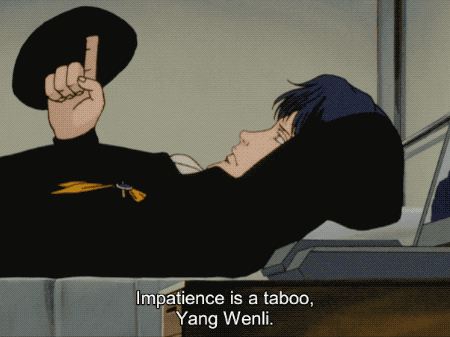
#Legend of Galactic Heroes#Legend of the Galactic Heroes#hiatus#if only we could do nothing with our lives except write about gay anime for free...#that'd be cool#impatience#we'll be back soon!
35 notes
·
View notes
Text
Episode 35: Determination and Ambition

May-June 798/489. The aftereffects of Muller and Kempf’s dramatic (and romantic!) defeat at Iserlohn ripple through the Empire’s military: Reuental and Mittermeyer take swift revenge for Kempf against some of the Alliance’s forces, though they strategically retreat before Yang can join the fray; an infuriated Reinhard is convinced to show the battle-weary Muller more mercy than he otherwise would have by, er, the better angels of his nature; and Hilda, concerned about Reinhard’s vulnerability to Oberstein’s sinister calculations, hatches a plan. Over in the Alliance, Julian asks for and, finally, receives Yang’s (reluctant) permission to formally enlist as a soldier. Meanwhile, Hilda’s cousin is rude to a nurse, Mecklinger does emotional labor, and Reuental and Mittermeyer stay in for a turbulent date.
Hilda and... Yang? (And Narrative Lenses)
In Rebecca’s episode 34 post, she introduced us to one of the ways in which LoGH manages to stay grounded despite the fantastical trappings of its sci-fi genre: Yang’s role as a relatively unclouded narrative lens. Because he identifies with the academic remove of a historian, and because his predictions and opinions are constantly being proven right, Yang’s perspective is one through which the audience can expect to see LoGH’s politics and philosophy with (comparative) clarity.
But Yang’s impartial-ish point of view can only see so far. More specifically it can see exactly as far as 1.) Alliance stuff and 2.) zoomed out big picture politics/war stuff. The inner workings of the Empire are, alas, beyond Yang’s reach in this respect. And as Reinhard continues to wobble precariously between “grieving” and “completely out of touch with reality, why oh why aren’t there therapists in space,” the need for an Empire-side voice of reason has only increased.
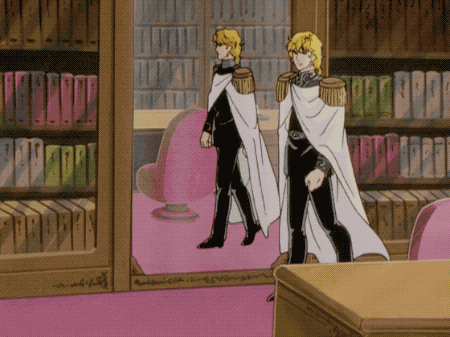
I’m glad someone is telling Reinhard to take better care of Muller, but all things considered it would probably be preferable if that advice-giver were a real person and not... Reinhard’s extra-handsome hallucination of Kircheis.
Luckily, Reinhard and the gang have by now been joined in an official capacity by Hilda, whose keen eye, calm rationality, and pseudo-outsider status go a long way toward keeping things in perspective even while Yang is busy dancing with beautiful girls on the other side of the galaxy.

Or huddled up under a blanket convalescing while Julian nurses him back to health using medically dubious means. Either way.
Hilda and Yang have very little in common personality-wise, but their narrative roles (within the parameters of this discussion) are near perfect mirror images. Hilda, like Yang, maintains a slight intellectual detachment from the history-altering events going on around her:

Hilda’s emotional distance, usually a welcome respite from Reinhard’s myopia, does occasionally veer into disturbing territory, such as in this brief scene from episode 26. She couldn’t have known that what she was calling “an age of excitement” was the chaos resulting from Kircheis’s death, but her timing is still a bit of a gut punch. Yeesh.
Both Hilda and Yang also have unusually brilliant minds that set them apart even from the Best And Brightest who habitually surround them. But where Yang’s reluctance, discomfort, and skepticism are what cement his status as an outsider—even as his power within the Alliance continues to grow—Hilda’s drive, persistence, and unabashed enthusiasm are what secure for her a position that is by its very nature that of an outsider: the only woman on Reinhard’s staff.
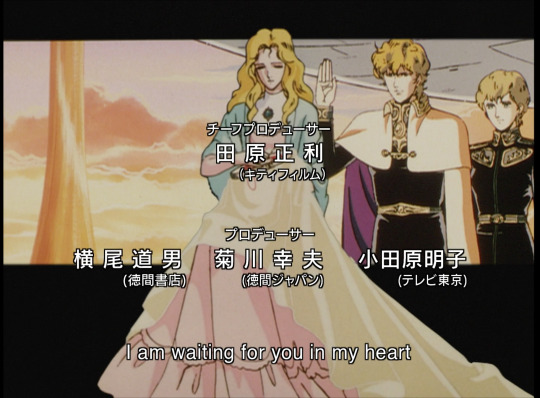
Which is a real shame because look how freaking cute she is in uniform! Maybe someday Hilda will have the power or influence to admit women into the military, and then any girl who so desires can look extremely cute in Imperial garb. And kill millions of people legally.
Actually, as Reinhard’s personal secretary, Hilda is one of the only women (or the only woman?) in the entire Empire with anything resembling an official post, in politics or the military. As such, she’s also the only character we’ve spent any time with who reached her position via non-traditional means; rather than attending military school or serving as a rank-and-file soldier before rising in the ranks, she elbowed her way in with raw chutzpah (and talent, lots of talent).
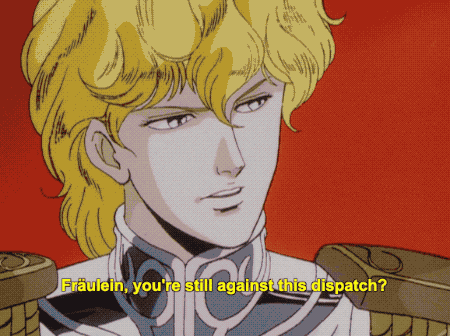
No but seriously, don’t underestimate the role that Hilda’s charismatic fearlessness has played in her meteoric rise to Reinhard’s right hand! Reinhard has, ever since they first met, very obviously enjoyed that Hilda doesn’t pull punches—or at least will cheekily let him know when she’s about to pull a punch.
(From episode 30.)
Hilda’s non-traditional path extends beyond her literal in-universe career trajectory: On a metanarrative level, her point of view is just as novel to the viewer as it is to Reinhard; for both the audience and the Empire, Hilda came out of left field with a perspective unlike that of any of her new colleagues. Hilda is at once an integral part of the Imperial military and the least weighed-down-with-baggage among its ranks—the importance and extent of which will only become clearer as the show progresses. This perfectly positions her to be among the most reliable narrators the Empire has to offer, but to be the true Yang of the Empire (work with me here), there’s another crucial job qualification Hilda must fulfill:
A Case Study in Being Right
Okay so we’ve established that Hilda has enough distance to be a clear narrative lens, but is she always (or usually) right?
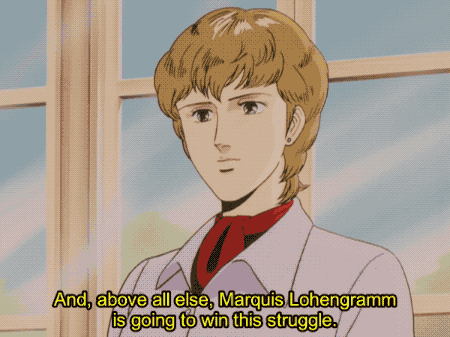
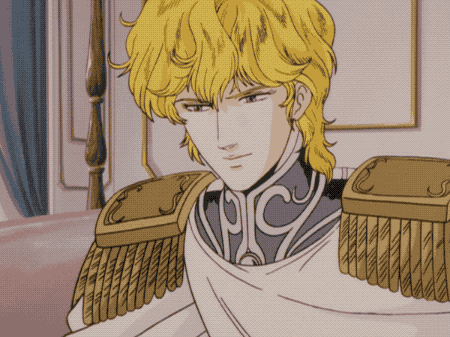
The short answer is yes, yes she is (above gifs from episode 18). The longer answer is yes, and not just about military and political machinations either. In fact, it’s Hilda’s extraordinary emotional intelligence that marks her as one of the Empire’s most useful characters, narratively speaking. For a perfect illustration of this, we need look no further than episode 35. How convenient!
First, let’s return to some battle stuff for a second. Mueller and Kempf’s defeat at Iserlohn wasn’t just a loss; it was a catastrophic loss. And upon learning exactly how catastrophic—Kempf lost 90% of the vessels in his command, to be precise—Reinhard, predictably, loses his shit:

A useful gif for all you tantrum-throwers out there.
Soon after, however, when Muller appears before Reinhard to apologize in person for his failings, Reinhard’s response (unpredictably this time) isn’t one of rage or even disapproval:

Look I know Reinhard is going through shit right now, but... wouldn’t Muller be so perfect for him? Eventually. After he’s healed at least the tiniest bit. Maybe Muller could help him heal! Ahem. Anyway.
Muller isn’t the only one surprised by Reinhard’s uncharacteristically light hand. Oberstein, in particular, suspects Hilda’s influence, a theory she quickly debunks:

Could Oberstein be more transparent about his sinister intentions? Stop smiling like that, jeez.
Hilda’s guess that it was actually some version of Kircheis that convinced Reinhard to be lenient, on the other hand, is correct. We know that already, because we saw it happen earlier on in the episode:

Reinhard’s handsome Kircheis hallucination obviously ships him with Muller. Understandable.
But how did Hilda know? Well, because she has a high level of emotional intelligence, and also because she’s been paying very close attention (gifs from episode 30):


This is a subtle, elegant trick of characterization and storytelling. We’ve seen Hilda study the people around her—and Reinhard in particular—so we know she’s an exceptionally observant and emotionally attuned person. This allows her to make educated, often scarily accurate guesses about the emotional inner lives of other characters without the audience needing to suspend disbelief. Hilda can operate at a level of omniscience somewhere between those of ordinary characters and the show’s narrator—who, of course, is another can of worms—without losing even an iota of her humanity.
Oh, and one more thing: Oberstein, too, has a Yang-like history of being basically right about things—often in the most distasteful way possible, but right nonetheless. So it’s no coincidence that Oberstein is the character whose emotional cluelessness prompts Hilda to present her theory about Kircheis’s continuing influence over Reinhard.

No, Oberstein, she isn’t “romantic,” you just guessed wrong. Show some humility for fuck’s sake.
Hilda and Oberstein may have similar rates of success when it comes to predicting political takeovers and battle outcomes, but when it comes to matters of the heart, Hilda wins in a landslide. And the message LoGH sends with the above scene isn’t that emotional intelligence is equal to cold rationality—it’s that it actually allows for a more accurate view of the world. Hilda, who possesses both emotional intelligence and rationality, simply sees things more clearly than other characters. This will come in handy.
Reuental and Mittermeyer

I hope Reuental and Mittermeyer were grandfathered in for unlimited data plans.
Until now, our discussions of Reuental and Mittermeyer have focused mainly on the ways in which they’re perfectly, almost weirdly in-sync. But the Twin Stars aren’t just duplicates of one another, and in my five minutes of episode 28 post, I introduced one of their central points of divergence: Reuental has no desire to fit into normative society, while Mittermeyer has every desire not to deviate from society’s normative expectations of him. Episode 35 gives us one of our first glimpses into how these different approaches to life bring tension into what is, usually, a strikingly harmonious relationship.
It starts, as always, with Reuental and Mittermeyer drinking together and gossiping about Reinhard. This time, though, Reuental goes a step too far—for Mittermeyer’s sensibilities, that is:

Reuental’s basic concern—that Reinhard isn’t making his subordinates feel appropriately valued—is a pretty minor one in the grand scheme of things. But Mittermeyer takes issue less with the substance of Reuental’s criticism, and more with the fact that he’s criticizing Reinhard at all.
That this mild disagreement eventually grows into a For Real Argument hinges on two key factors: 1.) Reuental feels free not just to speak his mind (privately) on topics that are above his paygrade, but to have those thoughts in the first place; Mittermeyer neither feels free to do either of these things, nor seems to have any interest. And 2.) Reuental’s opinions are not set in stone; Mittermeyer seems confused by the idea that Reuental might have adjusted his stances on important issues based on new information gained in the months since Kircheis’s death.

This isn’t the first time Mittermeyer has told us that, generally speaking, he doesn’t expect people to change their minds. He said as much in this conversation from episode 25, though it was absolutely true about the subject at hand—Reinhard’s preferential treatment of Kircheis—so on its own it wasn’t worth mentioning. But now it is!
The content of Reuental’s “dissension” in episode 35 is not only relatively benign, but is basically in line with what Reinhard’s hallucination of Kircheis advised: Treat your living admirals better. But Reuental’s expression of this sentiment also means that the potential exists for him to feel less than good about being loyal to Reinhard—if Reinhard becomes someone whose methods Reuental doesn’t respect. Again, not a huge deal on its face.

Mittermeyer’s stricken expression here is not in response to Reuental actually being disloyal to Reinhard, but to him suggesting that there could even theoretically be some point in the future when he might regret his past loyalty. That’s... very removed from actual disloyalty. Calm down, Mittermeyer.
Mittermeyer is deeply uncomfortable with uncertainty. His worldview—influenced as it was by his father’s devotion to societal strictures—doesn’t allow for flexibility; his loyalty to Reinhard, and by extension Reuental’s loyalty to Reinhard, must be unconditional or it’s not loyalty at all. Mittermeyer does not work in shades of grey. In fact, as Mittermeyer tells us directly, he thinks of himself as being most in his element when he’s avoiding having any original thoughts whatsoever:

It’s interesting that Reuental seems to value himself more highly than Mittermeyer does himself, despite the fact that Reuental’s parents literally told him, with both words and actions throughout his entire childhood, that he was worthless.
Mittermeyer’s relationship with the considerably more open-minded Reuental, then, is a contradiction. Because the aspects of Reuental’s personality that make Mittermeyer uncomfortable enough to leave the room mid-conversation don’t seem to have any effect on his overarching desire to be... whatever he is to Reuental. Close. That in itself makes Mittermeyer far less rigid than he thinks he is, or than he wants to think he is anyway. Reuental, yet again, represents a departure from the prescribed path that Mittermeyer is always trying to stick to.
And as for Reuental, we don’t have to take his word for it when he says, above, “I went and did it again”; we’ve already seen him apologize to Mittermeyer for saying too much under the influence of alcohol:

And nor is episode 35 the first time we’ve seen Mittermeyer pretend he didn’t hear something Reuental told him while he was drunk!
(From episode 28.)
Given the number of years between the two above incidents (five years, to be precise), it’s probably safe for us to assume that there have been countless other similar arguments over the course of Reuental and Mittermeyer’s relationship. But they’re still checking in after battles and drinking together every night; whatever their incompatibilities may be on the surface, there’s something more that keeps them both coming back.
Stray Tidbits
You just keep doing you, Phezzan.

If you can tear yourself away from watching how beautifully these two drink-swirling animations sync up, I will be very impressed. I couldn’t do it; I’ve been sitting here for weeks now.


Everyone loves gifs of Reinhard hurling insults, right? Have one on the house!

#Legend of Galactic Heroes#Legend of the Galactic Heroes#author: Elizabeth#Empire#Reinhard#Hilda#Handsome Ghost Kircheis#Yang#Reuental#Mittermeyer#narrative lenses#Reuental deserves better#oskar meyer#Reinhard/Muller#a girl can dream
37 notes
·
View notes
Text
Episode 34: Return
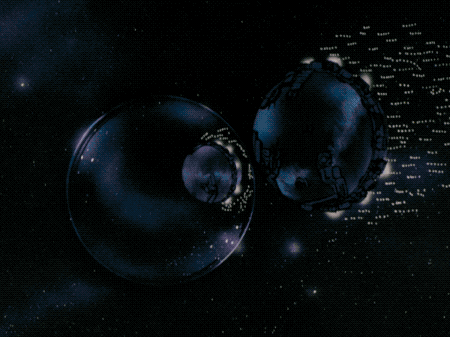
April 798/489. The completely unintentional mind games of the Alliance fleet continue to fuck with the Imperial commanders, as Kempf refuses to believe Yang could actually not be on Iserlohn despite the confession of a dying prisoner. Muller’s not convinced, but being ever the dutiful second-in-command, swallows his misgivings and goes along with the plan to lure the Iserlohn force out and then turn and run them back into the fortress. After Julian patiently explains this plan to all the admirals over twice his age, Merkatz points out that instead of retreating back into the fortress, they could...pretend to retreat but then reemerge, trapping the Imperial fleet between Iserlohn and Yang’s reinforcements. In desperation, Kempf finally thinks of just smashing the fortresses into each other; but it turns out that while giant fortresses are hard to destroy, engines are not, and Yang knocks Geiersberg off its trajectory and into the rest of the Imperial fleet. Oof. Meanwhile Yang learns a valuable lesson about sitting on top of desks during battles (or does he?), and Reinhard and Oberstein discuss moral philosophy.
Yang and War

“All I can say is, Yang is not an ordinary soldier. How to put it… He has the brain of an excellent soldier, but not the soul, you could say. Yang wanted to become a historian. Since I started living with Yang I’ve probably been told that over a hundred times. It must be rare for someone who only became a soldier begrudgingly to become an admiral in their twenties. I guess the things you like and the things you’re good at are different?
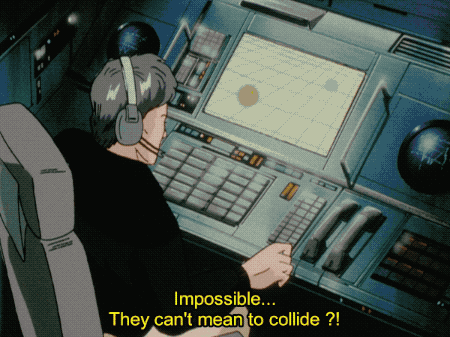
But I don’t think Yang hates constructing tactics at all. Maybe it’s that he doesn’t like that he’s made that his occupation? With that thought, I once tried asking him about it. ‘You got it half right,’ was the answer. He didn’t explain more than that. Possibly, could it be that for having a passion for tactics, he hates himself? I had that thought too, but I’ve failed to ask him about it yet.”
—Julian’s Iserlohn Diary, p. 30
Yang has the brain of a soldier, but not the soul. This tension has been woven into Yang’s story since we first met him in “My Conquest”—at that time, it took the form of conflict between his lack of ambition or desire for power, and the fact that he knew that his tactical insights could save lives if he had the authority to act on them.

...Sorry what was I saying? Something about war? I'm too distracted now by how beautiful "My Conquest" Yang is...
(From “My Conquest is the Sea of Stars.”)
He has that authority now, and the burden of guilt that he carries takes on a different form: He has both the skill and the power to decide the outcome of this battle between Geiersberg and Iserlohn, but not the power to stop it from happening or even to stop it from being utterly devastating for one side or the other.

The “fifth option” is for the Imperial commanders to realize that this won’t end well for them and just leave. The other admirals awkwardly take this as a joke, but we—along with Frederica—are privy to Yang’s wistful, grim gaze that he doesn’t show them.

During “My Conquest” he felt the weight of deaths on the Alliance side that he saw coming but couldn’t prevent; now he feels the weight of Imperial deaths that his decisions are directly responsible for.
Julian’s observations in his diary suggest an angle to Yang’s internal conflict other than just hating war but feeling obligated to stay in the military: It’s not only that he’s good at military theory—he is, in some intellectual sense, drawn to it.
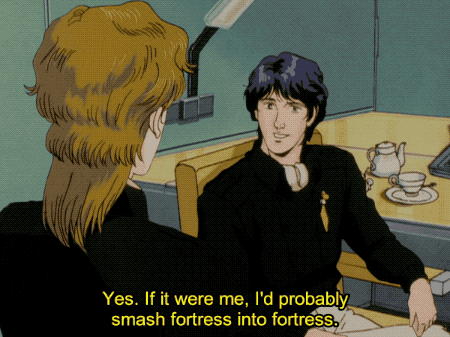
Yes yes, I already showed this gif, but it’s adorable enough to see again. Anyway, Yang’s affect when he’s discussing how Kempf would have been able to win this battle if he’d just smashed the fortresses together in the beginning is casual and even excited—a stark contrast to the heaviness of his emotions when Geiersberg is actually destroyed.
...And Narrative Lenses
As with everything in LoGH, there are multiple layers to this storytelling. Yang’s pain and regret throughout the episode highlight his own hatred of the war and of himself for his role in it; and at the same time, as he has since the beginning, Yang serves as a lens through which the show focuses our attention on the horrors of this battle.
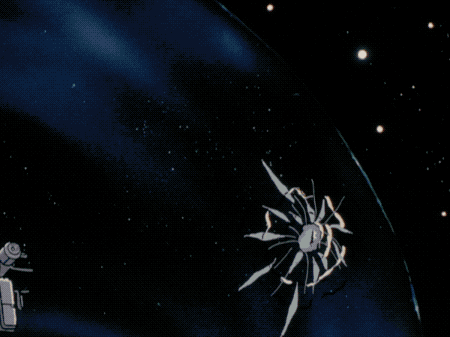
In a truly chilling sequence, the camera jumps back and forth between the violent deaths of soldiers within Geiersberg and the jubilant reactions of Alliance soldiers. It’s Yang’s gaze that contrasts with the joy of the rest of the Alliance and sees the tragedy of this destruction most clearly. Frederica’s gaze is directed at Yang, which is in character but also positions her in this moment as kind of an audience proxy.
Legend of Galactic Heroes is an anti-war epic. That’s been obvious ever since “My Conquest,” and one of the reasons it’s been obvious is that Yang repeatedly tells us so directly.

(From episode 7.)

(From episode 17.)
Yang isn’t perfect or infallible—he struggles with both his aversion to power and how bad he is at turning people down. We see his decisions questioned from both sides by other sympathetic characters like Jessica and Schenkopp. But LoGH is a history, and Yang is a historian; just as he sees the shape of battles more clearly than other people, he sees the shape of history and society with a vision less clouded by personal ambitions or loyalties than most other characters.

The rest of the Alliance forces celebrate their victory—reasonable, since they’ve spent several weeks scared of losing, and are relieved to be safe. The fact that Yang saw the tactical situation clearly enough to feel confident he could win is part of why he’s able to have a bigger-picture reaction to Geiersberg’s fall. Notice that Hortence is the one other person who watches the destruction with the same grim expression as Yang… hmm. Have I mentioned I love her?
Yang’s clarity and objectivity of vision are established by his being repeatedly proven right about how battles play out; and because of that, he becomes a narrative tool that the show can use when it wants to explain something to us directly, point us toward a specific emotional reaction, or give weight to one side of an argument. This isn’t exactly subtle when he’s soapboxing about the harm of nationalistic rhetoric, or lecturing Julian about the role of the military. But the technique extends to other contexts.

For example, if I had to bet on it, I’d say Yoshiki Tanaka is not a huge coffee drinker…
(From episode 17.)
In episode 29, when Cazellnu asserts that the greatest duty of human life is to marry and reproduce, there’s a reason that we don’t take that to reflect the editorial stance of the show. Yang loses almost every exchange of that debate rhetorically, and his discomfort with the topic tells us something important about his character; but we’re accustomed to Yang’s perspective aligning with the philosophy underlying the story, and so his visibly angry reaction to Cazellnu’s opinions hints at how we are intended to view those ideas.
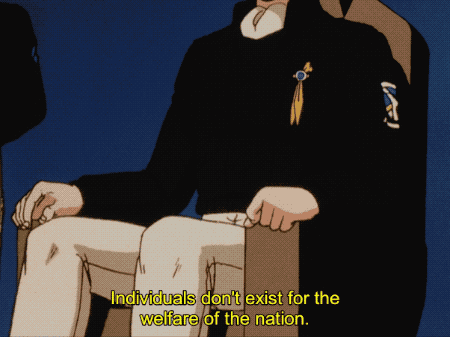
The fact that Yang gives a more general version of the thesis that individuals are not beholden to the structures of society when arguing with the even-more-clearly-evil-than-Cazellnu Inquiry committee also helps reinforce his perspective.
(From episode 31.)
Since in many ways the show is about the lenses we impose on narratives and on other people, it’s especially crucial to pay attention to how each character’s perspective is shaped, and how that corresponds to—or diverges from—reality.
...And Julian

What exactly did Yang hire all of these other losers for if he’s sitting out in his spaceship thinking “our only hope is if Julian remembers what I’ve taught him...or possibly the guy in exile from the Empire”? No wonder the Alliance is losing this war.
In the continuing saga of Yang projecting his own mixed feelings about war onto Julian, the same tension between the abstract study of tactics and the realities of warfare that Yang feels in his own life shows up here: Yang’s eagerness to teach Julian tactical theory is at odds with his desire for Julian not to actually have to kill people or be killed himself.
Of course, if Yang’s wondering whether Julian paid rapt attention to every word he’s ever said...he did. And Julian shares none of Yang’s qualms about his own budding potential as a tactician.

Man, it’s a good thing Schenkopp thought to ask the kid bringing them all coffee, or they’d never have figured out the Empire’s plan…
Yang’s whole trip to Heinessen has been an extended version of the separation and reunion cycle from episode 27, and culminates in a scene very similar to the one in that episode.

Merkatz: “Open comms with the Leda II.”
Julian: “Ooh wait wait, lemme hide over here and you introduce me!”
Merkatz: “.....”
Julian: “Aww c’mon, Dusty let me.”
Yeah that’s right, I see you Julian.
All of Yang’s deeply conflicted emotions about Julian’s relationship to the military—and how it reflects his own—are packed into that smile. Yang’s own love of tactical theory and desire to share it led directly to Julian standing there on the flagship, another step closer to the military career that Yang has insistently claimed not to want for him. That must be painful; and yet, just like when Julian took down three planes and a ship in his first battle, he can’t keep his admiration from showing through.

Interestingly, the structure of this exchange is exactly the same as Yang’s reunion with Frederica in episode 32: Yang initially credits someone else (older, higher ranked) only to have that deflected and credit given to one of his uh, acolytes (?) instead. (Exactly the same other than Julian’s dramatic entrance theatrics, that is.)
(From episode 32.)
...And Tea
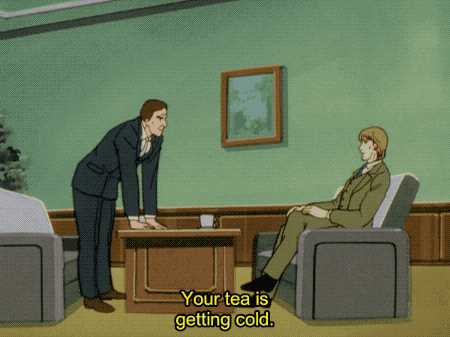
Narrator: It’s about tea.
There will be plenty of time for Tea Discourse in the future, but for now I just want to point out a tiny moment that’s incredibly easy to miss.
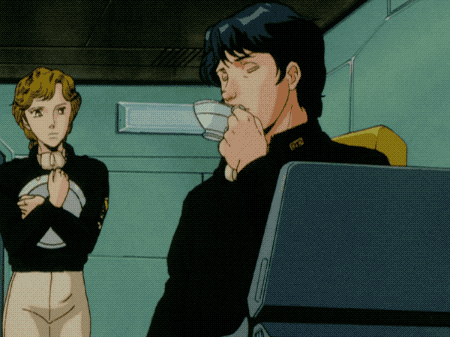
Bleh.
This moment is hilarious and cute, but in the whole context of Yang’s life it’s also meaningful. After all, drinking good tea is literally the thing that popped into Yang’s head to symbolize the purpose of being alive.

Incidentally, this is another example of a scene that both deepens Yang’s character and uses him to call out the emptiness of the typical rhetoric used to justify the continuation of the war.
(From episode 6.)
His fleeting frown as he takes a sip of the tea Frederica brought him reminds us that, while this whole Inquiry adventure has definitely increased his affection for her, and while he’s way more comfortable philosophizing at her than he was back in season one, well...she doesn’t make good tea.

Watching Yang sip the tea she brought him reminds her of their first meeting on El Facil—at which, of course, she accidentally gave him coffee. He’s definitely not sipping coffee with that contented expression, so either this snippet of memory didn’t happen quite as she’s remembering, or it’s from a part of their encounter on El Facil that we haven’t seen before.
There’s a slight tension here between Yang’s actual reaction to the tea and Frederica’s nostalgic romanticizing while watching him drink it. It’s quick and subtle and not emphasized at all—but it’s there, which means it’s worth asking why it’s there; and given how deep and pervasive Yang’s relationship to tea is, the tension hidden in this scene carries extra weight.

Conspiracy theory: Was Yang actually knocked over here, or did he just use the impact as an excuse to toss that tea away? *thinking emoji*
Reuental and Mittermeyer

Oooh what’s this, is it finally my turn to gush about the ridiculously synced body language of Reuental and Mittermeyer?? No one tell Elizabeth I’m stealing her thunder here, but I really love this scene; it’s one of the most elegant examples so far of how their connection and dynamic are conveyed through tiny details of the choreography.
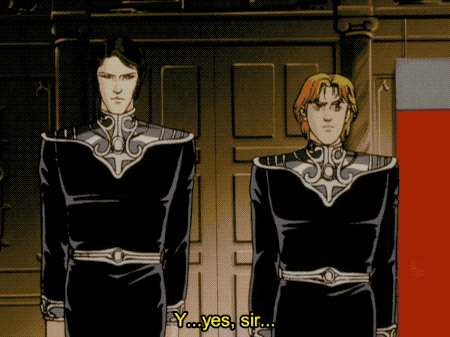
Did you catch what happens here? Go watch the scene with sound (4:01)—did you catch it now? Yup, Reuental seamlessly finishes Mittermeyer’s sentence, their thoughts apparently conveyed to each other in full during that brief glance.

It’s reminiscent of this moment from episode 20, where the cinematography seems to turn Mittermeyer into Reuental between shots. In both of these scenes the two of them function—in one case with speech and the other with movement—as though they’re one person.
(From episode 20.)

Similar to Poplan and Konev, Reuental and Mittmeyer are defined as a unit against other characters, but when we zoom in on just the two of them the differences in their personalities come through. Here Reuental is interested in analyzing what could be behind Reinhard’s decision to order them to battle, while Mittermeyer is more focused on their duty to carry out the order.
Stray Tidbits
Meanwhile on Odin, Reinhard and Oberstein have been having some uhh, rather loaded conversations concerning the question of moral responsibility for the actions of subordinates you decided to hire….
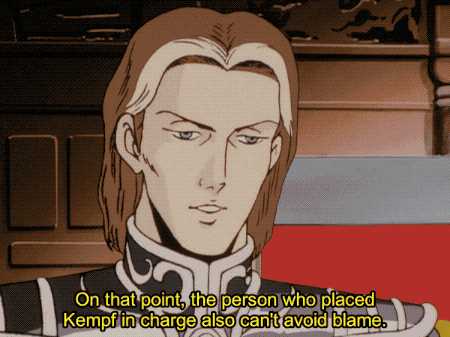
God damn, the ice in Reinhard’s eyes. Oberstein...stfu.
Fun fact: The scene during the closing credits in which Muller vows to avenge Kempf by killing Yang and then addresses his fleet is cited by Muller’s voice actor, Yu Mizushima, as his most memorable scene.

“Muller’s usually calm and reserved, but I think his charm is in the way his hidden passion explodes at key moments, his unwavering loyalty to Reinhard, and the stubborn persistence in difficult situations that earned him the nickname Iron Shield Muller. Rather than getting stuck in a mindset of ‘because I’m a soldier,’ I tried to play him with a focus on ‘because I’m a person.’

He didn’t want the soldiers to see how injured he was and feel anxious. It was heartrending.”
—Yu Mizushima, interview in LoGH: Complete Guide
And thus concludes the arc that forms the basis for the most romantic, beautiful, tragic fanfic I have ever read—the brief romance between Geiersberg and Iserlohn. “O Iserlohn!” by AnnetCat, seriously go read it right this second; it takes like four minutes to read and will 100% make you cry and also make you furious with Yang. God dammit Yang and your clever tactics, just let them touch….
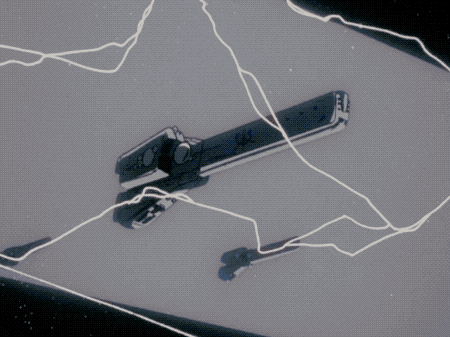
“My armor is not as beautiful as yours. It is just a hard material, riveted tightly, and in order to absorb the ship, I must open the gate in front of him. I knew that this might not please you if you saw me; especially I was shy of rivets, these pimples on my body, and all sorts of gates and hatches, these wrinkles on my face. I can not remove them, and there's nothing to be done. But we could not meet, and I forgot about the flaws in my appearance, imagining how you would touch me. Dreaming about the impossible is so simple and so pleasant. And suddenly it turned out that my dreams are realizable.”
(Translation courtesy of Google Translate.)
#Legend of Galactic Heroes#Legend of the Galactic Heroes#author: Rebecca#Alliance#Yang#tea#war#narrative lenses#Reuental and Mittermeyer#Julian#Geiersberg#Iserlohn&Geiersberg4ever#seriously Yang you jerk
21 notes
·
View notes
Text
Episode 33: Fortress vs. Fortress

Love Triangles

“Yang told me not to write the real names even in my diary, so I’ll use pseudonyms, but non-commissioned officer A and non-commissioned officer B had been fighting forever over the civilian Miss C, and that fight was revived on Iserlohn, but Miss C, who hated Officer B, impulsively shot him to death.”
—Julian’s Iserlohn Diary, p. 61-62
(From episode 30.)
Honestly, the love triangle between Officer A, Officer B, and Miss C that Julian describes in his diary sounds like one of the more straightforward and classic love triangles in the LoGH world. LoGH love triangles, as we’ve discussed, tend to be rather twisted, tragic, or otherwise subversive. These triangles don’t present an either/or choice between two romantic rivals standing on equal ground, where the choice hinges on the interior romantic feelings of the character at the vertex; rather, most love triangles in LoGH are narrative tools to highlight the ways social structures shape our choices for us, or to add depth to characterizations by showing the ways that people approach these choices differently.
On the Alliance side, the love triangle of season one was between Yang, Lapp, and Jessica, with Jessica at the vertex. And the way it played out set up open questions about Yang’s wistful passivity and reluctance to pursue a romantic relationship with Jessica both back in college and now, despite her professed interest. Many factors were at play in that dynamic: Yang may have believed that Jessica was more interested in Lapp, or been reluctant to compete with his friend; and in the present day, tensions over their past, Lapp’s death, and the war complicated any possible relationship between them. But as Jessica tells it in episode 10, she was disappointed that he didn’t continue to express interest after that first awkward dance; and despite that confession and an almost-kiss, Yang’s reluctance remained a constant, as he made no further move to pursue her.
In season two, Yang is involved in another love triangle of sorts, and this time he is at the vertex.

The line in Japanese is Teitoku wa itsu ni nattara hakkiri saserun darou? which translates literally as “when will the admiral make it clear?” The official subs translate it as “when will the admiral just tell her?” which is misleading: It implies Julian has a belief that Yang reciprocates Frederica’s feelings, but both before and after this Julian professes not to know Yang’s feelings.
This triangle between Yang, Frederica, and Julian currently exists only inside Julian’s head. But for Julian at this point in his life it is very real and looms very large—dominating his thoughts, as we see in the moment above, even as he rushes into battle against a giant fortress that just warped into the corridor and attacked them. And since it’s foundational to the emotional arc of the whole rest of the show, it’s worth taking time to examine in painstaking detail exactly how it’s set up early in this season.
The Julian/Yang/Frederica Triangle

(From episode 24.)
The last time I talked about Julian’s feelings for Yang I speculated that, despite seeming to have all the major symptoms of a crush, he probably didn’t frame it to himself that way (although we had no way to know for sure). But that was almost a year ago—in story time, that is—and a year is a long time when you’re fifteen-going-on-sixteen. And uh, I’m gonna go out on a limb and say that he’s figured some stuff out.
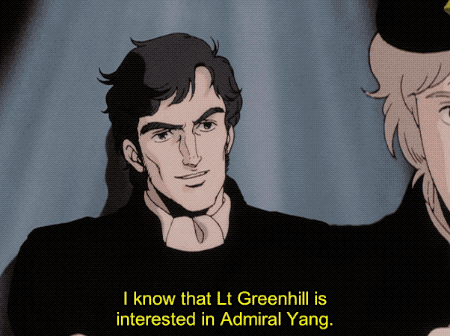
Have I fangirled about Nozomu Sasaki’s voice acting yet? Well it’s about time I did—the subtitles can’t do this exchange justice, so please go watch it (12:17) right now to appreciate the soft edge behind his “saa” here. Damn.
(From episode 30.)
This is one of those times when I’m not sure what my job here is supposed to be: Schenkopp asks whether Yang is interested in Frederica and Julian’s reaction is to say “how should I know” then lower his eyebrows angrily and shoot the target directly in the heart. Tell us how you really feel, Julian.
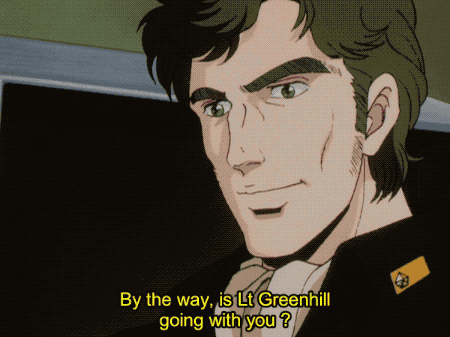
Ding ding ding, yes, how he really feels is jealous. Well done Schenkopp. This is the line right before we jump to Schenkopp interrogating Julian on the shooting range, and already here a triangle of some sort is suggested, with Julian and Frederica paralleled to each other as rivals for Yang’s attention. So how is Yang processing this line? How is Cazellnu? We’ll come back to both of those questions in the future!
(From episode 30.)
In episode 33 we get another peek inside Julian’s mind, as checking in on the Cazellnu ladies prompts him to recall a recent conversation with Yang.
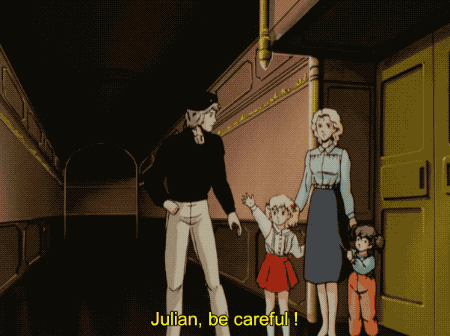
Have I mentioned Cazellnu has issues? Seriously dude, pressuring your 30-year-old friend about his love life is one thing; telling a teenager you intend for him to marry your eight-year-old daughter someday is a whole ’nother level. Leave Charlotte and Julian alone dammit.
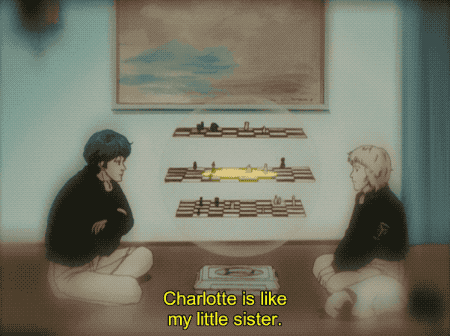
Yang is totally oblivious here to how his “eh she might seem like a little kid to you now but things change” take might interact with Julian’s own complicated emotions...

...and it makes sense to me that Julian immediately fires back by probing Yang’s feelings for the only obvious potential romantic partner currently in his life.
Julian’s emotional life revolves entirely around Yang. That’s been true since we first met him, and when he was fourteen or fifteen it manifested as relatively uncomplicated hero worship/puppy love, a desire both to be as much like Yang as possible and to do as much as possible to look after him and be useful to him. But that dynamic isn’t sustainable as Julian grows up. And what these two scenes tell us is that a thread of tension now runs through Julian’s emotions, specifically about the development of Yang’s love life. Everything about the narrative framing in these scenes sets up a classic love triangle: Schenkopp’s insinuations about Julian being jealous of Frederica segueing directly into Julian acting angsty about not knowing whether Yang reciprocates Frederica’s feelings; Julian’s thoughts jumping from remembering Cazellnu’s matchmaking schemes between him and Charlotte to solemnly wondering when Yang will make his feelings about Frederica more clear.
...But this is LoGH. And zooming out from the narrative framing to the broader context, to say this particular triangle is “not that simple” would be a drastic understatement. Julian and Frederica are not on equal ground here; while Frederica seems perfectly constructed as a potential romantic partner for Yang, every possible situational variable is aligned against Julian. When Julian thinks about Yang “making things clear” or “making up his mind,” the two options on the table are “yes Frederica” or “no Frederica.” Julian simply isn’t an option. Heteronormativity is one factor in that, sure, but not the most important one—the age difference and power dynamic mean not only that Julian is a socially unacceptable love interest for Yang, but that in fact any expression of romantic interest from Yang’s end would be deeply, deeply inappropriate. And Julian must know that. However…

Is it too disturbing to say that what this line reminds me most of is a dog marking its territory? Anyway, it’s the addition of “favorite” that really gives it that possessive feel; he could have just said he has to go make Yang dinner, but instead he feels the need to emphasize that he is the one who knows how to cook food just the way Yang likes it.
(From episode 30.)
Frederica isn’t a threat to Julian’s role as Yang’s intellectual disciple, or to his role as Yang’s physical protector. But she is a threat to his role as Yang’s caretaker and domestic partner, and it’s no coincidence that he ends the conversation with Schenkopp by emphasizing that position. Sure there’s nothing romantic about their relationship right now, but the status quo is still that Julian is the person closest to Yang, the person who lives with him and looks after him and cooks for him and spends cozy evenings beating him at 3D chess. The two sides of the triangle may be “Frederica” and “not Frederica,” but the closest Julian can hope to come to actually being chosen is for Yang to never choose anybody, for the status quo to just quietly continue.
On Surface Readings
A lot of the storytelling in LoGH has the feeling of a magic trick: It tells one story if you look at it through glasses that assume romantic attraction can only occur between men and women, and completely different stories if you remove that lens. The key to this trickery is that it’s simultaneously true that there exist non-queer interpretations of the things we see, and that if you tally the details of how the stories are actually told, those interpretations don’t quite add up. In the case of the Julian/Yang/Frederica dynamic, there are two different possible non-queer readings, and it’s worth taking the time up front to examine each of them and how they interact with what we’ve seen so far.
Reading #1: Frederica is the vertex. This is the magic trick illusion: If we attempt to interpret the situation starting from the assumption that between Yang and Frederica, Frederica is the only possible object of romantic interest for Julian, then the two scenes I analyzed above suddenly constitute evidence that Julian has a crush on Frederica. More specifically, they constitute the only evidence that Julian has a crush on Frederica.
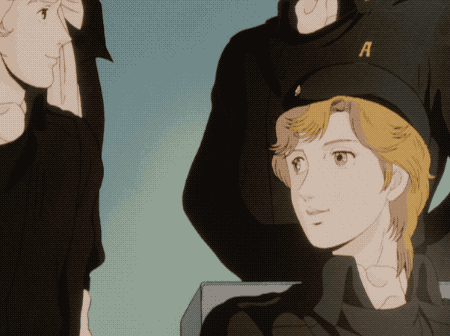
Yes this gif is super cute; no it’s not sufficient evidence of a crush.
(From episode 17.)
Julian is friends with Frederica and likes her. But never (until these two scenes) have we seen his emotions around her seem fraught; we’ve never seen him think about her when she’s not around, or stand in the background of scenes smiling at her. We’ve never even seen them have a conversation in which Julian didn’t bring up Yang.
As I pointed out above, several details about how the dynamic is framed in episodes 30 and 33 reinforce the fact that Yang is in the role of vertex: a) It takes serious mental gymnastics to see Schenkopp’s “Julian will be jealous if you take Frederica to Heinessen and not him” line as trying to imply that Julian has a thing for Frederica. b) In both scenes, Yang is the one whose feelings are unknown, the one who has a potential choice to make. And c) Julian’s none-too-subtle emphasis of the fact that it’s his job right now to cook for Yang makes it even clearer that it’s his role in Yang’s life that’s at issue.
The only reason to think that Frederica rather than Yang is the vertex is an assumption that Julian must be straight. And the only evidence that Julian has a crush on Frederica is the assumption that she must be the vertex of this triangle. This reading falls to pieces as soon as you remove those glasses.
Reading #2: It’s not romantic. This is much more interesting, because unlike Reading #1, it’s not just an illusion created by heteronormative assumptions. It’s a complexity inherent to the actual situation, and incredibly difficult to actually parse out the nuances of, both for us and for Julian.
The show doesn’t bother to give us a lot of details about Julian’s background in season one—we don’t even know at what age Julian went to live with Yang until the beginning of season two—and it’s easy as a viewer to classify Julian early on as “basically Yang’s kid” and therefore assume Julian sees it the same way. But that view bulldozes over a ton of complexity. Julian was raised by his father until he was eight, and went to live with Yang when he was twelve; Yang is his hero, teacher, mentor, role model, idol—all sorts of things, in addition to legal guardian, that create a major power differential between them. But never once does Julian refer to Yang as being like a parent to him as such—if we look at the source material, he’s consistent in referring to himself as Yang’s disciple (弟子) or orderly (従卒), and as I’ve pointed out before, this is reflected in the anime by the fact that his language and bearing around Yang, while affectionate, are more like a subordinate than like close family.
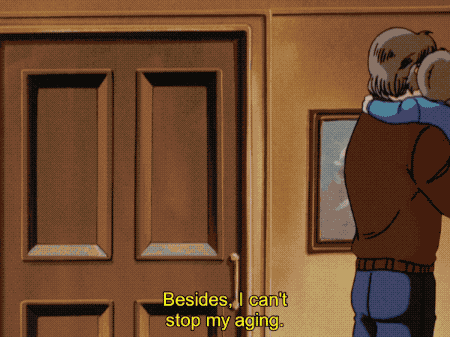
“So far I’ve only lived just shy of fifteen years. Exactly half of Yang’s age. In the next fifteen years, can I catch up to Yang’s pace? [...] ‘Don’t hold back and merely catch up, fly past him,’ Cazellnu said, and Schenkopp teased, ‘You’re running while he’s taking afternoon naps. Surely you’re gaining ground.’ Poplan laughed. [...] All three of them are watching me with interest and possibly some sympathy as I chase after my shifu (a good word, I learned it from Yang) from far behind.”
—Julian’s Iserlohn Diary, p. 136-137
(From episode 29.)
Yang, for his part, has never wanted to be a parent or felt comfortable in that role; and the only way he knows how to treat Julian is as some combination of student and housekeeper.

Okay I’m not actually trying to over-analyze Yang’s syntax here; honestly I’m just taking the opportunity to use this gif because it cracks me up.
(From episode 6.)
All of which is to say that in Julian’s eyes, Yang is an idol rather than a parent; and developing crushes on idols or mentors is so common as to be cliché. There’s nothing inorganic or unrealistic about the idea that Julian’s puppy love could develop into romantic attraction as he grows up. It would be complicated, awkward, painful, confusing, stressful, all sorts of difficult things for him—but none of that makes it unlikely to happen.
Good stories raise more questions than they answer; and the ambiguity and complexity of Julian’s feelings is one of the beautiful things about this story. Is it precisely accurate to call Julian’s feelings romantic? That’s not meant to have an easy answer—especially once you acknowledge that not all romance fits into neat normative boxes, especially once you recognize that romance isn’t synonymous with sex or lust, the lines become fuzzy and difficult to pin down.
But what’s unambiguous is that the question of whether Julian’s feelings are romantic is salient, both to the audience and to Julian himself.

I mean...come on.
The direct segue from Schenkopp commenting on Julian’s jealousy to asking about Yang’s romantic feelings; the paralleling of Yang and Frederica’s potential romance with Julian’s potential future romances; the visual of the target being shot directly in the heart. All of these details suggest that Julian is struggling with the question of how his place in Yang’s life relates to Yang’s love life and to his own. There’s no simple answer, and we’ll be continuing to look for details that give insight into how Julian himself perceives his emotions.

<3
Cazellnu
Meanwhile…
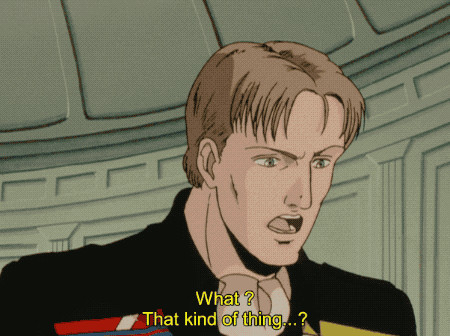
“If you think about it, Cazellnu has no deeds of arms at the front lines or anything. Just through desk work he became a rear admiral at 34, so he’s a real bureaucratic prodigy. [...] When he took university entrance exams, he also passed the exam for the business management program at Ale Heinessen University, but he got the date for the enrollment papers wrong and was left with no choice but the military academy; he says this was one of the major blunders of his lifetime. The other one, he says, is ‘something my wife can never know.’”
—Julian’s Iserlohn Diary, p. 110-111
Okay, so we’re focused on the anime here and technically Tanaka’s writing is not our Official Canon, but this backstory for Cazellnu somehow explains so much. When Yang left for Heinessen he failed to anticipate that Iserlohn would be attacked by an entire fortress (some “Magician” he is...), and left Cazellnu, Bureaucratic Prodigy in temporary command while he was away. Logical enough if the problems that are likely to arise are that somehow not enough toilet paper rations were delivered to block 74 that week; but it’s safe to say that Cazellnu finds himself a bit out of his depth when Geiersberg shows up.
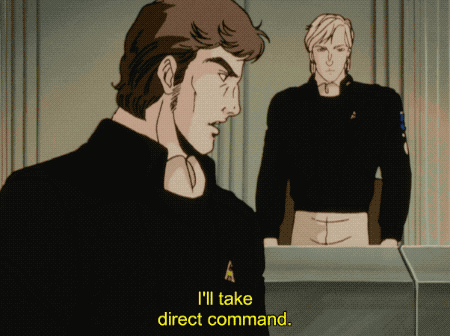
Schenkopp just straight-up disobeys Cazellnu’s order here, chain of command be damned—I like this little reminder that Schenkopp (and by extension the Rosen Ritter) has chosen to be loyal to Yang, but that doesn’t mean that he meekly accepts the authority of the Alliance forces in general.

The other admirals aren’t so brazen, but are also deeply frustrated with Cazellnu’s passive, let’s-just-try-to-stall-until-Yang-saves-us approach to the battle.

Mercifully, for Cazellnu and for the whole fortress, Merkatz has finally had enough of this. This is his extremely dignified and polite way of saying “listen kid, how about you step aside and let someone competent handle this.” Have I mentioned Merkatz is the best?
Poor Cazellnu didn’t ask for this and is really doing his best, and I almost feel bad for him…… but then I remember that he believes the ultimate purpose of human life is to pass on your genes to the next generation and that he ships his eight-year-old daughter with Julian, and I feel less bad.

Yeah that’s right Alex, you brought this on yourself. Shoulda gotten those business school papers in on time, eh?
Stray Tidbits
The liquid hydro-metal coatings of Iserlohn and Geiersberg are one of my two favorite inventions of the anime (the other, of course, being Julian’s cat). This battle is absolutely gorgeous, and I love the Empire’s tactic of using the gravitational pull between the fortresses to submerge the Thor Hammer and expose the back of Iserlohn to attack. Well done anime team, well done.

“In terms of sci-fi concepts, I like the anime-original fluid metal of Iserlohn fortress. Kato Naoyuki (mechanic concept design) didn’t want to just have ships entering and exiting the fortress through an opening, and we started talking about what if they sunk softly into a mercury-like substance, and so it was created. That creation led to the idea of, during the battle with Geiersberg, using the gravitational pull to attack the back side.”
—Producer Masatoshi Tahara, interiew in “LoGH: Complete Guide”
Aha, our first mention of Julian’s height, everyone take a shot! Okay, so tracking Julian’s height down to the half-centimeter (really) is more of a thing in the novels than the anime—in fact I think this is the only time we’re given a specific number in the show, although not the last time the topic arises. Anyway, I share Julian’s “where the fuck did that come from?” reaction here. Is this conversation a product of Yang musing about what Schenkopp said about Julian being jealous? A reasonable interpretation of Schenkopp’s line is that Julian is frustrated at being treated like a kid and left out of the fun grownup adventures. Yang may be obliquely trying to reassure him that he’ll get there soon.
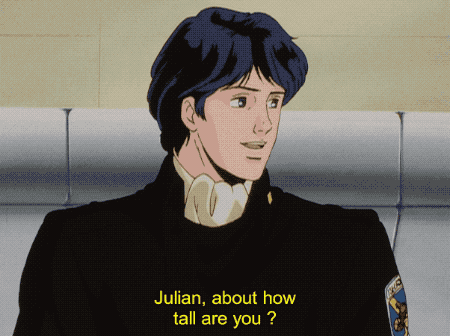
Or maybe that book he’s reading just mentioned something about height and the question was totally random? I honestly don’t know.

In any case, after his initial surprise Julian seems quite pleased that his progress toward adulthood is not going unnoticed. And hi Gensui, yes I see you with that adorable yawn in the background; don't worry, Iserlohn’s design is badass but you are for sure the cutest addition to the anime.
(Both from episode 30.)
I want to read the rest of this story dammit. Does Rose manage to drive the squirrel away?? This is the LoGH fanfiction the public demands.

Schenkopp, I used to respect you, but weak coffee? Have you no dignity at all?
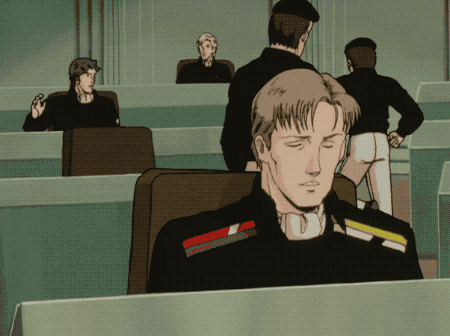
I don’t blame this random kid for seeming so horrified by the request.

Is it possible that all Alliance coffee is just too weak and that’s why Yang hates it so much?
(From episode 17.)
Julian, we can see you. Didn’t anyone teach you it’s rude to stare?

“Haha, my bad.”

Have I mentioned that I love Iserlohn? Damn it’s gorgeous.

#Legend of Galactic Heroes#Legend of the Galactic Heroes#author: Rebecca#Alliance#Julian#Yang#love triangles#surface readings#Iserlohn#Cazellnu#dammit Cazellnu#seriously though what is your deal#Merkatz#Julian's Iserlohn Diary
25 notes
·
View notes
Text
Episode 32: War Without Weapons
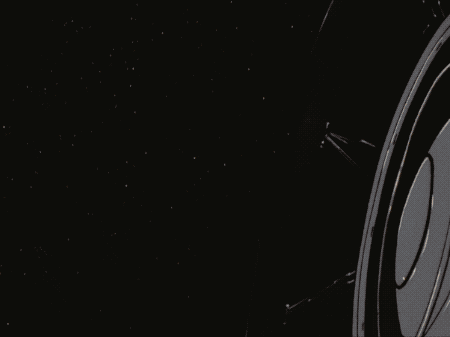
April 798/489. As Yang’s Inquiry drags on, Frederica and Bucock try to figure out whether there’s anything they can do to help him in the face of a paranoid, corrupt government and a press that’s in its pocket. The answer seems to be a pretty solid No, but fortunately for them a message arrives from Iserlohn announcing the Empire’s invasion of the corridor. Faced with the direct threat of invasion, the politicians quickly change their tune and “order” Yang back to Iserlohn to defend against the attack. Meanwhile, Poplan and Konev talk about Oberstein (?), Huang and Lebello go on a date, and Geiersberg fires on Iserlohn.
Power

When we last left Yang, he was angrily writing a letter of resignation, determined to finally go through with quitting the military and pursuing the life he originally wanted. We rejoin him a few days later, and find that having calmed down a bit from his tantrum, he is now biding his time, enduring the questioning out of curiosity for what the endgame of the whole farce might be.
But there’s a key feature of the above screenshot that shows exactly how the power balance in the room has shifted since the first day of the inquiry—see it? Peeking out to the left of the chair?

Yup, Yang’s legs are now emphatically, defiantly crossed. Although he was seething inside the first day of the inquiry, he nevertheless submitted to the chairman’s orders about exactly how to sit, playing along with the official hierarchy within the room. Not anymore.
It’s beautiful how much is communicated by this simple shift in posture. Yang may still be subjecting himself to their questions, but just through this difference in body language we know that he is now there on his own terms, because he has decided to wait and gain more information.
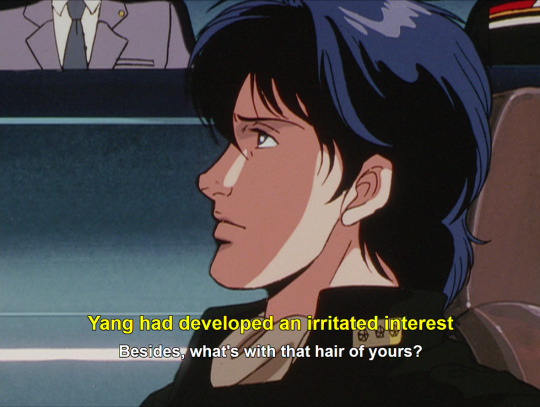
Add ‘prejudice against guys with longish hair’ to the list of societal injustices that LoGH bothers to comment on.

Maybe the hair thing was the last straw—or, okay, maybe it was all the rhetoric glorifying war as necessary for the moral character of society—but in any case Yang finally reaches his limit and launches into the dramatic resignation speech he’d been fantasizing about. Which brings us to what is probably the most hilariously awkward sequence in the entire show.

Seriously, this is worse than when Julian didn’t get to shoot those guys that one time…

Aww.
Yang’s catharsis is not to be, but when they return, the power dynamic has shifted yet again: Iserlohn is under attack, and suddenly that military strength that they’re afraid Yang might someday turn against them is necessary for their own defense.

I love the shift in Yang’s expression here. His face has been so hard this whole time, set jaw and lowered eyebrows, but his eyes soften in worry when he hears the news about Iserlohn.

The government has the power to order Yang back to Iserlohn, but Yang has the power to quit rather than comply. The decision here is still in Yang’s hands, but that look of concern that flashed when he heard about the attack makes it obvious that once again he can’t go through with resigning.

All of Negroponty’s language in this scene is an attempt to continue the superficial appearance of his authority, even while Yang is the one whose skills they suddenly feel dependent upon and who could, in theory, refuse to help them. Nice try dude.
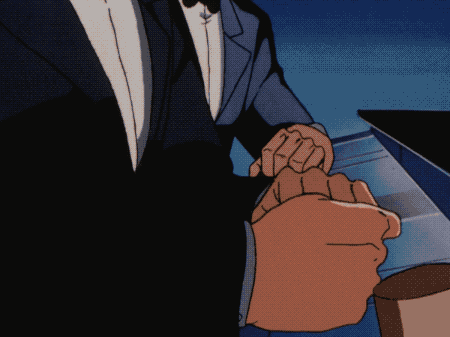
Inevitably Yang agrees to go back, but with language that emphasizes that this is a personal decision for him, not an act of simply following their orders.

I love this exchange—there’s so much packed into that “of course.” With that one phrase Negroponty is attempting to erase everything that’s happened over the past few days: Of course Yang is free to do as he wants, why wouldn’t he be, it’s not like they’d convene an Inquiry to put his every tactical decision under a microscope. That would be preposterous! This is linguistic gaslighting at its finest.
I’m gonna go ahead and say that this whole Inquiry thing was an utter fiasco for the politicians. Rather than shaming Yang and giving them cause to decrease his power, or whatever exactly they hoped for, they seem to have succeeded only in a) pissing Yang off; b) making it more likely that the Empire will successfully recapture Iserlohn; and c) giving Yang blackmail leverage over them. Way to go guys.
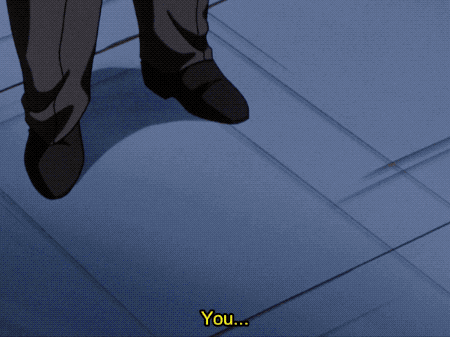
Pro tip: next time maybe just...ignore Phezzan?
Yang and Frederica

Hey now, she has a name, she’s not just tralior Greenhill’s daughter.
So far, what we’ve seen of Frederica’s role in Yang’s life has been largely about what she symbolizes: She’s a living breathing embodiment of the love letters he started getting after El Facil; she’s the concrete manifestation of Cazellnu’s insistence that he ought to be more interested in getting married. From the moment he first saw her Yang suspected that her presence in his life was deliberate matchmaking, by some combination of Cazellnu, Admiral Greenhill, and Frederica herself. Combine that pressure with the fact that she is his subordinate, and further throw in the passivity and apathy Yang has shown his whole life toward the prospect of romantic/sexual relationships, and, well...it’s a mess. It must be difficult for Yang himself to sort out his emotions about her, with the situation so deeply colored by various different external factors; it’s no wonder that he seems constantly awkward and guarded around her, and that we, like Julian and Schenkopp, are left puzzling over what is or isn’t going on in his head.

Yes this scene is amazing and yes I am going to talk about it SOON I promise!
(From episode 30.)
But in this episode, in his joy and relief at being free from the ordeal of the Inquiry, Yang does let his guard down a bit more than usual, leading to this rather adorable reunion scene.
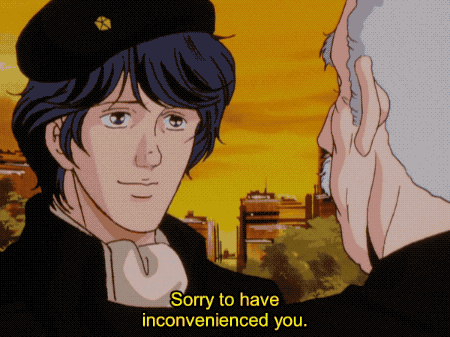
Frederica did all she realistically could, but I’ve always been a bit confused by this scene—had Yang not just been coincidentally released, would them showing up here have succeeded in stopping the inquiry? Wasn’t the point of Frederica’s struggle these past two episodes that the government and press are so corrupt by now that she is in fact powerless against them?

Of course Yang has no idea exactly what she did or didn’t do, only that she somehow found him, and he’s immediately flustered and at a loss for how to thank her.
We’ve cautioned several times about conflating any and all awkwardness with romantic attraction—LoGH routinely exploits that conflation to portray the struggles of queer characters in a way that also, if you blur your eyes, passes as actual straight romance.

Well spotted, Bucock.
But Yang isn’t just being awkward here; his wide eyes and warm smile convey real admiration and gratitude, and while he seems flustered and overwhelmed by those emotions, his affect is still very positive. The swelling music and sunset palette contribute to give a romantic aesthetic to the whole scene. Crucially, in this moment Frederica is not functioning mainly as a symbol or a narrative role in his life: She’s a real, specific person who just spent days persistently trying to save him. He’s reacting to her here more as an individual, not a personification of abstract love letters but a person who sincerely cares about him.
If she represents anything, it’s the feeling of belonging and emotional connection that he feels toward the community on Iserlohn, after being isolated in a hostile environment during the Inquiry; and that feeling of Iserlohn as family is underscored in another very sweet moment from later in the episode.

The word he uses for “home” in his line to Frederica, wa ga ie (わが家) specifically means “one’s own home/family,” and the verb clause includes her inside that possessive: “shall we return to our home?” This sentence has an intimacy to it, casting her more as family than as a subordinate/coworker.
Both of these moments have a warm, affectionate vibe; and given their situation and all of the expectations of the people around them (and Frederica’s known feelings), that affection has a definite romantic tint, for the audience and probably for Yang himself. We’ll have to be patient as we try, along with Yang, to untangle his emotions from a complex web of pressures, expectations, guilt, insecurity, all that fun stuff. For now what’s clear is that this whole adventure has brought him closer to Frederica, helped her come into focus more as a real person in his life and not just an emblem of things that stress him out.
Poplan and Konev
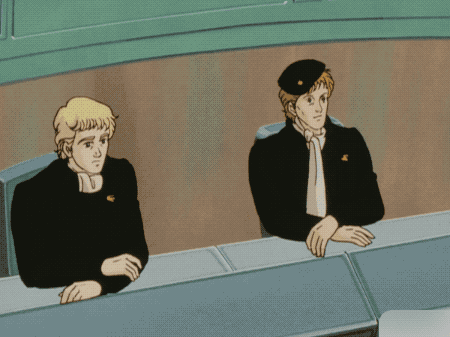
Meanwhile back on Iserlohn, amid the chaos of Geiersberg’s sudden appearance, we are treated to a handful of adorable moments that continue to flesh out the different sides of Poplan and Konev’s relationship.

In the context of the various officers of the fleet gathering together, everything about the body language casts Poplan and Konev as one unit—walking in sync, facing exactly the same angles, even matching expressions and raised eyebrows.

In contrast to that synchronicity, this exchange highlights the differences in their personalities, with Konev adorably facepalming at Poplan’s attempt at philosophy.

I’m distracted from the actual content of this discussion of moral responsibility in representative democracy by the fact that Poplan has not only heard of Oberstein but seems to know a good deal about his personality. Why? How? What is the exact mechanism for disseminating gossip about the quirks of the Imperial admiralty to FPA-occupied Iserlohn? I must know.
Huang and Lebello
Okay, yes, my shipping of Huang and Lebello is a good example of headcanon—not inconsistent with what we see on screen, but not an actual focus of the narrative in any way that drives the plot or gives us insight into their emotions or exact relationship. But hey, all I’m saying is they’re not not an item…
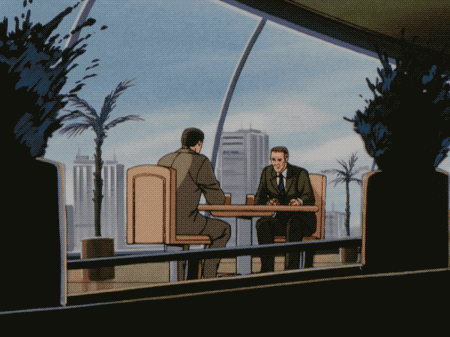
It’s easy to miss since it takes exactly three seconds of screen time and zero lines of dialogue, but the way Frederica and Bucock eventually locate Yang is that Lebello has lunch with Huang, who tells him the location, possibly breaking various laws in the process…

...and at the very least lingering long enough at lunch to be conspicuously late. Huang, come on, is this your first rodeo clandestine meeting to divulge classified national security information?
Stray Tidbits
I can’t get over the amount of thought put into the cinematography here: As they’re discussing the possibility of Iserlohn falling back into the hands of the empire, the camera pans up the FPA flag toward the Empire-style ornate paneling still visible above it. Every single shot has meaning in this show and it’s so damn cool.

Come on Frederica and Bucock, at least give lip service to being worried for the thousands of lives probably being lost at this moment as Geiersberg begins its attack. I know it’s annoying that Yang’s trapped in a room having his hairstyle critiqued but like...maybe look a tiny bit less thrilled about this?

Okay I just said every shot has meaning but I am honestly at a loss with this one. Trunicht........wtf??
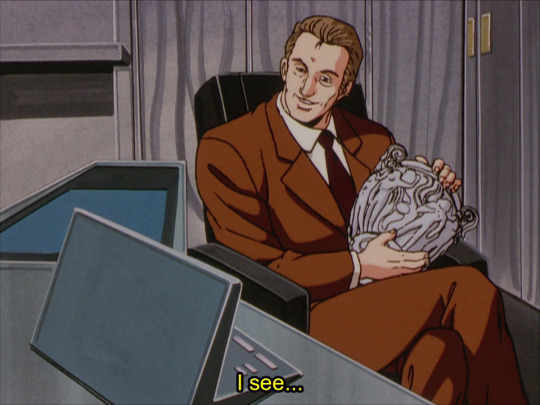
#Legend of Galactic Heroes#Legend of the Galactic Heroes#author: Rebecca#Alliance#Yang#Frederica#Poplan#Konev#power#Huang/Lebello4eva
23 notes
·
View notes
Text
Episode 31: The Inquiry

April 798/489. After a long relaxing journey spent blogging and watching TV, Yang finally arrives on Heinessen, where he is promptly whisked away to await his appearance before the Inquiry. Frederica spends the episode having her illusions about the rule of law and a free press shattered, as her attempts to stop the inquiry by pointing out that it’s illegal are met with an emphatic shrug. On her way to seek Bucock’s help (despite how useless he’s been so far...), she and Mashengo are lured into a parking garage and only saved from being beaten to death by the PKC when Bucock arrives in the elevator at the exact right moment. (PKC, make a note: next time pick a floor of the parking garage on which the guy she’s looking for didn’t park.) Meanwhile Yang calmly schools the FPA politicians on everything from tactics to political philosophy to vegetarianism (?), and back in the Iserlohn corridor, the Ulysses has another eventful patrol.
Power
This stretch of episodes is all about power. The Alliance higher-ups are officially Yang’s bosses, but where does their power over him actually come from? Yang’s the one who commands a fleet and holds Iserlohn, and he’s already demonstrated, during the coup d’état, that he can pretty much conquer Heinessen in his sleep.
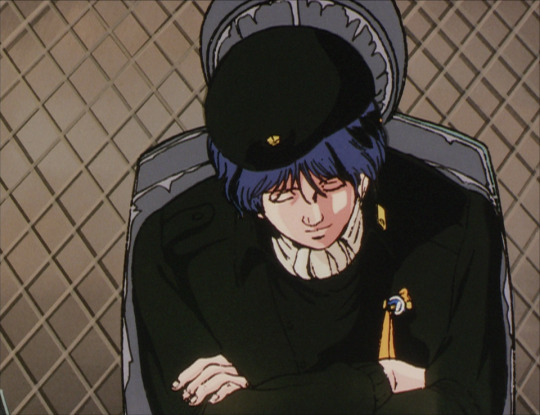
...Literally.
(From episode 21.)
With the urging of Rubinsky and his minion (which was shown in episode 29 while you were probably, if you’re like us, dozing off or taking a bathroom break), a bunch of Alliance politicians whose names don’t matter decide to flex their bureaucratic muscles while they still have them, and order Yang to Heinessen for some sort of super-sketchy-probably-illegal-ish “inquiry.”
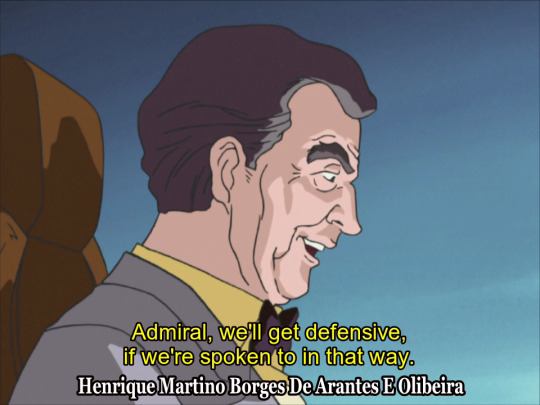
Oh sure, this dude got like five names and Charlotte’s sister got zero, that’s fair.
Feeling insecure about their power in the arenas that ultimately count—who can blow whom up, in this case—the politicians barrage Yang with every trick in the book to drive home the tenuous control they have over him. The moment he steps onto Heinessen he’s greeted by an entourage of armed “bodyguards,” isolated from the small group he brought with him, and placed in what seems to be an imitation hotel room located in some kind of prison, with a burly guard outside the door “in case you need anything.”

These soldiers saluting Yang as they lock him in a room is the physical complement to the doublespeak-esque talk of bodyguards etc., keeping up a charade that he is a respected guest rather than a pseudo-prisoner. Yang’s petulant body language, hands in pockets and not participating in the ritual of saluting, subtly rejects that facade—he isn’t resisting them, but nor is he going along with the pretence that this is normal.

Well spotted, Yang.
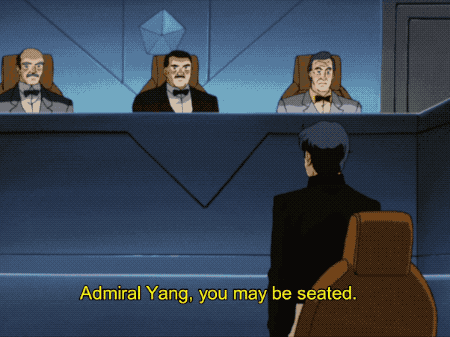
The display of authority extends to micromanagement of exactly how Yang sits. Come on guys, he’s already making concessions to you by sitting in a chair at all.
Yang submits to all of this for now, albeit not very cheerfully, telling himself to be patient and see how it plays out.
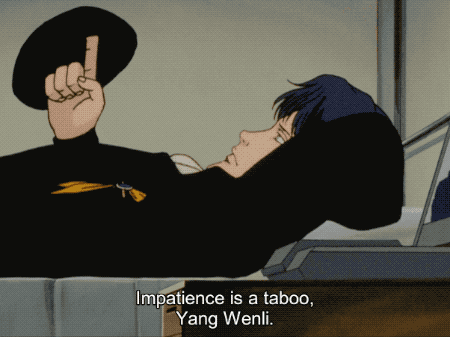
I’m sorry but Yang scolding himself using his full name is just…. *fans self*
The politicians should be careful though: They can play at bossing Yang around, but the whole fear behind this exercise is that if pushed too far Yang might finally snap, give in to his most selfish urges, and use the power he does wield to…

....um, quit? Yes, contrary to what the government fears, Yang’s ultimate act of rebellion, his deep dark selfish fantasy, is not to use his military might to lead a populist uprising. It’s to be left alone.
Yang does, in theory, have the power to resign—he’s had it all along, but his conscience has never quite let him use it. We’ll have to wait until next episode to see whether he can finally go through with it, so for now, let’s see what exactly is up with this “inquiry” that’s pushed him to the brink...
The Inquiry
In episode 29 Yang faced an informal inquiry of sorts from Cazellnu—on his decision to remain single; his role as Julian’s guardian; his future obligations to marry and have kids. And he didn’t handle it well. We saw him evade questions, leave glaring logical holes in his responses, and eventually just remove himself from the conversation. Here, facing criticism about his decisions in a military rather than personal context, Yang is articulate, confident, and thorough.

Ooh, that’s quite a charge; would Yang really have been reckless enough to destroy *all twelve* satellites? Surely it was an accident or something? Let’s go to the tape…

Oh. Right.
(From episode 24.)

Of course Yang has a detailed tactical flowchart in his head of all the different options and their risks and benefits, and the thorough logic of his responses reduces the committee to whispering grumpily amongst themselves and moving on to the next question. If you ask me, they should really check out that previous gif—Yang had his tactical reasons, sure, but it might be Julian’s thirst for wanton destruction they should be worried about…
The whole inquiry is fascinating and hella fun to watch—I could listen to Yang lecture about tactics and politics while keeping up a snarky internal monologue all day.

Pictured: me watching this episode, dramatic reenactment.
(From episode 19.)
Of course, I’m here to excavate these episodes for queer narrative and commentary, not just to fangirl over Yang; and at first blush there isn’t much to excavate here. But LoGH has a habit of dropping its major thesis statements without a ton of fanfare, and I believe this line, delivered in the middle of the inquiry, is one of them:
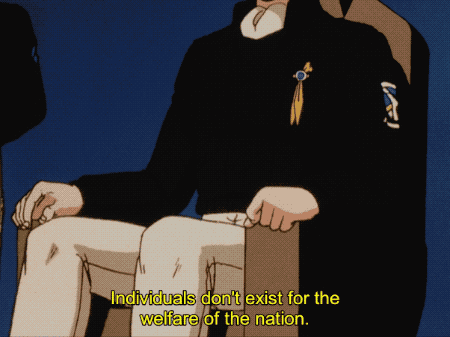
These subs are modified slightly, since again the fansubbers translated from the novel, where the line is not quite the same, and meanwhile the official subs confused a word Yang says, houben (方便), “means/instrument,” with the word tazuki (also 方便), “living/livelihood,” leading to an entirely misleading line. I don’t want to derail the post with more details but if you’re curious hmu on Twitter ’cause I can absolutely talk about this language stuff all day….
The point of society is to protect the agency of individuals, not restrict it. This has already shown up as a fundamental tenet of Yang’s worldview: in his views on the war and the role of the military; in his reservations about Julian becoming a soldier; and in his argument with Cazellnu about the obligation to marry and reproduce. Yang is not thinking specifically about the oppression of queer people when he says this to the inquiry committee; but his speech serves as an umbrella that encompasses many of the show’s political and social themes, including the way homophobia and heteronormativity push to make individuals subservient to societies.
Frederica
One of the most interesting and telling moments in this episode comes after Frederica is rebuffed by Commodore Bay, when she’s reminding herself why she can’t give up on stopping the inquiry. We get a glimpse into her thoughts, where she flashes back to the moment that Yang didn’t fire her for her father’s crimes.
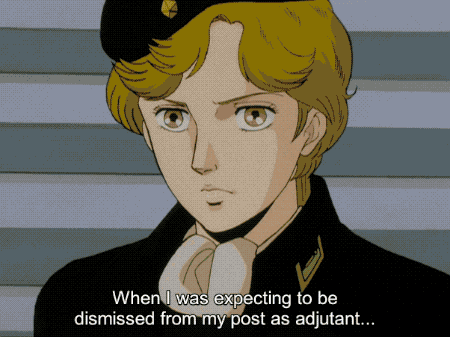
Wow, that is a pretty sweet thing to say, romantic even, especially set to the soundtrack of a lovely Chopin piano piece as it is here in Frederica’s memory. Did Yang really say that? Let’s go to the tape…

...Oh. Uh. Awkward. Okay, let’s go a bit further back in the tape?
(From episode 19.)
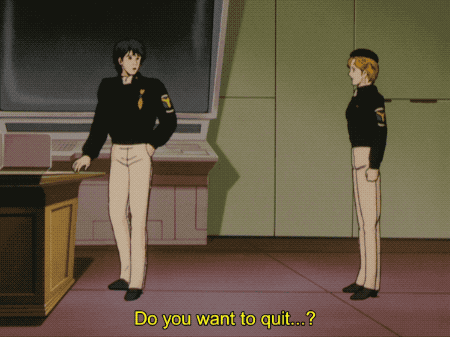
Close enough!
(Also from episode 19.)
There’s a lot to untangle here. First is the question of what Yang actually says: In episode 19, he says kimi ga ite-kurenai to komaru, “if you weren’t here, I’d be screwed.” (Komaru (困る) is a notoriously annoying word to translate but is basically “to be in a pickle.”) In Frederica’s flashback, he says kimi ga ite-kurenai to...komaru-n da. Almost identical, except for the pause in the middle and the -n da ending, which imbues a connotation of giving a reason or explanation for something (similar to the English “it’s that…” or “the thing is…”). So they went to the trouble of re-recording this line—why? Part of the answer might be to match the books, in which this grammatical discrepancy also appears between what Yang actually said and what Frederica remembers. Was that just Tanaka being lazy about proofreading? Who knows, but it’s clear that the anime team read the books very, very, carefully, and it can’t just be a coincidence that the line was changed in the same way in both the novels and the anime.
While the difference in the actual words is quite minor, the aesthetics, music, pacing, and animation combine to give quite different vibes between the two versions. Let’s start with the version we see in Frederica’s memory. It begins with Yang looking off to the side for several long seconds, a small awkward smile on his face, before finally turning to her, eyes intense, and declaring his need for her presence.

It’s interesting that, consciously or not, the fansubbers settled on a more emotionally charged phrase here for their translation of komaru than they did for the almost identical line in the original episode 19 scene. (For what it’s worth the official subs translate both as “I’d be in a real jam.”)
Everything about the rhythm of the scene in the flashback gives an almost confessional weight to his words: the long silence beforehand, eyes averted, as if deciding whether to say it; the pause before komaru; even the grammatical flourish of -n da gives it extra import.
The rhythm of the scene that we saw back in episode 19 was quite different. Yang starts off by asking if she wants to quit—a reasonable worry on his part, since staying on means fighting against her father’s new faction, and that’s a lot to ask of her. When she says no, he responds (relieved) that he’d be, well, in a pickle without her; no pregnant pauses or awkward smiles precede the line, and it’s delivered as a blunt declarative sentence, not an explanation.

(...Still from episode 19.)
And Frederica....gasps. Aloud. However Yang did or didn’t mean it, Frederica visibly takes his words as Important, shocking even; and Yang, ever anxious about crossing professional boundaries, looks away and sheepishly explains that he sucks at computers and needs a good adjutant. It’s this animation that was repurposed for the flashback, but in the original scene there is no extended silence in which he’s trying to decide how much to say; he’s talking continuously. His embarrassed look seems to come from noticing her startled reaction and wanting to clarify.

...Or possibly he’s just embarrassed by his complete lack of any practical skills?
(ibid.)
We don’t have to go as far back as episode 19 to find a contrast between Yang’s framing of his decision not to fire Frederica and her memories of it: Just a few moments after Frederica’s flashback we cut back to the inquiry to find Yang fielding questions on the topic.

Firing an incredibly good adjutant—or a shitty adjutant for that matter—for her father’s crimes is obviously against Yang’s philosophy and character, as he outlines here.

As Julian said to Schenkopp in episode 30 (fear not, I will absolutely come back to that scene in the future), Yang’s feelings are opaque. He obviously respects Frederica’s professional abilities a ton and likes having her as his adjutant; but as of right now there is precisely zero affirmative evidence to suggest any romantic interest from his end. Certainly his decision not to fire her does not constitute such evidence. (If it did, uh, that would be pretty damn unprofessional.) His awkwardness around her—including during that episode 19 scene—is consistent with his general anxiety about any potential romantic interactions, especially given how little she hides her own feelings.
What we learn from our peek into Frederica’s thoughts is that Yang’s attempts to explain and downplay his remark as having been purely professional, well, failed. We get to see the internal view behind Frederica’s gasp, the way that that one moment stuck in her mind and swelled into something with much more emotional intensity behind it. We’ve all been there; that’s exactly how crushes work. There is no affirmative evidence, so her mind has tweaked that memory until it almost feels like some. This is not a major revelation—we’ve known about Frederica’s crush for a long time. But in a show that does so much to convey emotions with small details of facial expression, language, narrative framing, etc., it’s fascinating to see the specific devices they use to show how Frederica’s crush-tinted view is slightly at odds with reality. As we’re continuing to set up the themes and relationships that will evolve over the season, any tension like that is worth noting.
Stray Tidbits
Meta alert: Here’s Yang attempting a bit of textual analysis of the hidden sociopolitical themes of some random show their ship picks up from Heinessen. Don’t let Frederica’s giggle make you self-conscious Yang! As a wise man once said, ���The parts that show above the surface are small...” etc.

Sorry anime team, I’m calling you out—I don’t buy that Yang would type with any method other than hunt and peck.

“Words are something that should be written by hand, that's what Yang believes. Word processors, with their noisy typing sounds, Yang despises from the bottom of his heart. He says they're ‘ridiculous machines that turn the yelp of a dog into letters.’”
—Julian’s Iserlohn Diary, p. 12
Speaking of writing by hand, next time someone tells you to make sure to dot all your i’s and cross all your t’s here’s a gif to send them.

Ever have that nightmare where the government whisks you away to a secret locked room and puts your old report cards up on a big screen and everyone laughs at them? No? Just Yang? I’m impressed with that 58 in Practical Shooting Skills honestly; he undersells himself.
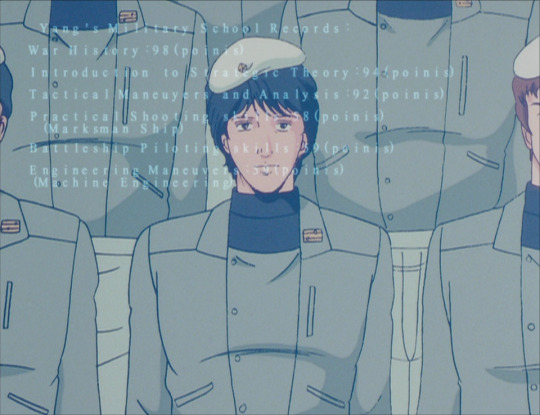
I confess I have spent actual extended chunks of time discussing the question of which online political blog/magazine/whatever Yang would write for if he lived in the present. What do you think, dear readers? Let the debates begin.
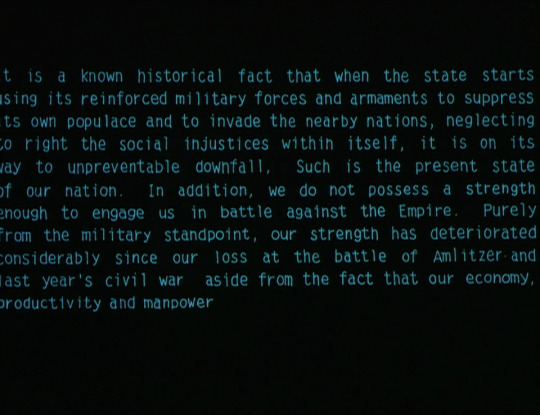
Another confession: Every time this episode begins and Yang's voice floats over the instrumental OP music, I feel a pang of sadness that the whole episode isn't literally just Yang sitting in a room narrating his political musings. 100% would buy that audiobook.
Hey, it’s Huang!! You may remember Huang Louis from back in episode 12 when I promised you that he is awesome; and here he is, being, in fact, awesome. I love him. I plan use this gif at every opportunity.

The most breathtaking moment of the episode is the very end, when an Iserlohn patrol ship is suddenly confronted by...

It’s an intense and beautiful sequence and sets us up for the drama of the next few episodes; but I admit the gravity of Geiersberg’s sudden appearance in the Iserlohn corridor is slightly undermined for me by the fact that I cannot stop cracking up at this exchange...

#Legend of Galactic Heroes#Legend of the Galactic Heroes#author: Rebecca#Alliance#Yang#Frederica#Huang#power#politics
17 notes
·
View notes
Text
Episode 30: Lost Things

March 18, 798/489. In the Empire, Reinhard’s fleet prepares to warp Geiersburg Fortress into the Iserlohn Corridor. On Iserlohn, Yang prepares to submit to a dubiously lawful inquiry by the hostile—but democratically elected!—Alliance government. Hilda convinces Mecklinger to pay a visit to her sick cousin, who teaches us all about the importance of having hobbies. And Geiersburg’s test warp, thanks to Kempf and Mueller’s adept leadership, goes off without a hitch. Meanwhile, Reinhard sinks deeper into depression, Julian blows off steam at the shooting range, and Reuental and Mittermeyer (you guessed it!) go on a date.
Reinhard Alone

Reinhard may be dead inside, but he still looks amazing. Episode 30, in particular, has some of my favorite animation in the series, so please enjoy all the ridiculously beautiful heartbreak as much as you possibly can through your tears.
We haven’t spent much time with Reinhard since the traumatic season 1 finale, so we’re long overdue for a check in with our fast-rising Empire-side hero. How’s he been doing?

Not great!
(From episode 28.)
Once you're immersed in how LoGH tells stories, it’s tempting to say that Reinhard’s newly sour affect “should come as no surprise,” given what he’s been through. And though that is true on an in-universe level—nobody who suffered the tragic loss of a long-time romantic partner only months ago should be expected to have recovered already—it would be disingenuous of me to suggest that surprise at the way LoGH treats Reinhard’s grief is unwarranted.
In my episode 26 post, I talked about how my past experiences as a queer consumer of media had primed me for LoGH to handle Kircheis’s death poorly, and what a surprise it was when my expectations were subverted. In that light, Reinhard’s grief—the way it changes him, the way it has a tangible presence, the way other characters tiptoe around and discuss it—is a surprise. It’s a constant reminder not just of how important Kircheis was (and still is) to Reinhard, but also of how committed LoGH is to treating its queer characters and their relationships with respect.
LoGH can be a difficult show to watch. Not only does it have over a hundred incredibly dense episodes to get through—some of which are basically impossible to parse unless you watch them more than once—but it’s also deeply, sometimes overwhelmingly sad. Depending on the context, though, that can be good, or at least validating. And Reinhard’s grief, upsetting though it may be, is fundamentally important to a queer reading of LoGH.
Like I said during episode 26, Kircheis’s death is a turning point for the slow dissolution of LoGH’s heteronormative surface reading. And the unflinching portrayal of Reinhard’s grief from here on out is evidence of an ongoing decision on the part of LoGH’s creative team to allow what was formerly confined to subtext to remain above the surface.
The Locket

The way Reinhard’s voice softens when he talks to “Kircheis” via his locket is dramatic and says a lot more on its own than is possible to express in a mere text caption. If you missed it the first time, definitely go rewatch this scene in episode 28 (the timestamp is 3:45) to get the full effect.
The most obvious manifestation of Reinhard’s grief is, of course, his locket, in which he keeps a family photo and a lock of Kircheis’s hair. Some of Reinhard’s colleagues, as I’ll get to in a minute, worry about him because of how much he’s changed since Kircheis’s death. But I would argue that a lot of what’s so disturbing about Reinhard’s transition into Life Without Kircheis is the lack of change, at least in one respect: He still relies on Kircheis for emotional support, as is evident in the gifs above, and for strategic advice, which we see a bit of in episode 30 (below), and will see more of in the future.

Hilda is particularly attuned to Reinhard’s new habit of playing with his locket whenever—were Kircheis still alive—he might have looked to him for input, approval, pushback, or whatever.
There’s nothing inherently unusual about accessing one’s memories of a departed loved one for guidance, but Kircheis was Reinhard’s only intimate relationship before he died, and now that he’s gone, Reinhard still shows no interest whatsoever in diversifying his support network. As a result, his only intimate relationship is now with an inanimate object—or, to put it another way, he has nobody.
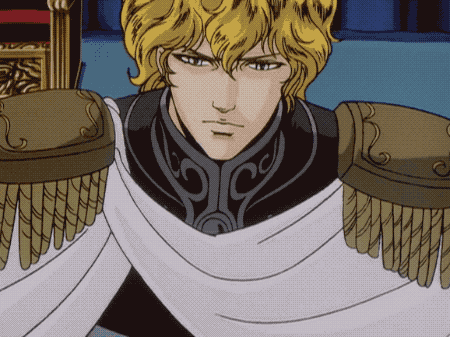
Of course, Reinhard’s isolation isn’t entirely self-imposed. Annerose was also a source of strength and comfort before she voluntarily withdrew from his life. If things had gone differently and Annerose had stayed, Reinhard might not feel so lonely—but would that have been healthier, for either of them? I’m not sure. My guess is: not significantly.
Other People
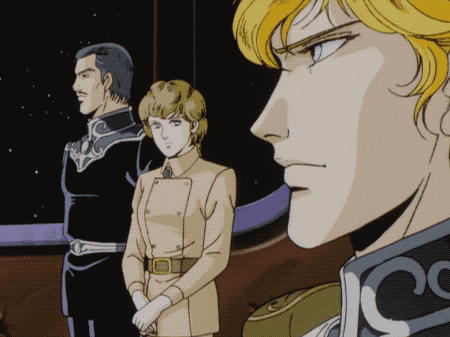
I’m not sure Reinhard realizes how obvious it is to everyone around him the extent to which he’s been utterly destroyed by Kircheis’s death. The fact that he wouldn’t care even if he did realize is, well, not unrelated.
From the relatively trivial to the life-altering, rumors and hearsay play a substantial role in our understanding of LoGH’s world and characters. Reuental and Mittermeyer, who have already spent a good deal of time gossiping about Reinhard and will continue to do so far into the future, are responsible for a good portion of the Empire-side gossip that we see—probably as a factor of their daily standing date. In episode 30, Reinhard’s two highest ranking admirals discuss the depths of his grief in vague terms:
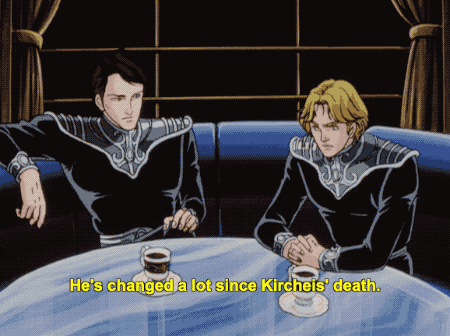
It’s worth mentioning (as always) that Reuental and Mittermeyer’s bodies during this scene are beautifully aligned, without being symmetrical. The line of Mittermeyer’s torso is precisely parallel with Reuental’s left arm! Look at it! In case you hadn’t noticed, I am in awe of the animation team’s treatment of these two.
Reuental and Mittermeyer’s discussion of Reinhard and Kircheis is, of course, about more than just Reinhard and Kircheis—this is Reuental we’re talking about, after all, and he is pathologically incapable of saying one thing without also meaning at least five other things. For the time being, though, this scene mainly adds another, third-person dimension to Reinhard’s grief: We already know how it is affecting him personally; now we also know that it is affecting the people around him, that they’re aware of it, and that these are important enough facts to merit scenes of this length devoted to conveying them.
Hilda, on the other hand, is a lot less prone to gossip than Reuental and Mittermeyer—or maybe she just hasn’t found the right gossip partner?—so her feelings about Reinhard’s situation are communicated to us differently, mainly via looks (above) and internal monologue:
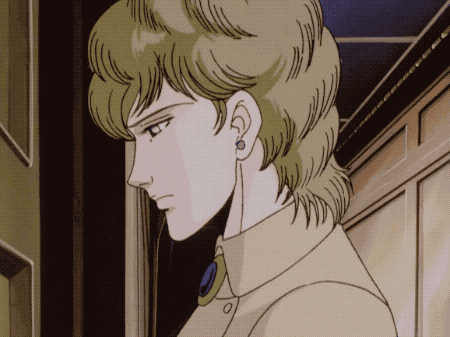
Worry not, dear reader: I’ll be spending tons more time on Hilda and her well-articulated emotional intelligence in the very near future. For now, feel free to repeat “Hilda knows everything” to yourself whenever you see her on your screen, because that basically sums it up.
I also love this little exchange, after Reinhard shuts himself away (again) in the room on Geiersburg where Kircheis died:
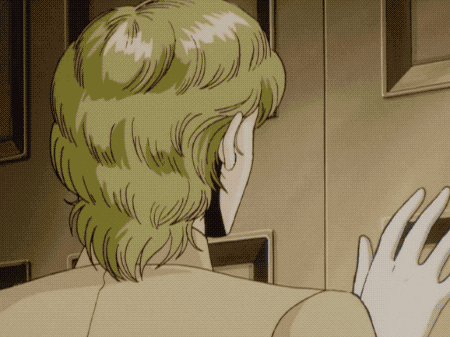
Kempf and Mueller’s quick look of mutual understanding here is so simple, but goes a long way towards expressing that the topic of Reinhard’s grief is never far from anyone’s lips among the admiralty.
These are all—even the lengthy conversation between Reuental and Mittermeyer—comparatively small moments in the overall landscape of LoGH. But taken together, they convey that Reinhard’s grief is not small; not for him, not for the people around him, and not for the galaxy.
Reinhard’s Oberstein Eyes
On a subtler character note, remember a few episodes back when Rebecca likened Reinhard’s eyes to Oberstein’s? Well, you may have thought she was being facetious, but she extremely was not. Allow me to demonstrate:

Here are Oberstein’s eyes as they appeared in episode 4. Their most noticeable trait is, obviously, the fact that they’re flashing red. But another distinctive characteristic of Oberstein’s eyes is that they don’t have any highlights or other details beyond the pupil and flat, uniformly blue iris.

In contrast, this eye-heavy moment from episode 28 is a good example of how eyes are typically animated throughout LoGH—with the remarkably consistent exception of Oberstein’s which are, of course, artificial. Mittermeyer and Reuental’s eyes here both have distinct highlights, and seem to move naturally.
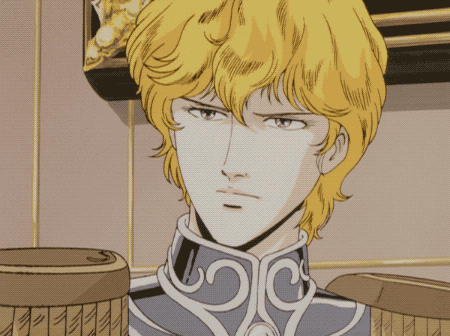
Here’s an example, from episode 9, of how Reinhard’s eyes in particular have been depicted before now: Note the visible highlights that change and move with his expression. Reinhard’s eyes do a lot of characterization work for him, and obviously got a corresponding amount of attention from the animation team.
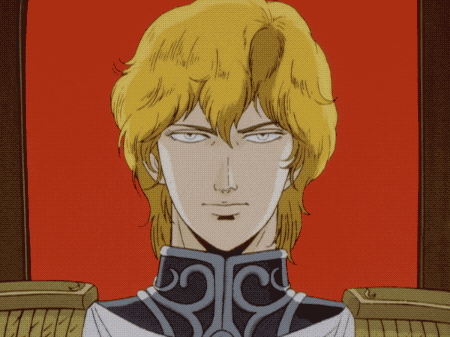
Compare that to Reinhard’s eyes here, in this moment from episode 27. Like Oberstein’s eyes, Reinhard’s irises are now flat and lifeless. They don’t move with the rest of his face and have none of the energy we’re used to seeing from him.

But unlike Oberstein’s, Reinhard’s eyes aren’t synthetic. So when he lets his guard down—which he can only do when he’s alone with his memories of Kircheis—we see unbridled pain and anguish flood back into them. Poor Reinhard.
Stray Tidbits
Can someone please explain to me exactly what is going on here? Why does Yang’s desk only go up to Schenkopp and Cazellnu’s knees? Why is Yang proportional to his weirdly tiny desk? Why is his entire head smaller than Schenkopp’s crotch? This single screenshot keeps me up at night with questions.
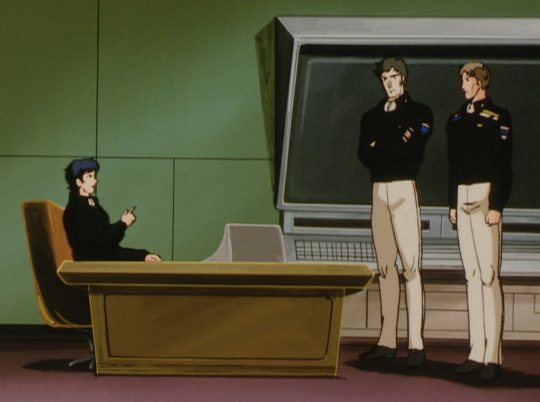
Maybe the furniture store that sold either Mittermeyer a tiny chair or Reuental a huge chair also has a location in the Alliance.
Try to imagine something more suspicious than not having a pet. How about liking books more than pets? Yeah, that’s what I thought.
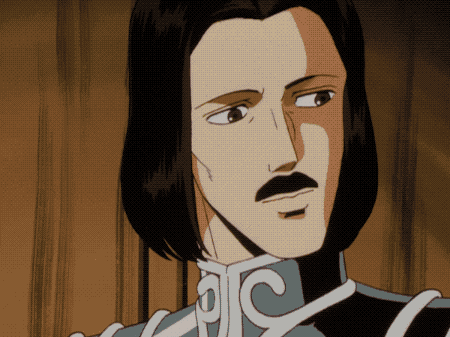

Time for some fun facts: Other than Da Vinci, the three historical figures that Hilda’s cousin mentions are Cao Cao, Lazare Carnot, and Tughril Beg. Biographical info on Cao Cao and Lazare Carnot makes it pretty clear they were both, like Mecklinger, Renaissance men who had a wide variety of cultural accomplishments in addition to their political/military careers; it’s harder to find information on Tughril Beg but my guess is that he falls into the same category.
#Legend of Galactic Heroes#Legend of the Galactic Heroes#author: Elizabeth#Empire#Reinhard#grief#queerness#eyes#Reinhard's locket#Geiersburg#gossip
21 notes
·
View notes
Text
Episode 29: One Narrow Thread
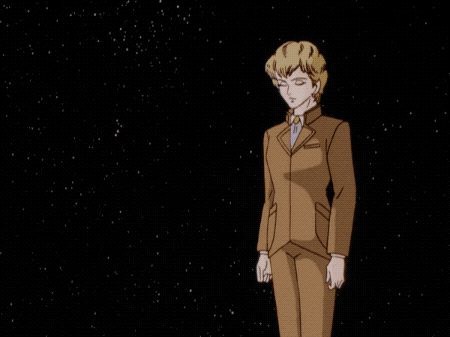
Early 798/489. Adrian Rubinsky meets with Bishop Degsby of the Earth Cult to discuss his plans to aid Reinhard’s forces in capturing Iserlohn and then assassinate Reinhard to seize power for Phezzan. Degsby points out that under this scheme the Earth Cult’s investment in setting up a puppet government on Heinessen would be a wasted resource, but Rubinsky plans to use his financial control over the Alliance government to manipulate them into backing Yang into a corner. Degsby reminds Rubinsky that he owes the Grand Archbishop for his current position and had better tread carefully. Rubinsky sends his minion Kesserling to Remschild to propose a scheme that will ensure that the Empire and Alliance continue to fight each other, while Admiral Kempf attempts to perfectly sync twelve warp engines to avoid trapping all of Geiersberg fortress in null space. ….....Meanwhile back in the actual show we’ve been watching, Yang loses at 3D chess, Julian attempts to drink wine, and Hilda visits Kircheis’s grave.
A Quick Language Rant
“Words are like icebergs floating on the ocean called ‘heart.’” This quote provides the guiding philosophy for this project: LoGH is a text that uses the nuances of language, in concert with facial expressions, body language, symbolism, etc., to point the viewer to deeper layers of meaning in the story being told. As a close reading of the queer narratives in LoGH, this blog attempts to tease out and expose these slightly hidden layers. But…..we are writing in English. You’re reading this in English. The gifs we reference have English subtitles and no sound. And uhh, how do I put this diplomatically…
Every English translation of LoGH sucks.
...Okay that’s a bit harsh. Translation is fucking hard, especially of such a complicated work, and everyone who’s put hours and hours and hours into bringing LoGH to the English-speaking world deserves a hell of a lot of gratitude and credit. We never would have been able to watch the show without them. But. When we get into the nitty-gritty details of analyzing a scene, the fact that often none of the existing translations matches the nuance of the Japanese gets in the way. I’d much rather be plunging into yelling at Cazellnu right now than writing this note, but the conversation between Cazellnu and Yang in this episode is a mess in both sets of subtitles that I have access to, so here we are.

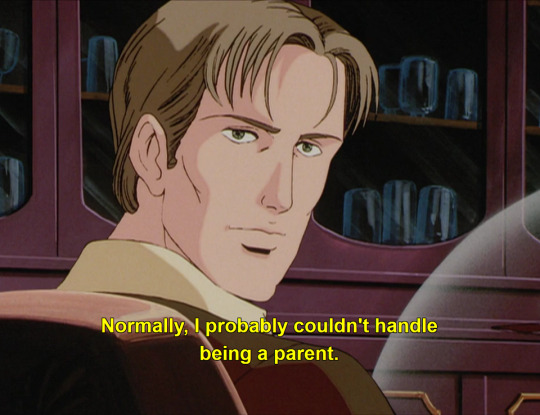
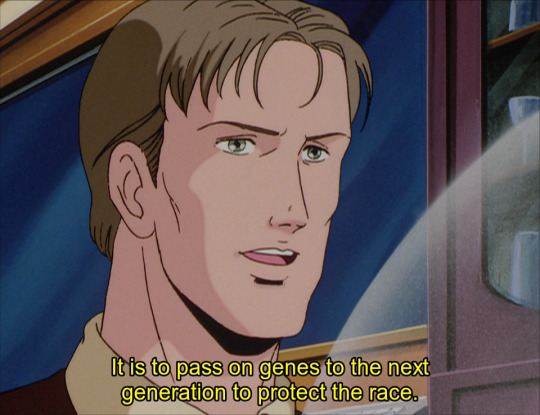

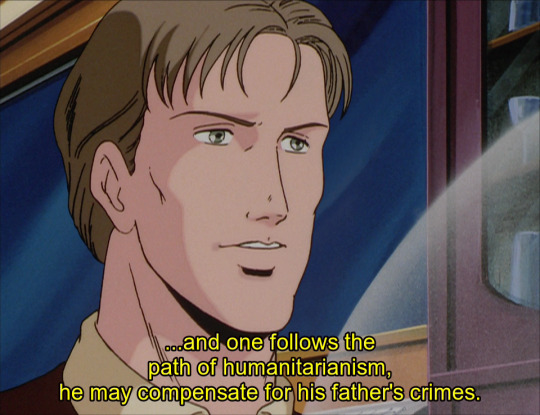
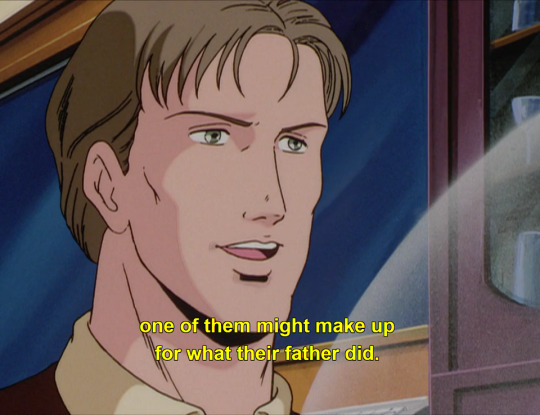


Let’s start with the fansubs, on the left—notice a couple whole clauses that aren’t in the official Hidive subs at all? Care to guess where they come from? That’s right, they come directly from the novels, as does the word “perfect” in Yang’s “perfect parent” line. Hey, I totally get it, fansubbers, the novels are a fantastic resource for figuring out the kanji or double-checking words that are hard to hear. But the dialogue in the anime is not in fact lifted verbatim from the novels; and while not every difference is super meaningful, we are interested in the intentional choices made by the anime staff, and that makes deviation from the books especially ripe for analysis.
The official subs, which are generally quite reliable, are also unsatisfying in this scene. As I’ll discuss below, the word that Yang uses replacing the novel’s “perfect” is 人並みに, hitonami ni, an adverb meaning “like others/as much as anyone else.” The official sub translation makes it sound more like “under normal circumstances” than “like normal people,” and while that’s not a life-altering difference, the nuance is relevant to my analysis. And they got the grammar of the sentence in the last gif here backwards; indeed, neither subtitle translation understood what I believe Yang is saying in those lines, but the English translation of the novel agrees with my interpretation. (Not that the novels don’t have their own translation problems, which is outside the scope of this blog but also frustrating…)
Phew. What all of this means is that before we can even start writing a post, we have to go through a whole process of triangulating all of the slightly different translations of any scene we want to analyze in detail, making sure that we understand the nuances of the language and can convey them accurately. (Not to mention checking the original LD version to make sure no significant changes were made to the animation in the DVD remaster!) In the case of the conversation between Yang and Cazellnu, the subtitles used in this post are my own synthesis based on the fansubs (modified to reflect the actual anime dialogue) and the translation in the novel (where I believe it to be more accurate).
With that out of the way, we are now ready to plunge into the main battle of this episode, so buckle up for....
Yang vs. Cazellnu!
That’s right, we’ve seen Yang battle Imperial fleets to improbable stalemates at Astate and Amlitzer, outsmart the commanders of Iserlohn to capture it from the inside, and annihilate one of his own nation’s fleets on his way to defeating the military coup; but how does Yang the Magician handle the most intimidating of all battles: having dinner with a married friend?? I’ve said before that Icebergs is not a relationship advice column, and nor is it, usually, a tips and tricks guide for dealing with pressure from peers to conform to heteronormative expectations, but hey—when we have the chance to learn from a Master Tactician, we should take it, right?

...Hmm.
...Well in any case, what’s fascinating and important about this conversation is that it does have the back-and-forth tension of a battle, with multiple strikes and counterstrikes: Yang employs a wide range of different strategies tactics to parry the various arguments that Cazellnu makes in his quest to convince Yang of his duty to marry. This conversation is key to understanding both Yang’s attitude toward marriage and family, and the way that Cazellnu often speaks explicitly in the voice of the normative pressures society puts on people to fit into the “married with kids” box. The dynamics of the entire interaction set Yang and Cazellnu up as opponents, and the sum total of Yang’s resistance to all of Cazellnu’s different angles of attack paints a clear picture of his current reluctance to see himself in the role of husband or father.
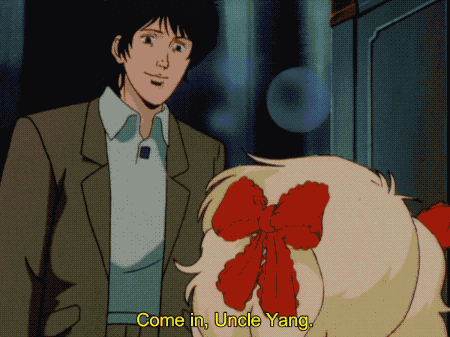
Yang does indeed provide the first opening to be scolded about marriage, when he takes offense at Charlotte using the suffix -ojichama (an affectionate “uncle”) in contrast to -oniichama, “big brother,” for Julian. Keep this moment in mind; I’ll be coming back to it in…*checks calendar* about eight months.

Immediately Cazellnu frames marriage as a societal obligation, and failure to marry as a “luxury.” Aww Cazellnu you romantic you.
In the previous episode we saw Mittermeyer pushed toward a normative marriage by subtle, insidious pressures—his upbringing within the context of a traditional family and the (possibly unspoken) expectations from his parents that he’d follow that model; the preponderance of visible heterosexual romance in his society. We’ve seen Yang swept along passively into romantic situations in which he was obviously uncomfortable. But Cazellnu’s line right here is the first time that a character has actually given voice to the institutional heteronormativity of society, actually advocated for it in so many words, actually leveraged it to criticize someone’s deviation from that norm.
Bantering with a friend in the abstract is way less uncomfortable for Yang than being thrust directly into a potentially romantic/sexual situation—unlike when Lapp pushed him to dance with Jessica or when Jessica threw herself at him, here there is no immediate danger, no specific person to reject or offend. This is an intellectual battlefield. And so Yang does fight back actively, starting with Tactic #1: appeal to historical precedent.

Note that while in his initial grumbling Yang said he wanted to be called oniichama while *still* a bachelor, now that he’s talking in the abstract rather than about himself he’s taking the even stronger stance that people can be productive members of society while *never* getting married. This line of argument makes sense; history is where Yang feels like an authority, and even the syntax of his “shall I make you a list?” reinforces his expertise here.
If Cazellnu’s thesis were that marrying is the only way to be an asset to society, Yang pointing out the existence of plenty of queer people—er sorry, “lifelong bachelors”—making contributions throughout history would be an effective rebuttal. (No, I don’t think that Yang is consciously talking about queerness, but yes I do think the creators are, through him.) But Cazellnu’s thesis is that participating in marriage and reproduction is an obligation on top of whatever other accomplishments someone might have, and Yang bringing up historical precedent opens the door to Cazellnu pointing out that not only is marriage the norm right now, but it has been for much of history.

In case you think I’m just being overly cute with all the battle analogies, it comes directly from the source material: The narration in the novel here contains lines like “And the point goes to Cazellnu, Julian thought” and “Yang didn’t attempt another counterstrike.”
In the anime, however, Yang does attempt one more counterstrike here, which is important because it’s the closest he gets to just saying “but I don’t want to.”
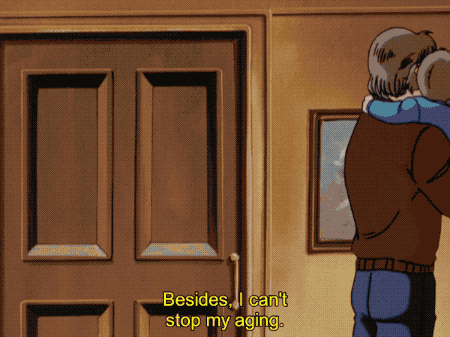
For Tactic #2, Yang complains that he didn’t pass thirty on purpose; in other words, Cazellnu may think he’s at an age where he ought to be married, but on the inside he doesn’t feel ready for that role. In case there was any suspense about Julian’s feelings on the matter, he is in no rush for Yang to decide he has to get married—keep this line in mind too, as I’ll be coming back to it in a mere six months.
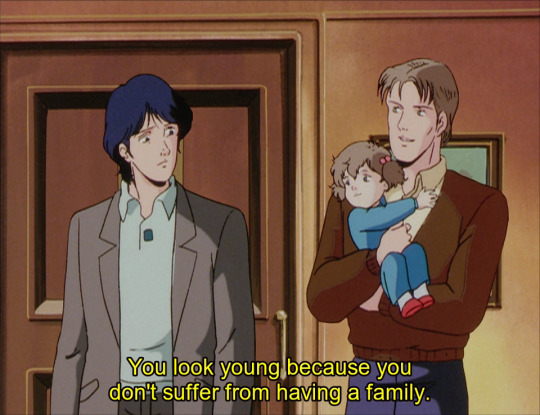
Cazellnu switches the issue from Yang’s feelings to his outward appearance—a subtle but symbolic shift. If only Yang would suck it up and play the proper role, he would become (outwardly at least) a true adult. The issue of Yang’s desires is casually brushed aside.
This entire exchange is good-natured banter—Cazellnu’s intention here, at least on the surface, is to tease Yang, not to seriously condemn him for his choices. But the framework in which people joke is telling; and Cazellnu’s teasing is framed around the assertion that Yang is selfish for neglecting his duty to play the part of husband. Stage one of the battle is interrupted at this point for dinner, and for stage two, during a 3D chess match after dinner, Cazellnu’s joking tone is gone. The topic at issue this time is not just marriage but also parenting; when Cazellnu casually (but correctly) criticizes Yang’s parenting skills, Yang defends himself with Tactic #3: appeal to special circumstances.

Notice that Julian is paralleled to Hortence here in the role of caretaker to the girls. He’s simultaneously being included by implication in the younger generation—as Cazellnu and Yang discuss Yang’s pseudo-parental role in his life—and acting as an adult vis-à-vis the younger kids. At the risk of becoming a broken record...keep this moment in mind, as I’ll be coming back to it in the future.
The key to what Yang’s trying to say here is that adverb I mentioned earlier, hitonami ni, which is a deviation from the dialogue in the novel and therefore something the anime staff thought about explicitly. Hitonami is an adjective meaning average or ordinary (literally “in line with people”), so the adverb form means “like other/most people.” Yang is situating himself as fundamentally outside of the norms that Cazellnu is so fond of imposing: He couldn’t be expected to be a parent like normal people, because he didn’t grow up with a model of a traditional family and because he’s single.
His upbringing is in the past and outside his control; but being single is (on the surface) a choice that he has made—between the tables full of love letters, and Jessica being none too subtle about her continued interest, and everyone on all of Iserlohn knowing that Frederica has a thing for him, it’s always been clear that he’d have options if he were interested. It’s not that his point here doesn’t stand—I agree, the fact that he’s a bachelor who lives alone and has zero interest in or experience with kids did make him a strange choice for Julian’s guardian. But tactically, within this conversation, this was a huge blunder: It opens the door right back up for Cazellnu to continue the marriage guilt trip that was interrupted earlier. And sure enough...
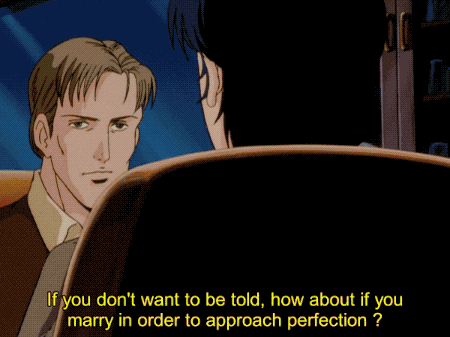
This is such an obvious error that it seems revealing; in Yang’s subconscious, when he’s thinking about why he can’t be expected to be a parent “like most people,” his status as single might feel like something more innate about himself than a temporary circumstance or choice. His shock here is overdone considering the earlier banter. Tactic #4, blaming the ongoing war, is presumably one he’s used before, as Cazellnu is expecting it and doesn’t bother engaging with it directly at all, instead…
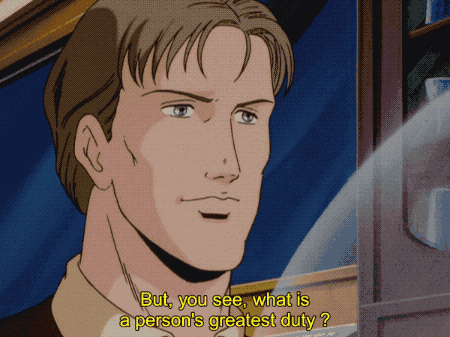
...finally delivering his thesis statement on marriage and reproduction clearly. And well, it’s a doozy.
A human being’s greatest duty is to bring forth new life. Damn Cazellnu. The use of the word “duty” (Japanese: 義務, gimu) echoes what Poplan started to say to Konev and Julian about a man’s “duty” to have sex with women; within the first three episodes of the season we’ve had two different characters explicitly describe heterosexual sex and/or reproduction as an obligation. (And throw in the slightly more coded discussion of Mittermeyer’s parents’ “expectations” about his role in society that preface the depiction of his marriage, as well as Reuental’s discussion of his own parents’ unhealthy and unromantic marriage that we haven’t even had time to talk about yet…..hmmmm is it possible that a theme is being established here?)
I can’t emphasize the importance of these lines enough: This is not passive, silent, subtle heteronormativity. This is Cazellnu voicing a view of the main purpose of human life that positions essentially all queerness as not just unusual or different, but specifically a deviation from the greatest duty of human beings. He is not joking. He’s not bantering. This is his worldview.
...And it pisses Yang off. Leaning forward in his seat, setting his brandy glass down with a noticeable thud, furrowing his eyebrows—this is more visibly angry body language than we usually see from Yang. As for the actual content of Tactic #5, well, as much as I love Yang I have to accuse him of a bit of an obnoxious-Reddit-poster argument style here, completely avoiding what Cazellnu actually said and deflecting the topic to something he’d rather be arguing about instead.
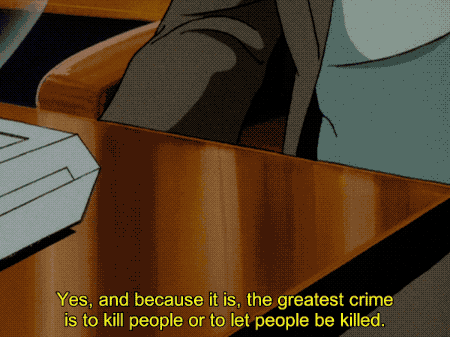
Yang: “Yo can we please go back to talking about how much war sucks? I thought I signed up to be on an anti-war show, not to be lectured at about heteronormative social structures…”
The best I can do to relate this reply to what Cazellnu said is that Yang’s either implying that his own record of causing death as a commander morally disqualifies him from being worthy of participating in the whole creation of new life thing, or possibly questioning the wisdom of bringing new life into the middle of a war. Cazellnu seems to take it to be about Yang’s sins, as he counters with—somehow—an even more obnoxious view of the point of reproduction.

“Okay little Timmy, I’ve caused the deaths of approximately three million soldiers in war, so just be a good boy and go do enough good to compensate for that so Daddy doesn’t go to hell, okay?”
Yang is done with this crap by now, and the next gif is a tactical three-for-one: First he points out that for this specific point of Cazellnu’s, about passing along one’s unfinished ambitions to the next generation, there’s no need for one’s protégés to be biological children (#6); then without giving Cazellnu time to respond (perhaps by pointing out that this doesn’t address his original argument about biological imperative to create life), he adds that this whole discussion is moot in the case that there isn’t unfinished ambition to pass along in the first place—again positioning himself as outside the scope of Cazellnu’s arguments (#7); and finally…

...the ultimate maneuver to win any difficult argument: Tactic #8: get up to go pee.
If you’re keeping score, I’d say that the great undefeated Admiral Yang loses this battle badly. Cazellnu is constantly a step ahead, turning Yang’s arguments back around on him and taking advantage of every opening. Yang is a scholar and a brilliant logical thinker, but you can’t fight convictions like “humans have a duty to reproduce” or “being a bachelor is anti-social behavior” with the kind of logic that Yang is practiced in. Heteronormativity is, for Yang, a more difficult opponent than the Imperial army.
Julian
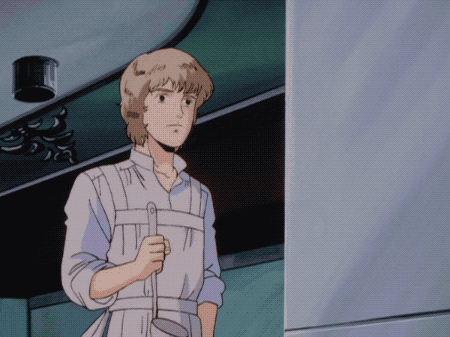
hey-did-we-mention-Julian-has-dual-identities-of-soldier-and-caretaker.gif
The first episode of season two was all about Julian beginning to grow up as a soldier; this episode forms the natural complement by focusing on Julian’s more domestic roles. Back when Julian was first introduced I mentioned that he’s one of the only male characters who embraces more traditionally feminine roles, and in this episode that side of his personality is emphasized—from happily puttering around the kitchen doing laundry and cooking dinner, to helping look after Charlotte and her little sister (henceforth known as Demon Child Cazellnu, D.C. for short, until someone gives me a better explanation for her namelessness…).

Did I say Yang vs. Cazellnu is the main battle of this episode? I should have said it’s second after the epic clash of Gensui vs. the Roomba.
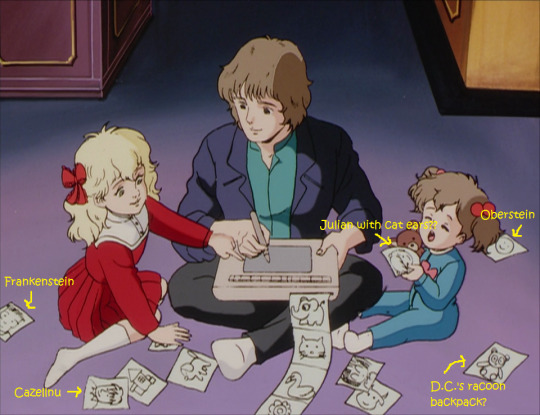
Fun fact: 1600 years in the future everyone has finally gotten over being pedantic about calling it “Frankenstein’s monster”!

It’s not played up in the anime except in background shots like this, but from Julian’s diary it’s clear that, along with Yang, Schenkopp, Poplan, etc., Hortence also serves as a role model and mentor for Julian—he speaks admirably of her ability to quickly turn her new Iserlohn quarters into a true home, and eagerly seeks out new cooking ideas and tips from her.
Julian is by nature a caretaker and nurturer; it’s as much a part of his identity as his urge to fight to protect the things he cares about. I can’t express how fucking cool it is that one of the main protagonists of this show is a teenaged boy who’s completely comfortable putting on an apron and making stew while the washing machine whirs in the background, who looks up to both soldiers and housewives, who spends the evening playing with two little girls until they fall asleep on his lap. The landscape of fiction is generally not filled with men who are defined by empathy and nurturing. It’s so badass and so important that Julian embraces these sides of himself, without feeling the need to somehow reject or outgrow them in order to become a Real Man.™

.....Okay Julian yes you are a badass but please dear god learn how to hold a wine glass.
...and Yang

Icebergs Canon: The reason Julian’s suit and Yang’s pajamas are the exact same color is not the animators being lazy, it’s that both items were gifts from Hortence, who clearly bought them at the same store.
Oooh what is this? Actual backstory about what the fuck Julian is even doing in Yang’s life? One keyword of the storytelling style of LoGH is “patience,” and the show has taken its sweet time offering any real explanation of their whole deal. From episode 3 we know that Yang is Julian’s “guardian,” that Julian’s father was also a soldier, and that the military has paid for Julian’s schooling, but in typical LoGH fashion we’re forced to try to piece the details together ourselves. Here, finally, we’re given a few more snippets: Julian was sent to live with Yang four years ago, when he was twelve, and the person who had the brilliant idea to entrust Yang with a child was none other than…
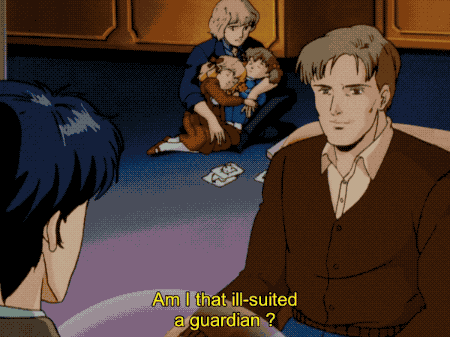
This is the one skirmish of their battle in which Yang is clearly victorious. Even Cazellnu can’t come up with a defense of this decision. Seriously, Cazellnu…..why.

Poor baffled Yang has absolutely no clue what to do with this small human who showed up at his house and immediately started cleaning up. I love that Yang appears to have repeatedly gotten frustrated while writing something and strewn crumpled drafts all over the room...wtf Yang.
This flashback, which takes place earlier in the episode, complements and reinforces Yang and Cazellnu’s discussion of Yang’s total lack of parental instincts: Although he’s come to care about Julian a lot, he had no enthusiasm for this arrangement when Cazellnu first foisted it upon him. He’s Julian’s guardian not because he wanted a child, but because Cazellnu, tasked with managing supplies of all kinds, had a surplus of war orphans needing housing and pressured his friend into taking one in.
Back in the present, Julian continues to stress about Yang’s disapproval of his military career, leading to my third-favorite failure of the Yang-Bechdel Test:
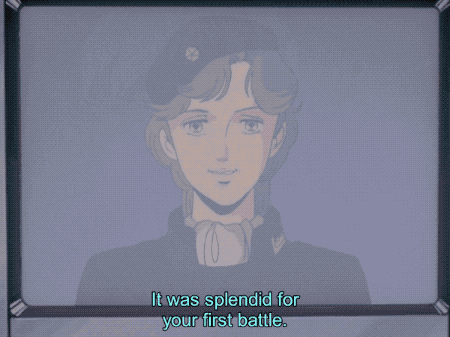
Julian’s main reaction to his promotion is to wonder how Yang will react; his pout shows that, doing a bit of Icebergs-style analysis himself, he reads between the lines of Frederica’s words to understand that Yang did not act pleased.
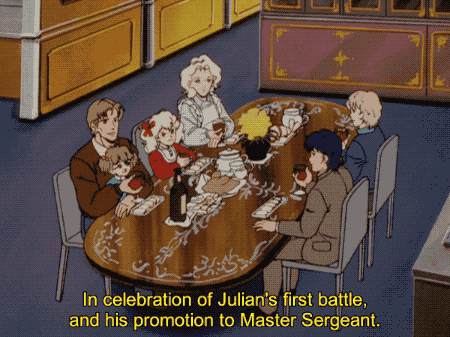
This tension is underscored again when Yang, rather than toasting to Julian’s promotion, toasts his safe return. Geez Yang, kinda passive aggressive.
This episode is all set-up, laying out clearly the main themes of Julian’s arc that will continue to develop through the season: 1) He’s awkwardly between child and adult—offered wine but unable to drink it smoothly; playing together with the girls but in a caretaker role; promoted for his heroics in battle but insecure about Yang’s reaction. And 2) his dynamic with Yang is evolving, with question marks about how exactly they’ll relate as he grows up and about how Yang will deal with the reality of his becoming a soldier.
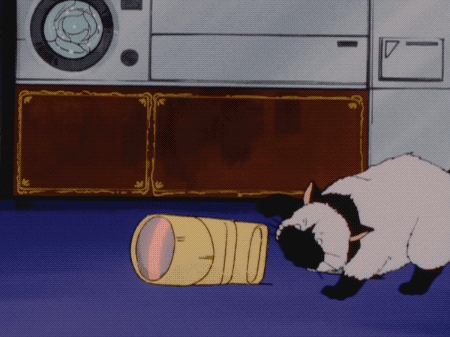
And of course, we’ll be keeping an eye on Gensui’s evolving dynamic with the Roomba as well.
Stray Tidbits
This breathtaking scene in which Hilda visits Kircheis’s grave is one of the first key signs of how seriously the show takes Reinhard’s grief and the hole that Kircheis left in his life going forward. Naturally we’ll be coming back to this moment in the future, so for now I’ll just say, god damn, I have chills.

Worldbuilding alert! Yang’s fleet may be currently stationed on Iserlohn, but lest we forget that it was originally constructed by the Empire, the incredibly fancy paneling of the living quarters is here to remind us. The animators really live and breathe this world and it shows in these details.
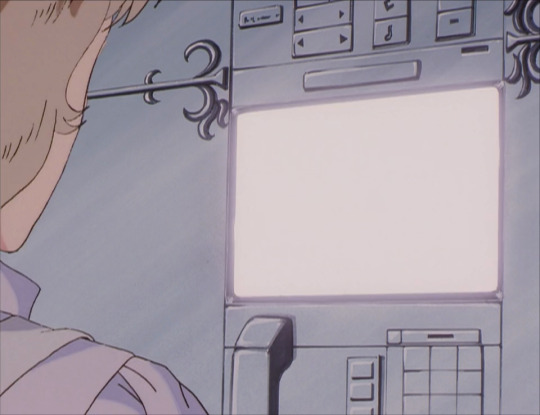
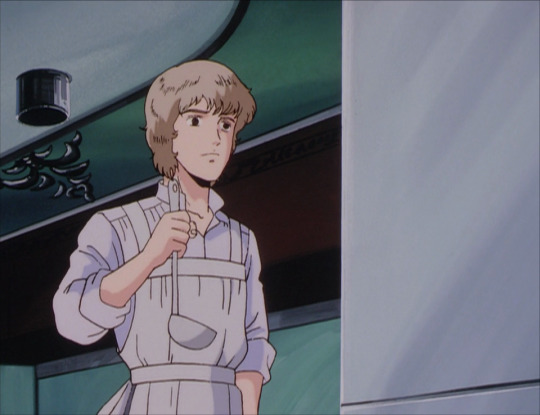
I’d be off-brand if I didn’t comment on Hortence Cazellnu finally getting more than a few frames of screen time; but other than being a cheerful hostess and more or less actually knowing how to hold a wine glass (unlike anyone else at the table—I made fun of Julian but in fact he’s just imitating Yang and Cazellnu!), she remains an enigma. Patience, the Hortence Discourse will come.

And then there’s Phezzan, back on its anime bullshit... Seriously wtf is this guy and what’s wrong with his eyes?? I’m scared.
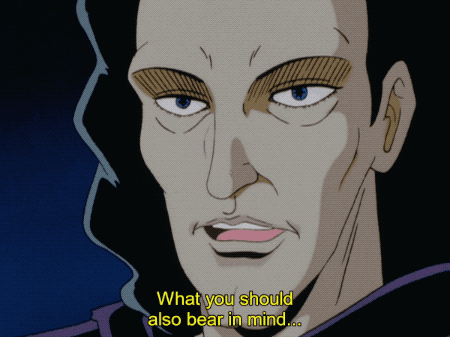
#Legend of Galactic Heroes#Legend of the Galactic Heroes#author:Rebecca#Alliance#Yang#Cazellnu#Hortence#Charlotte#Demon Child#seriously what is her name#Gensui#Julian#gender#heteronormativity#marriage#translation#dammit Sue#dammit Cazellnu
19 notes
·
View notes
Text
Episode 28: Portraits

January 798/489. Reinhard continues to alienate everyone around him (except the emotionally impervious Oberstein) while making small but radical hires and promotions. Head of Science and Technology Admiral Schaft emerges from his lab to suggest a plan to take back Iserlohn that’s So Crazy It Just Might Work: warping the entirety of Geiersburg Fortress to the Iserlohn Corridor. Reinhard is into it, so preparations commence. Meanwhile, Oberstein finds non-human companionship, the admirals talk shit, and Reuental and Mittermeyer finally get origin stories of their very own.
The Twin Stars

(From My Conquest.)
It’s been a while since I discussed Reuental and Mittermeyer, our secondary Empire-side heroes, in detail—and the last time I did, it was with the specific note that a huge chunk of data was missing: any backstory whatsoever for either of them. Thankfully, episode 28 is here to save us from a lifetime of analyzing Reuental and Mittermeyer’s interactions without context! Okay maybe it’s just me who would be doing that, but still. We should all be grateful for season 2’s commitment to wasting no time in confirming that there’s still a living, breathing, evolving gay couple making waves in the Imperial military.
The bulk of episode 28 is dedicated to a series of flashbacks that finally give us some concrete information about the previously enigmatic Reuental and Mittermeyer, also known as the Twin Stars of the Empire. With Kircheis gone, the narrator explains, Reuental and Mittermeyer have gained recognition as Reinhard’s highest ranking, most talented admirals. And, as the focus of the Empire’s military has shifted to them, so has the focus of Empire-side LoGH, in particular as it relates to queerness.
From the beginning, we’ve said that Icebergs won’t just be about the existence of queerness in LoGH, but will focus specifically on how LoGH shines a light on and criticizes the ways in which heteronormativity affects a society and its inhabitants. The only overtly queer couple we’ve spent any time with in season 1, however, was Reinhard and Kircheis, whose struggles with heteronormativity and homophobia were briefly hinted at, but never figured centrally into their characterization or narrative arc. Reuental and Mittermeyer, on the other hand, struggle with society’s heteronormative pressures in ways that play a large role in all the relationships in their lives.
Conflict, Family, and Perspective
In this post, I’ll be talking a lot more about Mittermeyer’s portion of the flashbacks than Reuental’s, for a few reasons. First of all, I’ve watched all of LoGH already so I know I’m going to have tons of future opportunities to delve into Reuental’s upbringing, and I plan to do so. Frequently. Second of all and more importantly to this post, while Reuental’s flashback is fairly straightforward, Mittermeyer’s requires much more digging to get to the bottom of what’s really going on.
This is a reflection of the families depicted: Reuental’s is overtly, explicitly abusive; Mittermeyer’s hides its difficulties behind a happy—even idyllic—veneer.


Above on the left, an adorable and tiny Mittermeyer plays with blocks while his father lectures him about how important it is to adhere to societal constraints (ah, youth!). LoGH’s ubiquitous narrator then informs us that Mittermeyer goes against his father’s advice, choosing to pursue a career in the military instead of a craft or trade. On the right, Reuental, without help from the narrator, describes his mother’s irrational conclusion that his heterochromia is somehow a result of her extramarital affair. Though nowhere near each other in terms of degree or tenor, these anecdotes situate both Reuental and Mittermeyer as in conflict with their parents’ expectations, right from the beginning.


In this next pair of clips, instead of being told about parental opposition, we see it directly—albeit, again, with drastically different levels of severity. On the left, Mittermeyer’s mother’s face falls dramatically when he fails to respond with sufficient enthusiasm to her compliments about Eva (much more on this shortly). On the right, Reuental’s mother, well, attempts to gouge out his offending eye before she’s stopped by a servant.


Finally, we have Reuental and Mittermeyer’s respective fathers, who both suck. We already saw Mittermeyer’s father rush to shoehorn his toddler son into society’s strictures, and now we get to see him, above left, insult his adult son for not proposing correctly, or something. (We’ll get into that in much greater depth soon.) Reuental’s father, meanwhile, like everything in Reuental’s life, is more obviously damaging than Mittermeyer’s. While Reuental’s father screams at his son to his face, Mittermeyer’s father yells from behind a pane of glass—just as Reuental’s mother attacked him while Mittermeyer’s mother grimaced at his retreating back; just as Reuental told us the conditions of his early childhood himself while Mittermeyer’s were recounted by the narrator.
When you add up all these details, a clear picture begins to emerge—not just of the similarities and differences between Reuental and Mittermeyer’s childhoods, but also of how they themselves have responded to and processed their personal histories. Reuental has had, for better or worse, unrestricted access to the trauma inflicted on him by his parents, enabling him to exert control over his own narrative.
Mittermeyer was also raised in a harmful environment, but it was one that thrived on the appearance of happiness and goodness. Negativity was kept diligently just out of sight (as Mittermeyer’s flashback shows us literally), so that only its effects lingered, exerting pressure obliquely but persistently. Mittermeyer’s parents, unlike Reuental’s, not only had plausible deniability for however their attitudes negatively affected Mittermeyer, but may not even have known they were doing anything that might cause harm.
And this is, I think, the most important difference between Reuental and Mittermeyer as characters: Reuental has known from birth that his parents thought there was something wrong with him, and as a result he has spent his life railing against what he feels they represented in society (we’ll learn more about this in future episodes, but you’ll just have to take my word for it at the moment). Mittermeyer, on the other hand, remains unaware of the tension that permeated his home growing up, and has spent his life trying to be what he thinks his parents want.
We know what Reuental’s parents’ problem was with him: His eyes were two different colors, dubiously indicating that he was the product of an illicit affair. (Okay there’s more to it than that, just be patient!) But what kept Mittermeyer from fitting neatly into his societal role, like his parents wanted?
Eva

You might (but probably don’t) recognize Eva from when Mittermeyer writes her a letter at the end of My Conquest. Yes, Eva becomes Mittermeyer’s wife, which is why I’ll be talking about her primarily as a potential love interest, rather than a family member. Technically, though, she’s both.
Because Mittermeyer’s flashback begins (first gif in the previous section) with his parents’ displeasure ostensibly about him joining the military, you’d be forgiven for assuming that the tension running through the rest of Mittermeyer’s backstory would be about his career. The narrator certainly frames it that way, though it’s unclear as to why joining the military would, on its face, be such a rebellious choice. In any case, it turns out to be a red herring and is never mentioned again. Mittermeyer’s parents are, in fact, anxious about his inability or unwillingness to go along with their plans for him, but whichever historian is currently embodying the voice of the narrator got it wrong: Their problem isn’t with his career, it’s with his sexuality.
We’ve spoken before about how LoGH occasionally uses awkwardness and discomfort as a way of subverting heteroromantic storytelling clichés: Because traditionally romantic narratives often conflate awkwardness and attraction, depicting characters as uncomfortable in heteroromantic situations is a reliable way to fool homophobic, heteronormative audiences into thinking they’re watching a straight character—when actually that character’s discomfort is genuine. In other words: they’re queer. The first third of Mittermeyer’s flashback, in which we (and he) first meet Eva, is a master class in using social awkwardness simultaneously as code (for queer viewers) and mask (for homophobic viewers).
So let’s talk about Eva, the newest member of Mittermeyer’s household. We never really learn anything about her besides the fact that she’s a war orphan who is distantly related to Mittermeyer somehow; she doesn’t even get her own last name. This portion of Mittermeyer’s flashback is obviously about his relationship with Eva, but especially considering the fact that we know they end up married, the story we’re being told here is startlingly unromantic.

Tfw your parents blindside you by adopting a distant relative and not telling you about it.
Mittermeyer’s relationship with Eva is characterized, right from the beginning, by a lack of enthusiasm. His first reaction to her, in fact, is what inspires his mother’s exaggeratedly disapproving gaze that I talked about earlier, and will now address again, in greater detail:
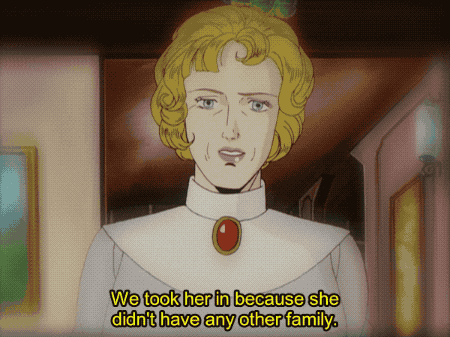
Here, Mittermeyer’s mother compliments Eva and coaxes Mittermeyer to agree with her; Mittermeyer, however, returns only a pronounced lack of interest before making his way quickly and unceremoniously out of the room. His mother’s face morphs into basically the tragedy mask as soon as she’s out of Mittermeyer’s line of sight.
Eva is 12 in this scene, while Mittermeyer is 17, never mind the fact that they’re related—she doesn’t fit as a normative love interest for him, even if we assume (for a second) that he is attracted to women. So why is Mittermeyer’s mother so distraught over his choice to refrain from lavishing Eva with praise? Well, given the relatively minor nature of Mittermeyer’s offense here, for his mother to look so miserable about his negative reaction likely indicates that she feels it’s symptomatic of something else, something bigger.
Mittermeyer’s mother is probably concerned with a more generalized lack of enthusiasm on Mittermeyer’s part—a concern that I suspect isn’t unrelated to the narrator’s claim that his parents were upset about his dreams of success in the military, which in the Empire is 100% male. With Eva, Mittermeyer’s mother may even have perversely thought the pseudo-adoption would kill two birds with one stone: Save a girl from orphanhood, and finally prod Mittermeyer into showing interest in a girl.
Sadly for everyone involved, that isn’t actually how anything works, and as Mittermeyer’s flashback moves forward, his attitude towards Eva stays exactly the same:
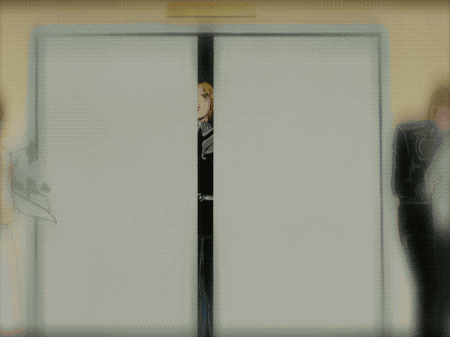
Mittermeyer, if you lean back when someone is jumping on you like that, you’re going to fall over backwards and hurt yourself.
Above, we have some more dramatically negative body language, this time from Mittermeyer himself, a few years later. As Eva runs towards Mittermeyer to embrace him, he first stares at her as if bewildered, and then (when it becomes clear she’s about to throw her arms around him) leans back and away from her. His expression changes from one of confusion to alarm, and his left hand (the one not holding a bag) hangs uncertainly in the space next to Eva, not returning her gesture. Incidentally, Mittermeyer’s near-overbalancing here neatly contrasts with the visual symmetry that we’re used to seeing from his onscreen interactions with Reuental.
So we’ve now seen Mittermeyer both ignore Eva and physically recoil from her. We haven’t seen any affection between them, at least not coming from Mittermeyer; even in the idyllic family scene below, which I’ll touch on in a moment, Mittermeyer is facing towards his father rather than towards Eva. It would have been easy enough for the animation team to show us a romantic relationship gradually developing between Mittermeyer and his eventual wife, but instead of choosing to showcase tender moments of connection between them, we’re shown only the opposite.
Hearth and Home
And now a brief pause for some, ahem, fireside chat. You’ve probably noticed the repetitive fireplace imagery ever since we began our journey into Mittermeyer’s past; it’s honestly pretty hard to miss:
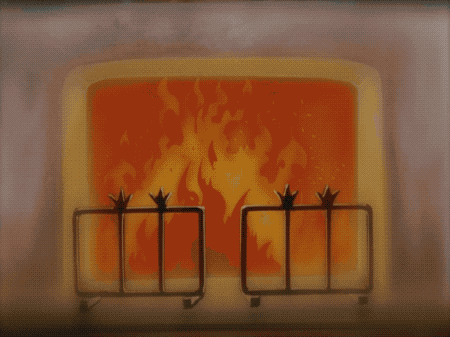
Five of these tight shots of a fireplace break up the first third of Mittermeyer’s flashback, almost like chapter dividers. Here, as well as in the early childhood scene (above), we also see the fireplace in context, in Mittermeyer’s family home. So that’s seven fireplace images in total. It’s a lot.
The fireplace itself, or hearth as it’s often known in its more symbolic capacity, is easy shorthand for home and family, and in particular for traditional family—like in the tableau that the Mittermeyers present above, so picture-perfect it approaches cliché. The constancy of hearth imagery throughout this portion of the flashback shows just how formative the idea of a stable home is to Mittermeyer. Even into his early military career, the hearth follows him, an unchanging symbol of the life towards which he is being ushered.
And just as significant as the hearth’s steadfast presence is its sudden absence: because that traditional symbol of family and home, so persistent throughout Mittermeyer’s youth and into his young adulthood, falls to the wayside once he meets Reuental.
Reuental

Never forget that on the fateful night when Reuental walked into his life, Mittermeyer was on a date with another guy.
Back in episode 20, I talked at great length about how Reuental and Mittermeyer’s relationship, for the most part, has been conveyed to us via their physicality and their synchronization (physical and otherwise). This scene, in which the two men meet for the first time, contains no dialogue; the entire encounter is communicated through looks, body language, and (for the audience) music. Reuental and Mittermeyer, apparently, have been connected this way since the moment they met.
As soon as our last transitional fireplace fades away, we are immediately greeted by the sounds of a body slamming against a table and glass shattering. There’s no music while Mittermeyer stands up and walks over to help the guy who just went flying. But as it becomes clear what’s going on—a superior officer is picking on a younger, lower-ranking soldier—heroic music begins to build, peaking just in time for the officer in question to try and throw a punch at Mittermeyer, unsuccessfully:

Reuental really looks handsome as hell in this whole sequence. I mean damn. Who among us wouldn’t be inspired to leave behind the comforts of heteronormativity for that face?
The knight in shining armor who has just come to Mittermeyer’s rescue is, of course, his future “best friend,” Reuental. There’s nothing platonic about this scene, though; it is, in fact, one of the most unambiguously romantic scenes in the show so far. After subduing the overly aggressive officer, Reuental walks over to stand shoulder-to-shoulder with Mittermeyer, who watches him with an expression not dissimilar to the one he wore in the scene previous, when Eva started running towards him. Unlike his response to Eva’s hug, however, when Reuental slides his eyes over to Mittermeyer with a look that can only be described as “seductive,” Mittermeyer takes just a second before his face breaks into a broad smile:

Reuental and Mittermeyer’s eyes meeting for the first time while dramatic music swells is truly an iconically gay moment in LoGH and really all of anime—when I first saw this, I burst out laughing because I couldn’t believe how explicitly romantic it was. Also, I was on a plane, and probably disturbed whoever was seated next to me with my squealing. Apologies.
This is the first time we’ve seen Mittermeyer smile since right before he met Eva, and it’s an expression that barely leaves his face for the duration of the scene:
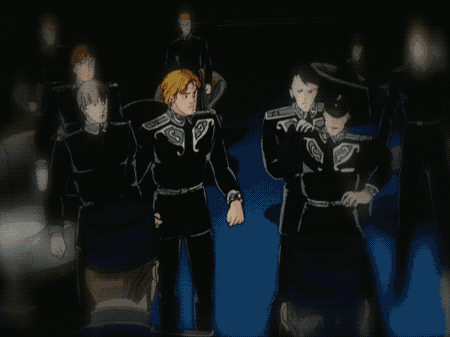
It’s almost unnecessary to point out just how gracefully Reuental and Mittermeyer move together during this fight, but I’m going to do it anyway, because this scene is like a beautifully choreographed dance, and I love it.
Above, all the principles of balance, equality, and symmetry that are integral to LoGH’s depiction of Reuental and Mittermeyer are on full display: Reuental makes first contact against the corrupt officers, and just when it looks like one is about to get a punch in on him, Mittermeyer—still grinning, by the way—grabs the offending officer and keeps him from following Reuental offscreen. For those keeping score, Reuental and Mittermeyer have now each intervened on the other’s behalf once. Have I mentioned they’re equals?
They end up standing back to back and, again without speaking, lock eyes over their shoulders. The camera zooms in on them one by one as they hold a long, intense gaze: Reuental’s face moves towards the bottom left corner of the screen, while Mittermeyer’s moves towards the bottom right, giving the effect of them being drawn to one another, magnetically.
It’s hard to overstate the contrast between Mittermeyer’s assertive, dynamic physicality in this scene, and his distant standoffishness towards Eva throughout the first third of his flashback. This isn’t just the first time since he was a toddler that we’ve seen him smile, it’s also the first time we’ve seen him take any physical initiative whatsoever. Until Mittermeyer meets Reuental, his actions have all been to lean away, or turn away, or walk away. With Reuental, on the other hand, Mittermeyer doesn’t simply move toward him: He moves with him, and around him, and—in the case of saving Reuental from officers about to kick his ass—for him.
Even with no greater context, Reuental and Mittermeyer’s meet-cute would be remarkable for how unabashedly gay it is—if one of them were a woman, in fact, this scene would be pretty romantically clichéd, what with its use of the dramatic rescue and “eyes meeting in a crowded room” tropes. (Thankfully, their queerness saves our heroes from being stereotypes.) But placed up against the first portion of Mittermeyer’s flashback, the bar fight scene is even more striking for the clarity with which it gets its point across: Mittermeyer is gay. And he’s just fallen In Love At First Sight with none other than Reuental.
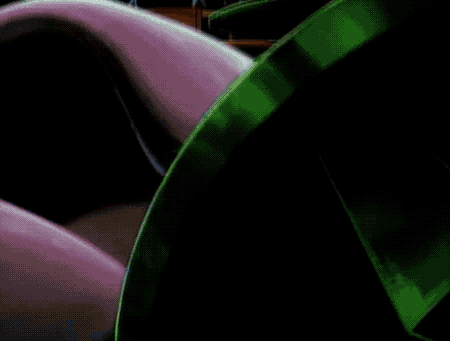
Tell me the look Mittermeyer gives Reuental here isn’t almost identical to the bedroom eyes Reuental gave him at the beginning of the fight.
Above, after being briefly reprimanded by an exasperated superior officer, Reuental and Mittermeyer return to the same bar (or I guess they could have destroyed another bar? I wouldn’t put it past them) to have their first ever drink together. Mittermeyer, adorably bandaged, smiles. And the rest would be history—if not for heteronormativity, a force that is strong enough, at least, to hold its own against love.
Reuental/Mittermeyer/Eva
It’s been a while since we’ve had reason to dive deep into LoGH love triangle discourse, so you might want to brush up on it before reading on—because the love triangle with Mittermeyer at the central vertex, which I’ll refer to as Reuental/Mittermeyer/Eva, is a doozy. In this last third of Mittermeyer’s flashback, the puzzle pieces that have been set up during the first two thirds finally come together, and the results will have a cascading effect throughout the rest (yes the entirety) of LoGH, not just on Reuental and Mittermeyer, but also on the Empire as a whole.
Choices

Three years after he first met Reuental, we reunite (sans fireplace transition, of course) with a deeply contemplative Mittermeyer, walking alone down a city street—a street that just so happens to be swarming with heterosexual couples. Observe:


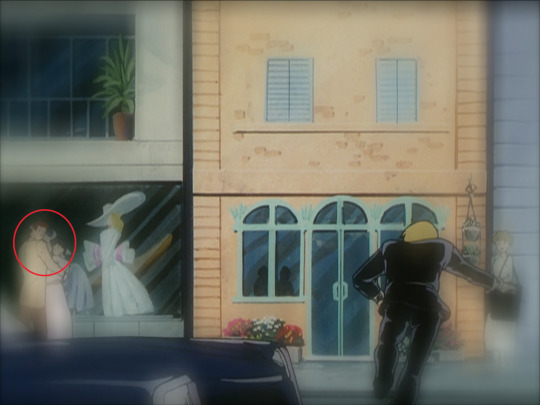

Like the earlier hearth imagery, the couples here are laid on a little thick—all four above appear during just a few total seconds of street footage—indicating that there’s probably something more intentional about these particular NPCs than the usual background filler. Heterosexual couples, again like the hearth, represent a fundamental piece of the life Mittermeyer was raised to expect for himself. In a way, they’re an evolved version of Mittermeyer’s childhood fireplace: Now that he’s an adult (he’s 24 at this point), the stability and comfort of a traditional family is more than just a symbol; it’s an imperative. If Mittermeyer wants to lead a life that fits into society’s “tightly framed social structure,” as his father put it, he has to act sooner rather than later. And at this moment, the necessary step he has to take is marriage.
So back to Mittermeyer’s sad street-wandering. Seemingly struck by sudden inspiration, he spots a flower shop across the street and runs into it, nearly getting hit by several cars:

Interestingly, Yukio Mishima’s 1951 novel about a gay man who marries a woman, Forbidden Colors (禁色), has a scene just like this one, in which the hero carefully avoids getting hit by cars as he rushes across the street towards a flower shop. Idk if this is an intentional reference or an eerily specific coincidence, but I’ve learned not to underestimate LoGH. Anyway, if you’re interested in modern Japanese queer history, read Forbidden Colors.
After aggressively shouldering another customer out of his way, Mittermeyer asks the clerk to suggest some flowers. The clerk points to a pile of roses, divided in two—one half red, the other half yellow:

And now for a short detour into what I’m sure you were expecting to read about when you clicked onto this blog today, Victorian flower language! LoGH, especially on the Empire side, is filled with flowers of various kinds, but for a while it didn’t occur to me to look up what the flowers meant, because I personally have never understood or particularly cared about flowers. Oops. It wasn’t until episode 87, in which Mittermeyer’s choice of proposal flower—he goes with the yellow roses—is mentioned specifically, that I realized it might be important, and maybe I should do some research. So I did.
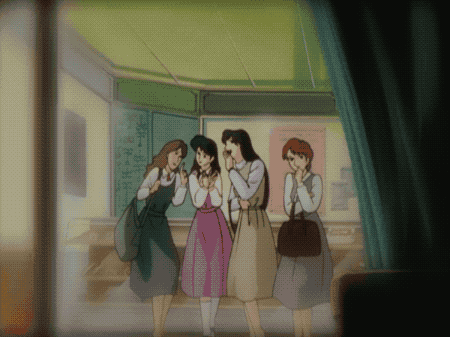
Why are these girls giggling at the perfectly normal sight of a young man carrying flowers? Well, it might have something to do with the fact that yellow roses carry a distinctly unromantic connotation—not that Mittermeyer is aware of this at the time.
These days, yellow roses are generally thought to mean friendship and “platonic love without the romantic subtext of other colors,” which would already be a weird choice for a marriage proposal. But traditionally, yellow roses have had an even less sentimental meaning: Infidelity.
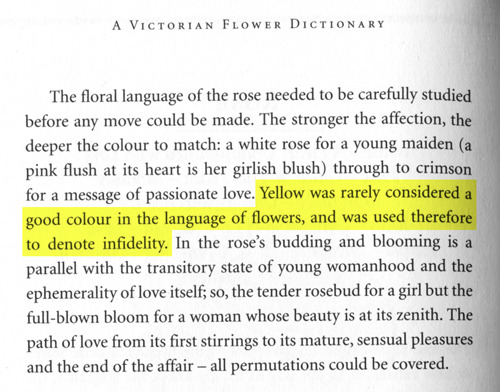
From A Victorian Flower Dictionary: The Language of Flowers Companion by Mandy Kirkby
In fact, if you look at a number of different Victorian flower dictionaries that were in circulation when this particular code of communication was at its peak, you’ll find that the meaning of yellow roses was one of the most consistent:

From The Language of Flowers: A History by Beverly Seaton
Of course Mittermeyer wouldn’t intentionally propose to Eva with a bouquet that basically says “I’m cheating on you.” (Or, more charitably but less likely, a bouquet that says “I want to be in a platonic non-romantic friendship marriage with you.”) It’s actually specified later on in LoGH that Mittermeyer isn’t familiar with flower meanings, so we know for sure that he isn’t that much of a dick. But from that, we also know for sure that the creators of LoGH are well-versed in flower language. So though Mittermeyer might be unaware of the implications, his choice of yellow roses over red roses—which traditionally mean either beauty or romantic love—still serves as a signal to the viewer.
Unlike most of the coding we’ve talked about, there’s nothing inherently queer about infidelity or flowers. But there’s no doubt that the particular infidelity Mittermeyer is unconsciously referencing here is queer; given the structure and content of this flashback, he’s obviously romantically involved with Reuental at the time of his proposal to Eva. And his choice of yellow roses, even if he doesn’t know it, subtly tells the viewer that he has no intention of ending that relationship.
A Very LoGH Marriage Proposal
After deciding not to buy an engagement ring, Mittermeyer arrives in his family’s yard, where Eva is hard at work, um, rubbing the grass:

Does anyone here know how to garden? I don’t, and I’m pretty sure the animators didn’t either, because this is definitely not a thing.
Mittermeyer presents his problematically symbolic gifts to Eva, but after all that buildup, we don’t actually get to hear him propose. Instead, almost as soon as Mittermeyer opens his mouth to speak, the soundtrack drops out and the camera cuts away. While Mittermeyer silently gesticulates, we’re stuck in claustrophobically close quarters with... his dad?

Yes: Apparently, Mittermeyer’s father is watching and judging him from inside a greenhouse, visibly and audibly frustrated with the amount of time and awkwardness it’s taking his son to seal the deal with Eva. I hate Mittermeyer’s dad.
In a typical (hetero) marriage proposal scene, the suspense and emotional payoff are tied to the man proposing, the woman being proposed to, or both. Will he propose? Will she say yes? Will these two crazy kids embark on the next phase of heteronormative life together? In this scene, on the other hand, the proposal itself is deemphasized in favor of Mittermeyer’s father’s feelings about the proposal. Not only do we not see or hear the proposal directly, we’re also forced to process it through an extremely biased third party.
The creative decision to grant us limited access to Mittermeyer’s proposal confirms that, just like how the first third of his flashback was not about him falling in love with Eva, his proposal is not about the romantic love between two people. Mittermeyer’s father opened the flashback by advising Mittermeyer on how to fit into society, and he’s back now, literally with a pair of pruning shears, to see that his son doesn’t step out of line.
But while every interaction between Mittermeyer and his parents throughout this flashback does tell us that they want him to adhere to the status quo, they’re only one (prominent) facet of the societal pressure that has led Mittermeyer to this point. When you add them together with the less literal but still insistent hearth imagery, as well as the aforementioned swarm of background couples, the resulting emotional landscape should be familiar to any gay person who has ever ended up in an inadvisable hetero partnership. Why is Mittermeyer proposing to Eva despite 1. not being in love with her and 2. being in love with someone else? Because everything in his life is telling him—has always told him—that he’s supposed to.
Eva does eventually say yes to whatever Mittermeyer asked her, and he throws his arms around his new fiancée, studiously facing away from her while they embrace:
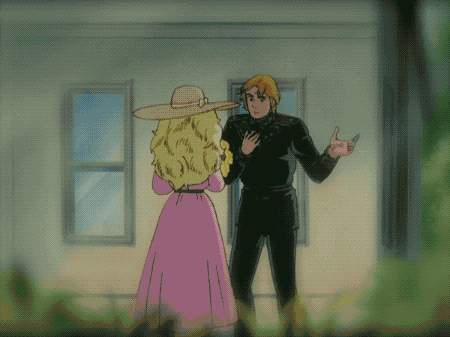
These poor children.
Finally, Mittermeyer and Eva kiss, and as Mittermeyer’s father shouts his approval and waves around his pruning shears, yellow rose petals fall around the new couple, filling the screen.
Reuental at the Wedding
Just like we don’t hear Mittermeyer propose, we also don’t see him get married—though we do get to attend his wedding. Eventually. By the time we get there, the ceremony has already taken place. Luckily, we’re not here to see a wedding; we’re here to see someone crash a wedding:

I’m really impressed with Reuental’s ability to walk in a straight line here given that he is probably drunk off his entire ass. Also: He continues to look great. Good job keeping it together, Reuental.
Again we’re granted selective access to what would, in a typical heteronormative narrative, be a central plot and characterization point for the newly wedded couple. And again it’s because this isn’t a story about a couple falling in love and getting married—it’s a story about society pushing a couple to get married for reasons other than love, and the effects that has on everyone involved. Evidently, Mittermeyer and Eva’s marriage affects Reuental deeply enough that he is moved to interrupt their wedding and make it about him. More importantly, LoGH’s creative team was also moved to make it about Reuental, telling us that he’s not wrong: Reuental’s reaction to Mittermeyer’s wedding is at least as important as the wedding itself—and to the story LoGH is telling, it’s far more important.
As for what Reuental actually does at Mittermeyer’s wedding, and why he does it, there are a few different interpretations, most of which aren’t mutually exclusive. It’s the ambiguity of Reuental’s actions, in fact, that both allows him to get away with such a brazen display of intimate involvement, and allows the show’s creators to get away with a wedding scene that focuses not on the heterosexual couple getting married, but on the groom’s spurned male lover.
In any case, let’s delve into a few possibilities as to what Reuental’s grand, theatrically chivalrous, possibly ironic, definitely bitter gesture means:
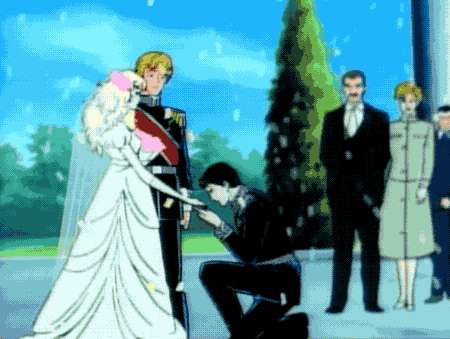
After stone-facedly marching up to Mittermeyer and Eva, Reuental gets down on one knee, kisses Eva’s hand, and then immediately turns on his heel and marches away. Mittermeyer looks at Eva as if to say, “This guy! Am I right?” And I personally dig my fingernails into my palms and grind my teeth to dust.
The first potential meaning of Reuental’s gesture, that he kisses Eva’s hand to wholeheartedly show support for his “best friend’s” marriage, is the heteronormative surface reading, and as such is the only one that makes no contextual sense. Even apart from how thoroughly this interpretation goes against the entire emotional arc of Mittermeyer’s flashback, there’s another reason it’s illogical, which is that Reuental is clearly an interloper at this wedding. As he walks up to Mittermeyer and Eva, the attendees all gaze at him in shock and mutter to one another. Everything about Reuental’s presence is staged like something that wasn’t part of the day’s schedule. If Reuental were simply Mittermeyer’s best friend who unequivocally supported this union, why in the world couldn’t he have been Mittermeyer’s best man or something? There’s no satisfying answer to that besides “because that’s not what’s going on here,” so let’s move on to what is, in fact, going on here.
Reuental is probably, at least in part, attempting to reassure Mittermeyer that he isn’t going to protest his marriage in public, or humiliate him, or expose him. By making a show of “giving his blessing” in front of an audience, Reuental is telling Mittermeyer that, at least as far as the rest of the world is concerned, his official stance on the marriage is one of approval and support. His secret is safe with him.
That his gesture of choice is to kiss Eva’s hand gives it the dual benefit of also telling Eva not to be wary of his continued presence in Mittermeyer’s life. There’s no way of knowing how much Mittermeyer has told Eva about his sexual orientation—this could very well have been part of the reason for us not getting to hear his proposal speech earlier—but the yellow roses certainly encourage the viewer to see Mittermeyer and Reuental’s relationship as an illicit affair rather than something to which Eva is willingly turning a blind eye or even explicitly condoning. In any case, it’s not necessary for Eva to be aware of all the implications of Reuental’s extension of an olive branch here for it to be an effective gesture. And meanwhile, Mittermeyer can, again, be comforted in the knowledge that Reuental intends to be kind and solicitous to his wife.
Of course, this is Reuental, and as we’ll be seeing much more of throughout the rest of LoGH, almost nothing he says or does ever has just one meaning, or even just two or three. In addition to placating Mittermeyer and establishing positive contact with his wife, Reuental’s wedding-crashing hand-kiss also tells Mittermeyer that Reuental still considers himself of paramount importance in Mittermeyer’s life. The edge to his “approval” of Eva is the possessive implication that his approval is necessary at all; the cold, stoic affect with which he conveys this approval further suggests that in no way is Reuental happy about the situation, even if he’s arguably going through the motions of enthusiastically giving his blessing.
Just like we don’t know what Eva knows, we also don’t know what role, if any, Reuental had in Mittermeyer’s decision to marry. Was he consulted? Was he warned? Did he try to change his mind? That Reuental’s feelings on the matter are clearly complicated doesn’t answer any of those questions, but it does tell us that they’re questions worth asking. And that in itself, more than any definitive conclusion, is in the spirit of episode 28—an episode in which all the elements of a typical heteronormative story are presented and then systematically subverted, forcing a discerning audience to wonder why, and in so doing, to begin to understand.
But wait, there’s more!

Please don’t fall asleep just yet.
You may have noticed that I only talked about, like, five minutes of episode 28, and yet I’m about to end this very long post. Well, you’re right! But worry not: We here at Icebergs intend to leave no (queer) stone unturned.
As we advance further into LoGH, there will be some episodes—like this one—that are full to bursting with exactly the sort of material that makes a queer analysis of LoGH necessary. There will also be some episodes that... aren’t. And when the sparse Icebergs-relevant content in that second category of episode lines up thematically with leftover content from earlier, overstuffed episodes, the plan is to double back and tackle some of the earlier stuff we may have missed or skipped over. Then we’ll go back and put the relevant links in earlier posts so that you, Dear Reader, don’t get lost.
For example, when I inevitably do a deep dive into Reuental and Mittermeyer’s episode 28 drunken conversation in my post for episode 58, I’ll link to that here. Got it? Excellent.
Stray Tidbits
Just in time for the holiday season, episode 28 is here with an inspiring message for us all: If even Oberstein can find a friend, surely there must be hope for the rest of us!


The LoGH DVD redraws are back with more Reuental character assassination... I think? Below, on the left (LD version), Reuental’s brow softens as he remembers the trauma of his childhood, giving the impression of an increase in vulnerability. On the right (DVD), his brow hardens. Why did the remaster team take the exact same footage and reverse it? My guess (based on the other changes we’ve seen them make) is that an open, vulnerable Reuental didn’t align with their image of him. Which... is deeply frustrating. And wrong.


Is it me or was Schneider in Mittermeyer’s class at military academy? It’s not just me, right? In Episode 23, Merkatz does say that Schneider “isn't even 30 yet,” indicating that it’s totally possible he’s right around Mittermeyer’s age... Either way: It’s official Icebergs canon now. Mittermeyer and Schneider went to school together and you can’t tell me they didn’t.
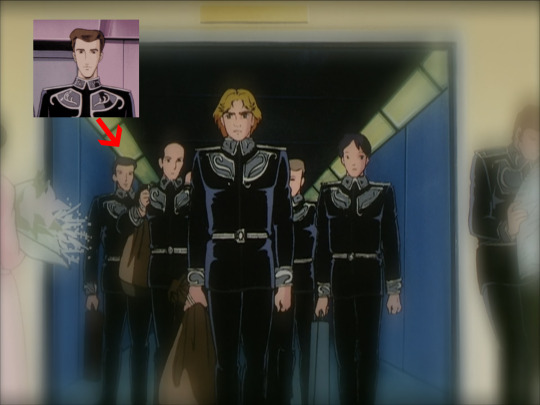
#Legend of Galactic Heroes#Legend of the Galactic Heroes#author: Elizabeth#Reuental#Mittermeyer#Oskar Meyer#Eva#Reuental/Mittermeyer/Eva#Reuental deserves better#heteronormativity#expectations#bad dads#bad moms#just bad parents ok#the language of flowers#love triangles#weddings#proposals
30 notes
·
View notes
Text
Episode 27: First Battle

January 798/489. The first season of Legend of Galactic Heroes is the prelude. With the opening of season two, the real first act begins; and it kicks off with an unplanned skirmish between an Imperial fleet and a training mission from Iserlohn. Not realizing that the forces they’ve encountered are mostly new recruits and trainees, the Imperial commander assumes that the cautious and uncoordinated movements of the enemy troops are a patented Yang Wenli Tactic™, and doesn’t attack very aggressively while trying to decipher the clever ruse. The delay gives the entire fleet of 10,000 ships that Yang mobilized from Iserlohn time to show up and say “boo,” scaring the Imperial troops away before the entire training mission is annihilated. During the short battle, Julian, who was there for training, manages to shoot down three Valkyries and a cruiser. Meanwhile on Odin, Reinhard negotiates political reforms, finances, and staffing from behind eyes as cold and empty as Oberstein’s.
Separation...

We’ve seen Julian separated from Yang before, but only in the context of Yang going off to have adventures while Julian is left behind watching wistfully after him.
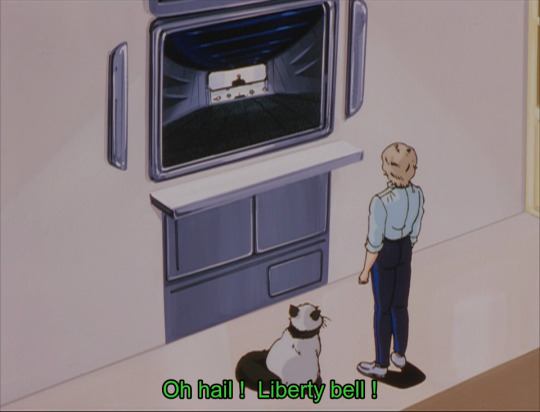
Left back at the house while Yang and Dusty fight the PKC...
(From episode 3.)

...Left on Heinessen while Yang sets out to capture Iserlohn...
(From episode 6.)

...And of course left alone in a back alley while Yang goes on a stroll with Jessica.
(From episode 10.)
In this episode, for the first time, it’s Julian who’s thrown into the middle of the action on his own, when an unexpected battle breaks out during a training mission. This feels like a kind of test run of the whole concept of Julian actually enlisting and going to war: For Julian, that means facing real split-second life-or-death decisions on his own for the first time, rather than just listening to Yang (or Poplan or Schenkopp or any of his other mentors) pontificate about tactics; for Yang, it means facing more tangibly than ever before the very real possibility that this war he’s been trying (unsuccessfully) to end will actually result in Julian’s life being cut short.
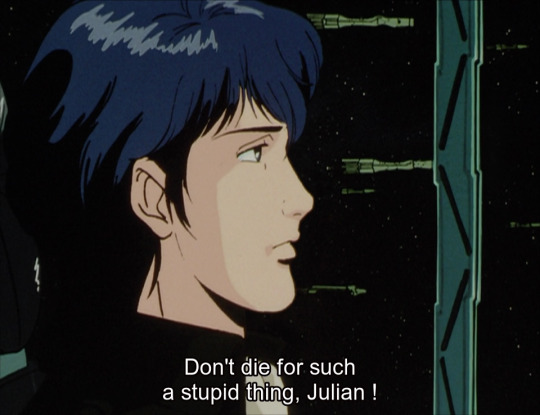
Yang may have any number of philosophical or moral objections to the continuation of the war and the role of the military in society, but there’s also a very simple reason he doesn’t want Julian to become a soldier.
The moment right before Julian launches into battle gives us the second ever departure from strict realism in LoGH’s cinematography, a glimpse into Julian’s mind where we find a snippet of memory (or imagination?) devoid of context: just himself and Yang, in blackness, talking about premonitions of death. With an emphatic shake of his head, Julian seems to physically force both his fear of death and thoughts of Yang out of his mind. For right now, he’s on his own.

...Okay did Julian have an emo phase no one told me about?
Julian, Alone

Icebergs readers would be forgiven for getting the impression that Julian is a main focus (if not the main focus) of the season one Alliance story, since I pretty much talked constantly about him all season. But of course that’s not true: Julian’s story so far has taken place in the periphery of the action, mostly via small gestures, body language, glances, smiles. This is the first time the narrative actually centers him, seeing the battle from his perspective and through his emotions.

Julian’s reaction to killing someone for the first time is intense but narratively understated. He’s overwhelmed, shaking; but this is what he signed up for, and still in the heat of battle he can’t spare time or emotional energy to dwell on it.

This moment is a) adorable, and b) a deft bit of commentary, with Julian chastising himself for almost shooting at an ally that flew into his path. Of course that’s how battle works: Killing the other guys is good; killing your guys is bad. In context Julian’s reaction makes perfect sense—it’s how he’s supposed to think—but I find it chilling.

His flashiest accomplishment is taking out a whole cruiser, which he does by having the presence of mind to hover right against the side of the ship to hide from its scope, and then use its own weapons to take it down. This was clever of him, but also lucky—more a result of right place/right time than incredible heroism or brilliant planning.

In this gorgeously directed sequence, the Spartanian mothership that Julian was anchored at is critically hit, and Julian just barely manages to launch before it explodes.

Once again the emotional difference between the deaths of allies and enemies is highlighted here. In a rage of grief over the deaths of the people he knew on his mothership, Julian shoots down the first Valkyrie he sees…

...when just shortly before he was almost killed himself by a Valkyrie pilot in exactly the same position, whose mothership he himself had just destroyed. Karma’s a bitch.
Phew. It’s an intense nine hours for Julian: His life is directly at risk for the first time—in fact he’s only saved from being shot down when Poplan picks off all three Valkyries that are going after him. He kills, albeit in an anonymous, impersonal way. He sees many people he knows and works with not return from this (meaningless, unplanned) battle. It’s a hell of a lot for a fifteen-year-old, and he both handles it well and is clearly struggling against feeling overwhelmed.

Aww. <3
Yang

Meanwhile back on Iserlohn, Yang confronts the possibility of Julian’s death in battle by—with the calm and composed air of an objective commander—promptly sending every available ship out as reinforcements.

I find Frederica’s forced optimism here actually quite irritating. Julian’s an untrained kid who should not be thrown into battle yet. “Don’t worry, he’s lucky!” is a meaningless thing to say, as Yang clearly knows.

Yang often uses the method of placing trust in someone to earn their loyalty, and this move is similar, but also serves a couple of other purposes: It lets him learn more about Merkatz’s tactical philosophy, and it also conveniently gives added justification to his plan to immediately mobilize the entire fleet and charge into battle. When the suggestion initially comes from Merkatz, no one can accuse Yang of acting rashly because Julian happens to be in danger.
I said this battle is a test run, and that’s how I feel Yang treats it for himself. He obviously cares about Julian a ton and doesn’t want him involved in the war; but Julian isn’t actually his child, or his family at all. The show has been a bit coy about the details of their official relationship so far (we’ll learn more soon), but the technical legal situation is basically that the government has paid Yang to put a roof over Julian’s head for a few years, and maybe teach him a bit about the ways of war while he’s at it, before Julian inevitably joins the military to pay the government back for putting him through school.

With Yang’s deep belief in self-determination, the coercive nature of this system for dealing with war orphans is among the reasons he’s opposed to Julian’s path—he doesn’t see it as really Julian’s own choice. Back in episode 3 he offered to take on Julian’s debt himself, but that suggestion wounded Julian’s pride.
(From episode 3.)
Their current arrangement, then, is fundamentally tenuous: The most probable outcome involves Julian eventually going to battle and being killed; and since that’s been true from the beginning, despite Yang’s grumblings, I think that Yang’s forced stoicism in this episode comes partly from feeling like it’s not quite his place to display too much parental protectiveness or emotional attachment.

Yang doesn’t ask after Julian’s safety even when they’ve scared the Imperial troops away and the battle is over, but he can’t quite hide either his bracing against bad news or his intense relief behind that cup of tea.
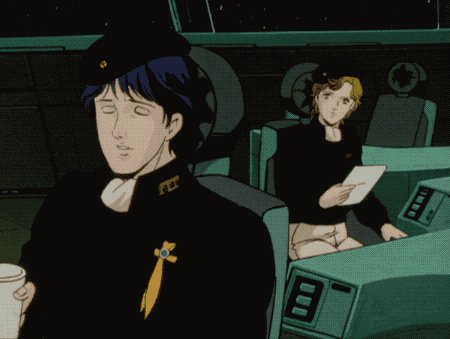
Yang in season one: “I hate soldiers.” “I don’t want Julian to go to war.” “I don’t want Julian to have to kill anyone.”
Yang in season two: “Holy crap he blew up a ship? All by himself?? Badass!!”
...I mean I guess if Julian *has* to be a soldier, he might as well be a good one, huh Yang?
...And Reunion

This is my favorite moment of the episode. Julian may have appointed himself Yang’s physical protector, but this time it’s Yang who appears like a knight in shining armor to rescue him. There’s so much relief, gratitude, and total emotional exhaustion in his laughter here.
The battle that began with Julian physically forcing Yang out of his thoughts ends with Yang’s fleet appearing on his radar screen just when the tide of battle was turning in the enemy’s favor. As a battle, it’s pretty anticlimactic and pointless. The scene that’s framed narratively as the climax of the episode isn’t the end of the battle, but rather Julian and Yang’s reunion.

Even though Julian just conducted himself admirably in battle and notched several kills, he is very much still a kid, as this shot emphasizes.

The reason everyone bursts into laughter here is that this little awkward display of scolding is so out of character, as well as factually inaccurate—I doubt Yang has ever bothered to tell Julian not to do dangerous things.
This awkwardness from Yang’s side is new—throughout season one he treated Julian with an easy, paternal-ish affection, praising him freely and ruffling his hair (a bit condescendingly) when he offered his own insights or boasted of his skills.


(From episodes 17 and 19.)
But the events of this episode are nothing if not symbolic of the fact that Julian’s in the process of growing up; and as Julian does grow up, it’s unclear exactly how they’re supposed to relate to each other—as parent/child? As family? As commander/soldier? As friends? I’ve already diagnosed Julian’s attachment to Yang as the early stages of a crush; and while I think Yang’s oblivious to that angle at this point, it also threatens to complicate their relationship going forward. This scene highlights the fact that, despite how close they are, there’s a tension that didn’t used to exist in the air between them; and if there’s one thing I can promise you it’s that we will be keeping an eye on that throughout the season.

Poplan and Konev!

Speaking of things to keep an eye on as we begin a new season, we also get to see more of Poplan and Konev during this battle: mentoring the trainees as they head off to fight; grumbling about the government; saving Julian’s ass; competing as always for the most kills.

I love this for two reasons. One, Konev is adorable—his syntax is funnier in Japanese, where he answers Poplan’s “dou iu imi da?” with a parallel “sou iu imi sa,” even making use of the emphatic particle sa to rhyme with the copula verb in Poplan’s sentence. (Literally the exchange is “What sort of meaning?” / “*That* sort of meaning.”) And two, this isn’t just random goofiness: They’re about to send kids into an unplanned and likely deadly battle, and banter like this has the effect of both encouraging and relaxing them.

Poplan plays up his cocky, goofball side to make the trainees laugh, but he also takes this battle and his job as their teacher very seriously…
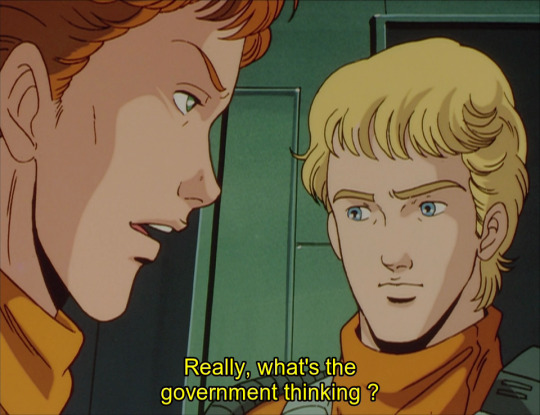
...and as soon as the trainees are gone so is his confidence, as he turns to complain to Konev about being forced to fight with inexperienced pilots who will be no match for Reinhard’s troops. Discussing/arguing about politics is one of the many facets of their relationship, as we’ll see more later on.

Three of those 22 kills of Poplan’s come right in a row, as he saves Julian’s life by cleanly picking off three Valkyries that are chasing him. Do not think for one second that Poplan is just a background comic relief character: Not only does he take his role as mentor to the younger soldiers seriously, but when he says he’s a genius at piloting, he’s absolutely correct.
...and Heteronormativity
I’ve mentioned that Poplan plays the role of one of the show’s mouthpieces of heteronormativity, specifically a version of masculinity that’s centered around (many, many) sexual relations with women, and in this episode we see that clearly for the first time.

This raised pinky gesture refers, in 20th century Japan at least, to a (man’s) girlfriend/wife/mistress; I assume the same meaning survived 1600 years into the future? Translation note: Poplan actually says “there are more interesting things than piloting that I have to teach you about”—highlighting not just the importance of Julian learning all about sleeping with women, but his own implied expertise in the matter. (The verb is 教えてやる, oshiete-yaru, to do the favor of teaching something to someone.)
This exchange comes right after Julian comments that he doesn’t want to die so young, and right before he flies back into battle. Poplan’s innuendo and picking a fight with Konev serve a similar purpose to his cocky boasting to the trainees before the battle began: lightening the mood away from a focus on possible impending death, in order to help Julian relax a bit before plunging back into the fight. The impulse is kind, but the content of Poplan’s teasing is miscalculated. Julian doesn’t react with laugher, but rather seems uncomfortable and unsure how to respond—turning away with raised eyebrows, and only smiling after Konev changes the subject back to the battle.
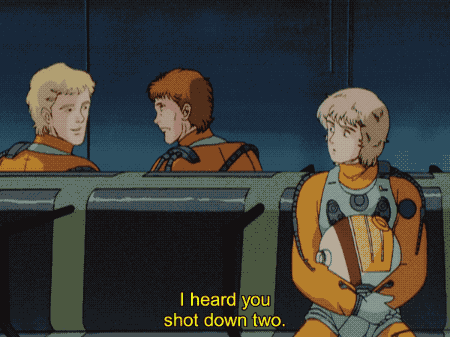
Note the easy intimacy of Konev pushing Poplan’s head away here; body language communicates a ton in this show, and Poplan and Konev routinely occupy each other’s personal space with a comfort that’s rare among all the friendships we see.
Whatever Poplan’s intention, the effect of his speech is still to present a view of masculinity tied to (hetero)sexual prowess, and Julian doesn’t seem to relate. But Poplan isn’t a solo act—and Konev’s role as the other half of the duo is key to the overall tone of the scene. Far from seeming to take any offense at Poplan’s insinuations about his preference for crossword puzzles over sleeping around, Konev nonchalantly ignores Poplan and changes the subject. By not defending himself or seeming at all self-conscious, he undermines whatever Poplan was about to say about the duties of men, treating it as irrelevant and not worth engaging with. Konev provides not only an alternative model of masculinity to what Poplan espouses, but also a good example of exactly how seriously to take Poplan’s bluster—namely not at all.
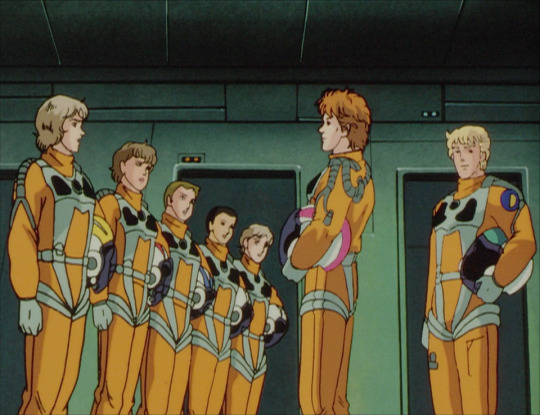
Unlike Poplan’s exaggerated machismo, Konev’s habit of standing in the background of scenes staring at someone with an unguarded, fond smile is something Julian definitely *can* relate to.
Konev...people can see you, you know.
Stray Tidbits
Reinhard has been busy over in the empire, enacting an impressive list of reforms, including freedom of the press, democratic constitutions (for local governments, I guess?), and...credit unions for farmers? Okie doke. Score one for benevolent dictatorship. The skill of both the animators and the voice acting in showing Reinhard’s utter heartbreak is so impressive; how can a few frames of animation convey the ice in someone’s soul this well?

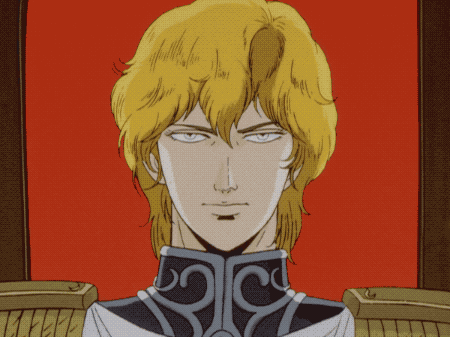
Speaking of the animators’ skill, I love this page from the production booklet that comes with the season two LaserDiscs showing the details of Julian’s Spartanian pilot uniform—which patches and decals go where, how everything connects, a closeup of the glove. The righthand page says “helmet markings for Julian” at the bottom and “for the main helmet design, see separate section” at the top, which I find adorable.

Dear Dusty, I know you were also really badass in this episode, and I promise sometime soon I will give you more space in a post than a few screenshots down in the tidbits section. <3



Daaamn, Yang is all prepared for the 798 Iserlohn pin up calendar. (Is that even a comfortable way to nap, Yang...??)

I’m so happy that the analogy sex:Poplan :: tea:Yang :: revenge:Oberstein is official LoGH canon.

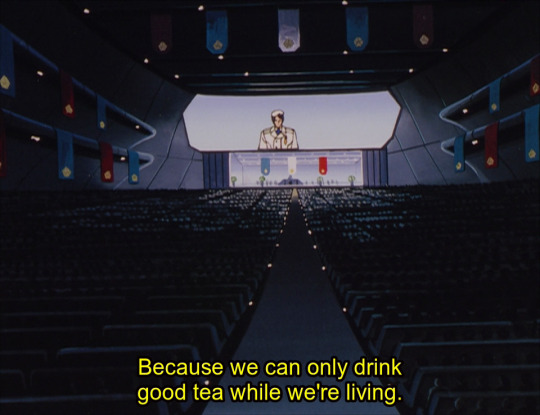

The casual LoGH viewer might believe that this is the first glimpse we get of any Imperial Valkyrie pilots, but we at Icebergs are here to disabuse the world of such shallow readings: In fact we saw a Valkyrie pilot way back in episode 2 (5:57, go watch it). We have dubbed him Heinrich. RIP Heinrich, we hardly knew ye.

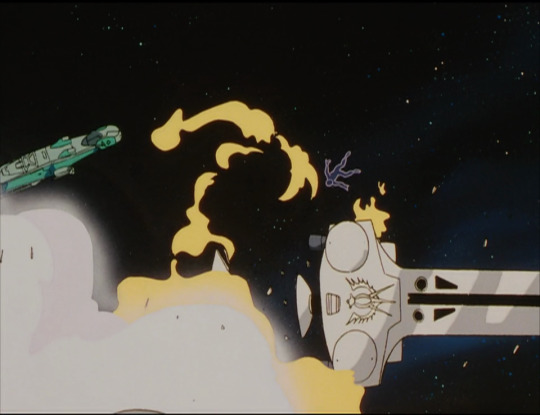
I can’t believe we’re already starting season two!! Thank you for journeying through a whole season with us, and buckle up—this show just gets better and better.

#Legend of Galactic Heroes#Legend of the Galactic Heroes#author: Rebecca#Alliance#Julian#badass!Julian#Yang#separation#reunion#battle#Poplan#Konev#heteronormativity#RIP Heinrich
20 notes
·
View notes
Text
Episode 26: Farewell, Distant Days
Dear Icebergs readers—as we’ve reached the first season finale of LoGH, we’ve inevitably arrived at some pretty serious spoilers, so if you haven’t already seen all of LoGH season one, I would advise against reading any further. Instead, you can find our FAQs here and our very first post here, and we hope to see you back here soon!
Everyone else: When you're ready, please proceed to our episode 26 post, below.
—the editors

September-October 797/488. Ansbach’s assassination attempt on Reinhard is thwarted by Kircheis—first by knocking his gun out of the way, and then by taking fire himself from yet another concealed weapon, this time in Ansbach’s ring. Ansbach shoots through Kircheis’s chest and neck, then bites a poison pill to commit suicide. Reinhard’s admirals scramble, but it’s too late to save Kircheis, who dies while Reinhard holds his hand and looks on in bewilderment. Beyond devastated, Reinhard shuts himself away with Kircheis’s body for days on end. Oberstein convinces the admirals to cast former ally Lichtenlade as a scapegoat for Ansbach’s crime, and, grateful for something to do, the entire fleet storms Odin. Meanwhile, Oberstein informs Annerose of Kircheis’s death, Reuental receives an unexpected invitation, and Reinhard hardens his heart.
Reinhard and Kircheis

The first time I watched episode 26 of Legend of Galactic Heroes, there was a moment when, literally sitting on the edge of my seat, I wondered if this show was about to disappoint me horribly. Kircheis was, clearly, dying. The admirals were fluttering around him trying and failing to stop the bleeding, giving up on leaving to go get a doctor—too quickly, it seemed. And where was Reinhard? Why wasn’t he there?
As a queer consumer of media, I’m used to this kind of disappointment. Seeing my experiences reflected onscreen at all remains rare, and when a piece of media does deign to include a queer character or two, more often than not they’re killed off unceremoniously in as homophobically moralizing a way as possible. The death scenes of queer characters tend to leave me with a sick feeling not because I’m grieving the character but because I hate that I’ve had to give up on expecting queer characters and their relationships to be given a fraction of the respect afforded their straight counterparts.
The first 25 episodes of LoGH had surprised me with their nuanced and respectful depiction of queerness, in particular of Reinhard and Kircheis’s relationship. But as a seasoned veteran of queer media consumption, as Kircheis bled out on the floor while Reinhard did who knows what across the room, I didn’t know how else to interpret what I was seeing other than “Kircheis is about to die alone.” My stomach hurt. And then, this happened:

Given that it’s animated, LoGH has so far been remarkable in its commitment to realism. Without exception, what has been shown to us onscreen has been presented as an accurate depiction of events; the closest to a diversion from that has been the show’s frequent use of flashbacks, but even those are always anchored to a specific character’s experience of remembering the past.
As Reinhard steps painstakingly down the stairs toward where Kircheis lays in a pool of his own blood, the creators of LoGH throw away their own established set of rules. What we are seeing is no longer what is literally happening; instead, we are with Reinhard—and for him, nothing in the world exists at that moment except Kircheis and himself. With this scene, the LoGH creative team show us that they will do whatever they have to in order to respect their characters: If there are too many people around for Reinhard and Kircheis to get the intimate last goodbyes they and their relationship deserve, well, everyone else will simply have to be removed.

Even the lack of voiceover accompanying Reinhard’s quick series of flashbacks here reinforces the extent to which reality has been skewed for the duration of this scene.
For me, this was when LoGH went from being a great show to being (as you may have noticed) my favorite show—and not just because of how kindly it treats its characters, even while they experience gut-wrenching tragedy. Kircheis’s death changes Reinhard and, as I’ll obviously be exploring at length as we move into season 2, that changes the entire landscape of the show. Though from the beginning it has always been deeply personal and human, especially for a war epic of such massive scale, the question of what Reinhard will do now, without Kircheis, turns LoGH psychologically dark in ways that have only been hinted at so far.
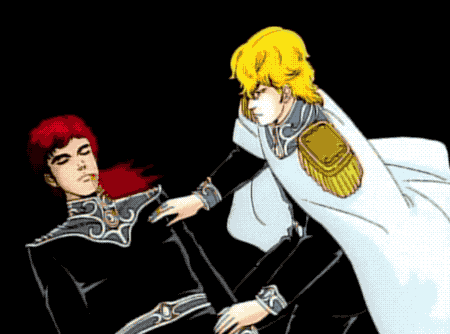

Back in episode 4, we were first introduced to Reinhard’s plan to gain enough power to rescue Annerose from the clutches of Kaiser Friedrich IV. Friedrich IV has since died of natural causes, freeing Annerose without Reinhard’s help. In episode 8, we learn that Reinhard’s ambitions extend to overthrowing the Goldenbaum empire, and then achieving supremacy over the entire universe—very specifically with Kircheis at his side. By the end of episode 26, Reinhard rules the empire in everything but name (the six-year-old Erwin Josef II still sits on the throne as Kaiser), but Kircheis is dead, rendering Reinhard’s longtime goal of joint conquest impossible.

For practical purposes, this barely matters: Above, Kircheis uses some of his last remaining energy to beg Reinhard to follow through with the plan they made together, in effect guaranteeing that he will continue on the same path after Kircheis dies. But in more abstract terms, both of Reinhard’s main reasons for seeking political power are now gone. And with a promise to the dead Kircheis as Reinhard’s driving force, Empire-side LoGH has suddenly become a very different show—one that is no longer about a man trying to conquer the universe, but is rather about a man searching for something to hold onto in a universe that, without Kircheis in it, seems to have very little to offer.

Annerose
But Reinhard shouldn’t feel entirely alone in the universe. After all, he has his sister, right? Well, not exactly. As Reinhard learns after Oberstein breaks the news of Kircheis’s death to Annerose (against Reinhard’s wishes), Annerose has decided now is the perfect time to do something really, really cruel: cut off contact with her grieving brother.
Reinhard’s Family
That the season 1 arc of Reinhard and Annerose’s relationship ends on a bad note is frankly an understatement, but to really dig into how things stand between them in episode 26, we must first get a handle on all the moving parts that brought them to this point.
Over the course of my season 1 posts, I’ve mapped out much of the dynamic between Reinhard and Annerose: Reinhard, who both idealizes and idolizes his sister, does so (unwittingly) at the expense of her personhood; Annerose, whose agency has been violently denied her since an early age, projects a portion of her (natural) resentment onto her brother, who moves freely about the universe steadily gaining power while her life remains stagnant. One aspect of their relationship that I haven’t examined, however, is the extent to which Annerose has played a parental role in Reinhard’s life.
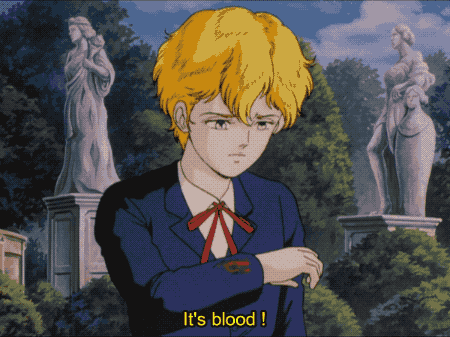
In this scene from the episode 4 flashback, Reinhard assigns to Annerose the kind of responsibility for his behavior that would ordinarily be reserved for a parent or guardian.

And then, after Reinhard and Kircheis have conspired to keep Reinhard’s misdeeds from his sister, Annerose puts their wet clothes in the laundry and dotes on them with hot chocolate and freshly baked pie. This is maybe the most archetypal depiction of motherhood I’ve ever seen, despite the fact that Annerose is both 1. actually Reinhard’s sister and 2. only five years his senior.
Reinhard’s father, who sold Annerose into sexual slavery at the age of fifteen, is obviously awful. And Reinhard’s mother, who hasn’t even ever been mentioned, clearly never had much of a presence in Reinhard’s life. Annerose is the only person (besides, eventually, Kircheis) we ever see taking responsibility and caring for Reinhard.
Reinhard’s family, as it is presented to us, is comprised of three people: himself, Annerose, and Kircheis. Though Kircheis is literally never (not once in all of LoGH!) referred to as being “like a brother” to Reinhard, their constant companionship since a young age means that their interactions often blur the line between surrogate-familial and romantic. The fact that Reinhard always brings Kircheis with him on visits to Annerose, for example, indicates that he at least views the three of them as a tight-knit unit.
But in Reinhard’s chosen family, there is a clear delineation of roles between Annerose and himself/Kircheis. In the gif above, Reinhard and Kircheis sit across the table from Annerose, who acts like a parent not just to Reinhard but to Kircheis as well; the difference in age and maturity between them is underlined by both Annerose’s matter-of-fact competence and Reinhard and Kircheis’s unashamed (and matching) nudity.

The photo that Kircheis gazes at in episode 25 (which eventually shows up in Reinhard’s locket, discussed later in this post) also draws a solid line between Annerose—who is more than a full head taller than the boys—and Reinhard/Kircheis. Kircheis’s sideways gaze at Reinhard serves to emphasize even further that they are a discrete pair.
Reinhard’s behavior towards Annerose starts to make more sense once you realize that he basically considers her his mother. Just as children tend not to understand—sometimes well into adulthood—that their parents are fully formed, flawed human beings with rich inner lives, so Reinhard has kept Annerose on a pedestal, treating her more like a symbol than a complex person. This also explains how Reinhard can, for example, be so blasé about teasing Kircheis in front of Annerose for his love of her cooking: Naïve as he is, the idea that Annerose might have feelings for Kircheis that go beyond platonic and motherly would never occur to Reinhard in a million years—unless something were to happen that brought Annerose’s feelings into stark relief.
Annerose Makes Up Her Mind
Which brings us back to the scene at hand, Kircheis’s death being the exact sort of cataclysmic event that might throw a wrench into Reinhard’s precarious relationship with his sister. And the second Annerose opens her mouth to speak, Reinhard knows something is wrong:
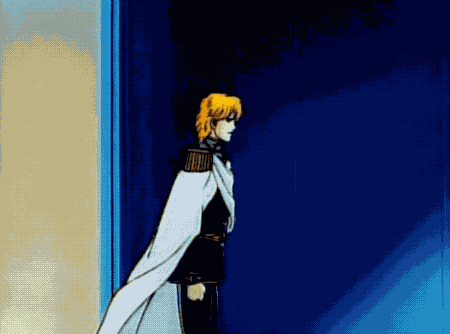
Annerose’s tone of voice here is as cold and distant as what she’s actually saying; rather than sharing in or sympathizing with Reinhard’s grief, she isolates him in it, trivializing his feelings of loss while also—by implying Kircheis was the only person Reinhard could ever care about losing—calling into question the authenticity of his devotion to her.
If Reinhard had been aware of all the little signs of Annerose’s resentment towards him that have been building up over the course of the last 25 episodes, this conversation might have gone differently—not because Annerose would have done a better job playing the part of the soothing sister/mother, but because Reinhard might not have been expecting her to. But Reinhard is naïve, especially about Annerose, so her abrupt switch from passive aggression (which Reinhard of course never picked up on) to overt hostility shocks Reinhard into a realization.

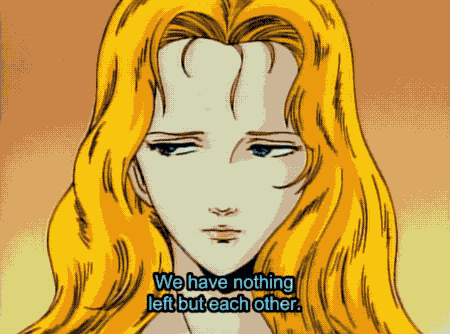
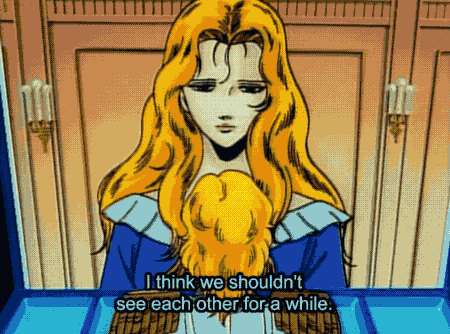

Above, Reinhard first protests Annerose’s disingenuous declaration that he has nothing left to lose, and then looks on in horror as it becomes clear that she intends to make it a true statement. But even while Reinhard listens, and responds, the gears are (visibly!) turning in his head, trying desperately to figure out what the fuck is going on. So let’s join him: What the fuck is going on?
First and foremost, I think, is Annerose’s desire for freedom. With Kircheis gone, she must realize that Reinhard’s need for her emotional support will increase astronomically. It’s one thing for her to live quietly in Reinhard’s mansion when he’s usually off gallivanting around space with his boyfriend; it’s quite another thing to share a home with someone who is grieving the loss of, as Mittermeyer so eloquently put it, half of his own self.
Because Reinhard may view Annerose as a mother, but that isn’t how Annerose views Annerose. We don’t actually know how she views herself—as I said back in episode 1, our entire characterization of Annerose is a reflection of how the world sees her—but we do know how she came to be Reinhard’s mother figure and, like her sale to Kaiser Friedrich IV, it wasn’t through any choice of her own.
In fact, this choice, the one to tell her grieving brother to fuck off so that she can finally get some time and space to herself, is the first choice we’ve ever seen Annerose make. So despite episode 26 ending on a catastrophic note for Reinhard’s relationship with Annerose, it ends on something of a triumphant note for Annerose herself: In choosing not to allow her well-meaning brother to use her as his personal grief counselor, she has finally, if perversely, reclaimed her agency.
Meanwhile, Reinhard has come to a completely different realization about Annerose’s motives:

My much earlier promise of a love triangle between Reinhard, Kircheis, and Annerose has finally come to fruition in true LoGH fashion, i.e. as morbidly as possible.
Make no mistake: The reason Reinhard asks this question of Annerose now is because it has never occurred to him before, and the reason it has occurred to him now is because Annerose is behaving in a way that he interprets as some mixture of jealous, vindictive, and heartbroken—none of which align with his image of his sister. Faced with her unambiguous and uncharacteristic cruelty, Reinhard searches around for an explanation and comes up with what would have sounded outlandish to him until this moment: romantic love.
But was Annerose in love with Kircheis? I don’t know. Frankly, I doubt Annerose knows (and we never get to see her answer, if she even gives one). Remember, Kircheis was ten years old to Annerose’s fifteen when she became the Kaiser’s concubine, meaning for most of the time they actually spent together, Annerose was basically Kircheis’s babysitter. It’s certainly possible that she developed romantic feelings for him over the years, or at least projected some romantic ideal onto him that she experienced as love. Given that he was probably the only male figure in her life besides her brother who was ever kind to her, it wouldn’t be surprising.
As a rival to Reinhard, though, my guess is that Annerose never considered herself in the running—and if anything, that would have made Kircheis an even safer object of affection for someone whose real-life experience with men was limited to a decade of blatant sexual exploitation. But that certainly doesn’t preclude jealousy or heartbreak; in that sense, Reinhard might be partially right about why Annerose chooses to act the way she does.
The accuracy of Reinhard’s suspicions, however, isn’t particularly important. What matters is that Reinhard has had this realization at all: In yet another twisted triumph for Annerose, and at immense cost, her brother has finally realized that she’s human.
Queerness
Given the reasons for the existence of this blog, it’s only fitting that we end our first season with a discussion of how LoGH treats queerness. Conveniently, this coincides with the creative team’s decision to convert a substantial portion of the show’s queer subtext into explicit text, done via multiple perspectives and narrative techniques throughout the season finale.
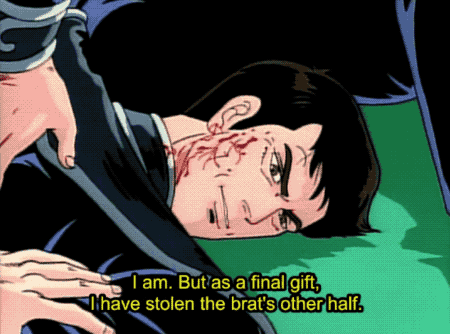
Our first open acknowledgement of the romantic nature of Reinhard and Kircheis’s relationship comes, unfortunately, from Kircheis’s murderer, Ansbach. The phrase “other half,” unlike much of the language used thus far to describe Reinhard and Kircheis, doesn’t have a heteronormative surface reading.
Incidentally, Ansbach’s easy familiarity with the concept of a romantic partnership between two men has always been one of the things that made me wonder about his feelings for Braunschweig—along with the fact that immediately after this, Ansbach tells Braunschweig to “wait for him in Valhalla” before killing himself.
Kircheis’s last words, too, work to remove a layer of heteronormativity from LoGH’s surface reading, albeit more subtly:

In this final, stunning example of a Reinhard-Bechdel Test failure, Kircheis uses his last breath to ask Reinhard to tell Annerose... that he kept his promise to be a good friend to Reinhard.
In a heteronormative piece of media, when a male character brings up a female character’s name in his dying breath, one would probably expect him to declare his undying love for her. That Kircheis starts his last sentence with “Please tell Lady Annerose...” and finishes it with a positive allusion to his relationship with Reinhard is an incredible subversion of heteroromantic tropes. It even goes so far as to “straight-bait,” dangling the possibility of Kircheis’s romantic feelings for Annerose in front of the viewer before categorically dismissing it.
Later, while Reinhard mourns, Mittermeyer uses similar language to Ansbach’s, above, to explain to Müller why Reinhard is in such an inconsolable state:

Like Ansbach’s usage of “other half,” Mittermeyer’s “half of his own self” doesn’t have a non-romantic interpretation to bolster LoGH’s increasingly shaky heteronormative surface reading. Also like (maybe) Ansbach, Mittermeyer is a character who (as we’ll see much more of soon) can speak from his personal experiences with queer romance, making him perfect for delivering this unambiguous message not just to other characters, but also to the viewer.
The last scene of the episode and the season finds Reinhard at Kircheis’s grave which, yet again, emphasizes his romantic relationship with Reinhard, and not just because of the inscription’s use of the singular possessive “my”:

Though the German “Mein Freund” directly translates to “my friend,” that isn’t actually how the phrase is used in Germany, where “Mein Freund” most frequently refers to a male romantic partner. The only ambiguity about Kircheis’s inscription is in how it’s translated: as わが友 in Japanese or, literally, “my friend,” obscuring the German usage and allowing it to continue to pass as heteronormative.
After placing flowers on Kircheis’s grave, Reinhard sits back, revealing that he has started wearing a locket. Opening it, he shows us that it contains a photo we’ve seen before of Reinhard with his chosen family, and a lock of Kircheis’s hair:

Season one of Legend of Galactic Heroes ends on a deeply personal note, and it also ends on a series of questions: What, or who, will Reinhard find to fill the gaping hole in his life left by Kircheis’s death? Will it be his rivalry with Yang? Other, darker questions are left unspoken, but their presence is felt nonetheless: Will Reinhard find something to “quench the thirst in his heart”? And, if not, what then?
Stray Tidbits
During this post, as usual, I’ve used gifs from the LD (original) versions of LoGH instead of their redrawn versions. Episode 26 was almost entirely redrawn, and many of the “remastered” scenes are dramatically different from their original versions, so I’m gonna give a few sample comparisons here. Kircheis’s death scene, for example, was changed to make his physical process of dying appear significantly less grisly. Below, on the left, the redrawn Kircheis’s body is still and his eyes are focused on Reinhard; on the right, the original Kircheis’s breaths are visibly laborious and painful, and his eyes are unfocused:


Below, Reinhard’s facial expressions and reactions during his conversation with Annerose were changed so drastically that he might as well be a different character. In the redraw (left), Reinhard is practically throwing a tantrum; in the original (right), Reinhard is still shocked, but keeps his composure as he struggles to process his sister’s unexpected cruelty, placing the emphasis squarely on his thoughts rather than on his feelings:

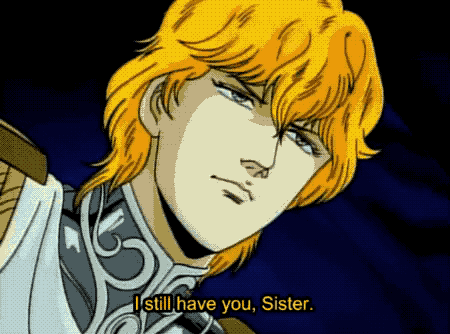
On a lighter note, the redraw team seems to have been confused (or, less charitably, offended) by this public display of intimacy between Reuental and Mittermeyer—in the redraw (left), Reuental stops Mittermeyer from standing by either touching his hand or just making a motion as if to touch his hand, keeping a respectful distance; in the original (right), Reuental physically impedes Mittermeyer from standing up by placing his hand on *draws a diagram* his very inner thigh, and leaving it there:


A small worldbuilding note: The dates on Kircheis’s grave are wrong! He was actually born in 467, not 468, according to every other marker of time in the LoGH universe.
And now for something extremely disturbing: An official LoGH-branded Kircheis roomba exists. When it’s low on batteries, it says, “I won’t be able to serve you anymore, Reinhard-sama.” Sadly, this is real and I’m not making it up.
#Legend of Galactic Heroes#Legend of the Galactic Heroes#author: Elizabeth#Empire#Reinhard#Kircheis#Annerose#Reinhard-Bechdel Test#queerness#family#holding hands#redraws#quote unquote friends#ow
52 notes
·
View notes
Text
Episode 25: The Day Before Destiny

September 797/488. Kircheis and Reinhard reunite, and promptly get into a terrible argument over the finer points of the Westerland massacre. Later, Oberstein again pressures Reinhard to take away Kircheis’s special privileges and Reinhard, again, refuses—but by the time the admiralty convenes a day later, Kircheis, usually the only one allowed a firearm during meetings, gets his taken away at the door by security. During the meeting, Reinhard takes mercy on the previously nobles-aligned Fahrenheit and gives him a job. Ansbach then arrives rolling in a casket containing Braunschweig’s corpse, ostensibly a gift symbolizing his submission to Reinhard; in actuality a way of smuggling a firearm into the room—a firearm that Ansbach removes (ew ew ew) from Braunschweig’s body and aims directly at Reinhard. To be continued...
Yet another note about redraws

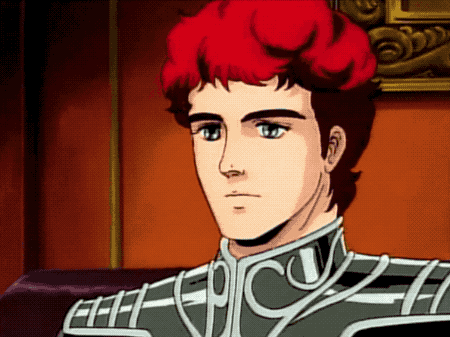
Before I get into the meat of this post, I want to address the fact that episodes 25 and 26, much to their detriment, are almost entirely redrawn. And, as I warned would happen occasionally, the redrawn scenes are so dramatically different from their corresponding original LD versions that I’ll be focusing my analysis exclusively on the latter. That means some of my interpretations of body language and facial expressions might be at odds with the version you watched, unless you’re fortunate and/or tenacious enough to have found your own copies of the LD. But worry not! I’ll be providing you with so many visual aids you’ll FEEL like you watched the LD version yourself. The best parts anyway. Okay *takes a deep breath* let’s do this.
Reinhard and Kircheis

In a dramatic departure from their reunion in episode 16, here we see Reinhard putting out his hand and actually having to wait for Kircheis to take it. The magnetic force that has always compelled Kircheis to be as close to Reinhard as physically possible seems, in their months apart, to have dulled.
In the latter half of episode 25, well after most of what I’m about to talk about has happened, Kircheis has yet another flashback about his relationship with Reinhard, only this time it’s made up entirely of footage (five whole minutes of it!) that we’ve already seen. Season one has, on the Empire side, been in many ways the story of Reinhard and Kircheis as a couple, and in episode 25, the tension that has been mounting between them ever since Reinhard hired Oberstein back in episode 8 finally comes to a head. As Kircheis’s recap-flashback reminds us, though, there’s a lot more to Reinhard and Kircheis than the stresses of the past year-and-change—and that’s what Kircheis thinks about as he considers whether or not their relationship has finally suffered irreparable damage.
But first things first: As soon as Kircheis arrives at Geiersburg, Reinhard, who hasn’t seen him since episode 19 (about five in-universe months ago), whisks him away to his quarters to, er, catch up.

This falsely cheery attempt at smalltalk by Reinhard is excruciating to watch, and it’s made even worse by Kircheis’s sudden deployment of that favorite phrase of relationship-enders the world over: “We have to talk.”
Honestly I’m not sure what Reinhard expected; maybe he thought if he just steered conversation away from the Westerland-sized elephant in the room, he could actually avoid having to talk about it. In any case, Kircheis wastes no time bringing it up, foiling that plan immediately. And hey, remember when I said Westerland would be on the exam? Well, it’s exam time!
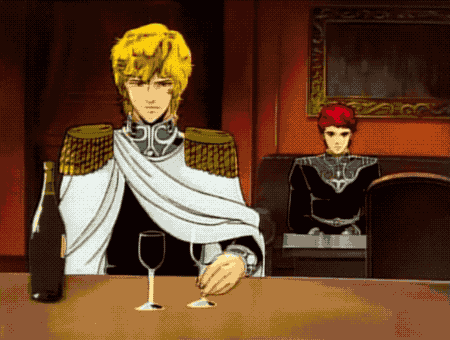

Reinhard’s nonchalant facade shatters the moment Kircheis asks him directly about the Westerland massacre: Above, he keeps his back turned to Kircheis for as long as is feasible, then studiously averts his eyes from Kircheis’s face as he sits down across from him. But why is Reinhard acting like someone who has committed a crime, despite having done no such thing? Well, just because Reinhard isn’t guilty of what Kircheis is questioning him about doesn’t mean he isn’t experiencing feelings of guilt: First of all, it was his disastrous hiring decision that did, in fact, result in the Westerland massacre being carried out. And also, maybe more importantly in this moment, he’s about to lie right to Kircheis’s face.
As I discussed at length in my episode 23 post, Reinhard has, somewhat under duress, arranged it so that he and Oberstein are the only people who know that the decision to allow and record the Westerland attack was made without Reinhard’s consent or knowledge. This was partly to protect himself from (potential) accusations of complicity and incompetence, but mostly to protect his pride from the fact that he was wrong about his ability to keep Oberstein in check.
I wish I could write about Reinhard changing his mind and admitting to Kircheis that he fucked up, and asking him for help, but of course that isn’t what happens: Kircheis asks Reinhard point blank if he allowed the Westerland attack to take place and be recorded for the sake of propaganda, and Reinhard, lying through his teeth, says he did.

This visual representation of, well, Kircheis’s heart breaking is one of my favorite pieces of animation in this episode: His eyes visibly fill with tears, then he looks down as far as possible without actually closing his eyes, and shakes his head with such weight that the rest of his body moves with it. The redrawn version (above) makes Kircheis look like he’s chastising Reinhard rather than experiencing soul-crushing disappointment, and is therefore vastly inferior.
That Reinhard is lying complicates this scene a great deal, because his frustration with the lecture that follows can at least partially be attributed to his own awareness of everything Kircheis is pointing out—and the fact that he can’t very well explain that yes, he knows all this and yes, that’s why he didn’t actually do the thing that he just told Kircheis he did.
In light of Reinhard and Kircheis’s episode 16 argument, which ended harmoniously and with the world’s softest Reinhard eyes of all time, it’s worth emphasizing that Reinhard doesn’t actually have a problem with Kircheis calling him on his shit. The difference between episode 16 and 25’s arguments—besides the obvious, uh, gap in harm between punishing Bittenfeld and murdering two million people—is that in episode 16, Reinhard actually did need to be convinced of Kircheis’s point of view. In episode 25, Reinhard is basically being forced to listen to Kircheis unwittingly give a lecture to a version of him from a different timeline, in which he chose to go along with Oberstein’s plan.
Reinhard finds this understandably infuriating, despite (or perhaps because of) the fact that he brought it on himself, which brings me to another difference between this fight and the one in episode 16:
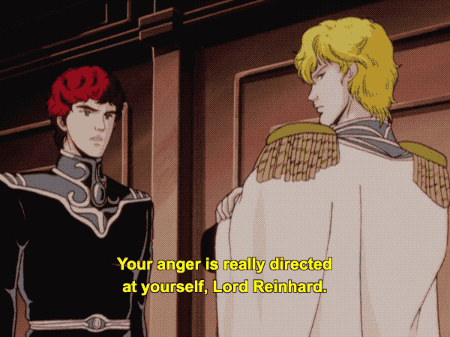
Back in episode 16, Kircheis was filled in on all the details of Reinhard’s predicament, and could therefore advise him appropriately, up to and including this key moment when he pinpoints the true object of Reinhard’s anger: himself. In episode 25, Kircheis’s ability to help Reinhard come to the identical conclusion has been hobbled by Reinhard’s unwillingness to be truthful with him.
Because of course the person Reinhard is angriest at, post-Westerland, is himself: He’s the one who hired Oberstein; he’s the one who let Oberstein walk all over him; he’s the one who has made it so Kircheis, the closest person in the world to him, thinks he allowed two million innocent people to be killed for political expedience. And just like in episode 16 when Reinhard would have taken out his self-directed anger on Bittenfeld if Kircheis hadn’t talked him through his emotions, episode 25 finds Reinhard instinctively aiming his self-loathing outwards—but this time not only does Kircheis not know enough to try and help, he’s also the target.

Hmmm, that reflection on Reinhard’s hand almost looks like something... What could it be representing... I’ll have to think about it.
Unable to argue against Kircheis’s logic (because he agrees with it), and unwilling to back down, Reinhard has given himself no choice but to order Kircheis to stop talking, which he does harshly enough that they’re both taken aback and Reinhard immediately, and visibly, regrets it. But I think we’ve established that without Kircheis’s calming influence, there’s no way Reinhard could ever overcome his stubbornness long enough to apologize; instead, he doubles down, and when Kircheis won’t stop expressing his opinion despite Reinhard’s repeated attempts to devalue it, Reinhard finally snaps:

This is both one of the most explicit allusions to the romantic nature of Reinhard and Kircheis’s relationship we’ve seen so far, and one of the saddest. Ow.
Above, Reinhard seeks to put Kircheis in his place by reminding him that he doesn’t actually have any power in an official advisory capacity; Kircheis, in response, ups the ante by distancing himself from their personal relationship instead of their political/military one—the opposite of what Reinhard intended. And that’s it: The camera moves back, emphasizing the chasm of silence between the two men, and Kircheis eventually exits, leaving Reinhard alone with his thoughts and his wine.
Did we just watch Reinhard and Kircheis break up? Well, the conversation did start with Kircheis saying “we have to talk” and end with him emphasizing the least personal aspect of their relationship. That’s pretty breakup-y. But in the scenes following, both Reinhard (drinking wine out of Kircheis’s glass) and Kircheis express hope that they’ll be able to reach an understanding:


So no, I don’t think Reinhard or Kircheis intend to end their relationship at this juncture. They may have fought, and it may have been their worst fight by far (that we’ve seen), but they both harbor hope for reconciliation. Which brings us back to Kircheis, standing in his usual spot at the head of Reinhard’s admiralty, reminiscing about everything he’s been through with Reinhard over the years:

Of course Reinhard’s extremely soft eyes are the last frame of Kircheis’s recap-flashback—even when he’s mad, Kircheis’s thoughts about Reinhard are colored by how much he loves him, and he remembers him at his best.
And that’s where we leave them, before Ansbach walks in with a coffin containing Braunschweig, out of whose dead body he pulls a gun.
Stray Tidbits
Meanwhile, on the Tristan (Reuental’s flagship), Reuental and Mittermeyer have been playing poker to decide... who buys tomorrow’s wine? Apparently they drink together every night—not that that's at all surprising.
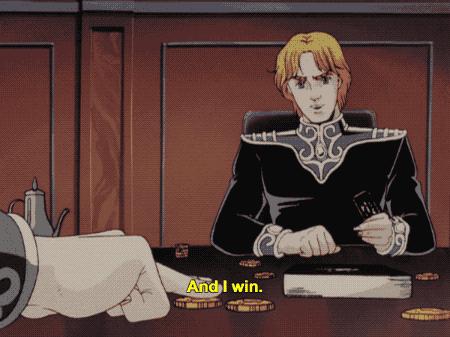

Incidentally, this is the second time we’ve seen Reuental and Mittermeyer 1. gamble while 2. gossiping about Reinhard and with 3. Reuental narrowly edging out Mittermeyer for a victory:

Remember this romantically charged game of nine-ball from way back in My Conquest?
One of the subtler extremely painful aspects of the Reinhard/Kircheis “What am I to you?” conversation is how quickly Kircheis believes Reinhard’s lie about his role in the Westerland massacre. And later in the episode, we see Reinhard’s only other source of emotional support in the world display a similar lack of faith in his moral compass:

It must be really sad and discouraging for Reinhard that those closest to him don’t believe in his ability to tell right from wrong. Obviously that’s no reason for him to act out by doing evil things or anything, but it’s still depressing as hell. Poor Reinhard.
Did Mittermeyer just... giggle? Well, in the novels, everyone in attendance barely suppresses their laughter during this scene, so yes, that seems to be what Mittermeyer is doing. Icebergs canon, then, is that Mittermeyer has the darkest sense of humor in Reinhard’s admiralty. Interesting!

Mind your business, Ferner.
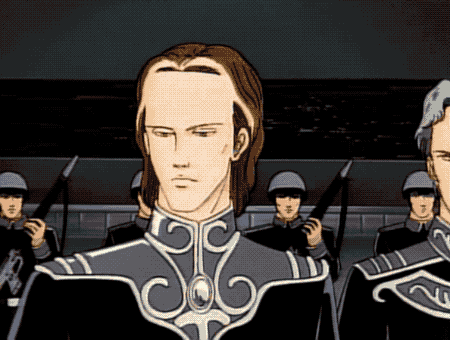
#Legend of Galactic Heroes#Legend of the Galactic Heroes#author: Elizabeth#Reinhard#Kircheis#redraws#pain#heartbreak#ow
28 notes
·
View notes
Text
Episode 24: Victory for Whose Sake?

Summer 797/488. The season wraps up on the Alliance side with the failure of the coup d’etat, as Yang attacks them in two ways: one, with bad PR, broadcasting a “confession” by Baghdash that the coup was actually instigated by Reinhard; and two, with what I can only assume is totally accurate and brilliant physics, flinging gigantic chunks of ice at near lightspeed into the Artemis Necklace that surrounded Heinessen and completely destroying it. After Reinhard’s agent, Admiral Lynch, reveals to the rest of the military council that Yang’s propaganda was accurate, they kill him to eliminate evidence of the Empire’s involvement, but not before he shoots and kills Admiral Greenhill. In happier news, Merkatz (and Schneider) show up at Iserlohn and Yang decides to trust them and offer them sanctuary, demoting Schenkopp to having only the second best eyebrows in the Alliance. Sorry Schenkopp!
Frederica
The emotional core of this episode centers around Frederica, who receives the news that her father committed suicide after the defeat of the coup.
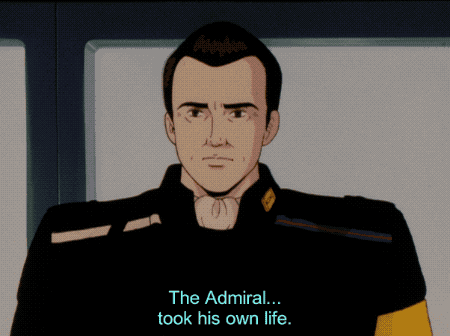
Okay actually Lynch shot him, but close enough.
Back when Frederica first found out that her father was involved in leading the coup, I pointed out that her main visible concern is whether Yang would fire her because of it; beyond seeing her anxiety over possibly losing her position and her relief when Yang in fact keeps her on, we’re not given any real view of her emotions about her father’s actions, other than initial shock. Throughout the battle against the 11th fleet she performs her duties as Yang’s adjutant without any apparent distress.

From episode 21, 8:53...

...and 12:14. Sorry animators, I'm calling you out. It's like a spot-the-difference puzzle. Can you spot it?
˙ʇɐɥ s,ƃuɐ⅄ :ɹǝʍsu∀
Now that the fleet battle is over and they’re heading to Heinessen to fight against her father’s military council directly, however, cracks are showing in Frederica’s emotional armor; she spends the first half of the episode sitting in the background of every scene looking completely miserable.




Although we get a peek at her melancholy mood in these shots, she never (that we see) articulates any objection to their plan of fighting to bring down her father’s council, or indeed vocalizes her emotions or opinions on the matter at all (more on this in a sec). While the personal situation is obviously difficult, there’s no indication that her ties to her father outweigh either her loyalty to Yang or her own political opposition to the coup (we don’t know what the main factors really are, because—again—she never tells us). Her suffering here is silent and entirely in the background.
But after they successfully destroy the Artemis Necklace that was theoretically protecting Heinessen, Yang’s fleet is contacted by some other admiral from the council, who delivers the news that Admiral Greenhill committed suicide. This is a lie (although it’s hinted he may have been considering it), but let’s take a moment to parse what this news means to Frederica: Although Yang used a combination of propaganda and unmanned ice chunks destroying unmanned satellites in order to strip away that power of the military council rather than attacking them by force, the result of his actions (as far as she knows) was to shame her father so utterly that he took his own life. And she herself had a role in carrying out this plan; at the very least she never openly opposed it.
So how does Frederica take her father’s death? After showing her immediate horrified reaction, eyes wide and trembling, the camera gives her a bit of privacy; we zoom in on Yang lecturing about despotism and free speech to the military council guy for a few minutes, and when we finally pan out again Schenkopp has come to replace Frederica at Yang’s side.
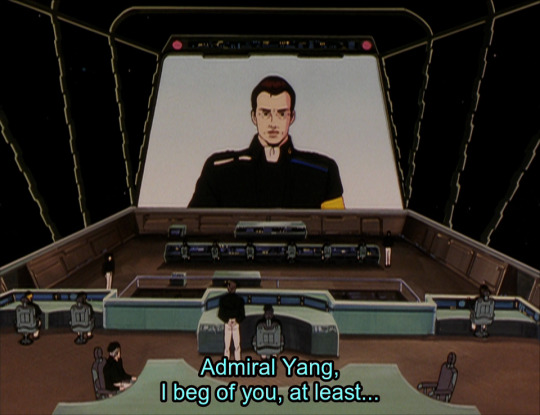
I love the subtlety of this camerawork, and the tiny worldbuilding detail of Schenkopp moving in to fill the vacancy. I suppose the commander is never supposed to be without an attending officer?
Frederica has braced herself against a desk off to the side to try to steady herself, and when Yang goes over to her, she asks him for two hours off to compose herself. Yes that’s right, two hours to get her emotions under control after the actions of her own fleet caused her father to commit suicide in shame after violently overthrowing a democratic government.

Asking first for one hour and then amending it to two makes it sound like she sees two whole hours as indulgent. Seriously Frederica, a true professional could pull herself together in fifteen minutes max.
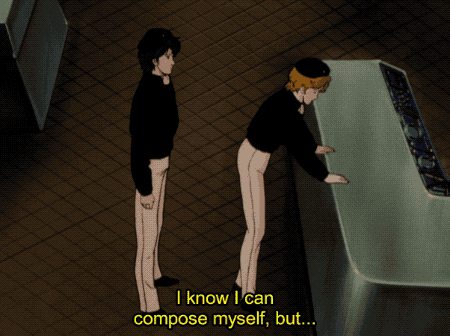
Notice how hesitant and awkward Yang is in this scene; in the gif above he checks his impulse to comfort her with a hand on her shoulder, and here he haltingly resorts to trite words of encouragement. Both his sincere concern for her and his discomfort and fear of crossing any professional boundaries are clear.
Sure enough, by the end of the episode Frederica is back to dispassionately performing her adjutant duties, and brushes off Yang’s concerned look with assurances that she’s fine and keeping busy.

She is still visibly downcast here, but again, Yang doesn’t feel comfortable pressing further when she doesn’t want to discuss it.
And that’s that. The season is over for the Alliance, and (spoiler) Frederica never mentions her father’s death again or seems at all outwardly traumatized by this whole sequence of events. Two hours of lying in bed looking at a photo and crying, just two hours to “compose” herself, and then seamlessly back to work. What’s really salient here isn’t just her stoicism; it’s how clearly she’s exerting conscious effort to push back her emotions and refrain from letting them get in the way of her job. She’s obviously struggling—that’s clear in her downcast gazes early in the episode, her trembling reaction to the news, and her carefully controlled but still dejected expressions at the end. But her work seems to come above everything; just as not getting fired was her main visible concern when her father first overthrew the government, her effort in this episode is directed toward not spending more than two hours away from her job of giving Yang papers to sign.
Which brings us, finally, to an important question about Frederica, which I confess I’ve spent the whole season somewhat skirting around:
….What the hell is her deal??

Frederica is, at this point, a bit of an enigma. She feels like a main character, both as one of the primary assistants to Yang and as a clearly marked Potential Love Interest—treated blatantly as such by her father, Schenkopp, and Yang himself (more on that below); and yet, we’ve been through a whole season and not once has she made a single decision that affected the outcome of events, or expressed an opinion that differed from the people around her. We haven’t seen her do anything just for fun or discuss her hobbies or personal life (beyond her eight-year adoration of Yang).
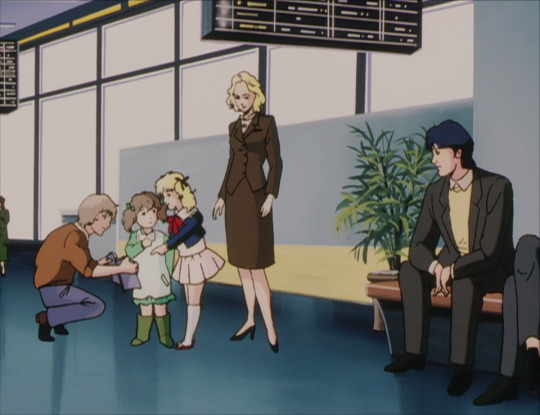
This contrasts with Julian, whose identity also revolves around his role in Yang’s life and who also hasn’t been in a position to drive the action yet; but we’ve seen him taking care of Gensui, playing 3D chess, and here entertaining the Cazellnu girls. Even the several times we’ve seen him in civilian clothes all subtly build personality; we’ve only seen Frederica out of uniform in El Facil flashbacks.
(From episode 16.)

Even Konev, with a total of about five minutes of screentime so far, feels in some ways more fleshed out than Frederica, with his love of wordplay and crossword puzzles as well as his habit of betting on battles with Poplan. And of course Poplan is shown here engaging in his favorite hobby of uhh, acting super heterosexual the moment right before a battle I guess?
(From episode 21.)
Frederica graduated second in her class at the military academy, but we’ve never been told anything about her career aspirations or what she envisions for her future. Being the adjutant to the commander of the Iserlohn forces at only 23 years old might in fact be super impressive (I’m not an expert on how promotion through these various military positions works); but while we’re told repeatedly that she’s great at her job, it’s a job that seems to be all about executing someone else’s decisions.
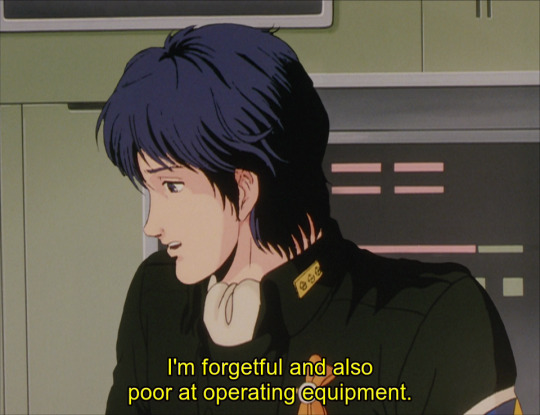
Like Julian, Frederica’s most salient skills fit into gaps in Yang’s own skillset; in Julian’s case it’s housework and physical combat, while in Frederica’s it’s logistics and technology.
(From episode 19.)
All of which is to say, it’s difficult to know much about Frederica right now by just looking at her, herself. She is defined so far by her competence at and dedication to her job, her history of idolizing Yang, and beyond that mainly by negatives: lack of arguments with anyone, lack of questioning other people’s decisions, lack of glimpses into her life outside of work, lack of extreme displays of emotion—shown most notably in this episode with the effort she puts into not letting her father’s death by suicide interfere with her duties.
Frederica and Gender Roles

Meanwhile in the Empire...
(From episode 18.)
Since we don’t have a lot of information about Frederica herself, it’s interesting to compare her to other characters in narratively similar roles. One of Frederica’s distinguishing features is that she’s a woman operating in an almost entirely male sphere; indeed it’s tempting to throw up one’s hands and attribute her lack of exercising any narrative agency or pursuing any agenda unrelated to a guy she has a crush on as simple lazy sexism on the part of the creators. But (repeat after me) this is LoGH, and before we jump to that conclusion the creators deserve for us to try to look deeper. And as soon as we glance around at the other women we’ve met so far, we find, well…

...Jessica, who also filled the Potential Love Interest narrative slot for part of the season; but unlike Frederica we got to see her have substantive conversations with Yang about their views on the war and Alliance politics, and she also pursued her own political and activist goals independent from Yang’s or anyone else’s agenda.
(From episode 21.)

...And Hilda, shown here approaching Reinhard, the rising political and military star of the Empire, and talking him into giving her a written guarantee that her family will be well taken care of once he overthrows the current social order. God damn Hilda is badass.
(From episode 18.)
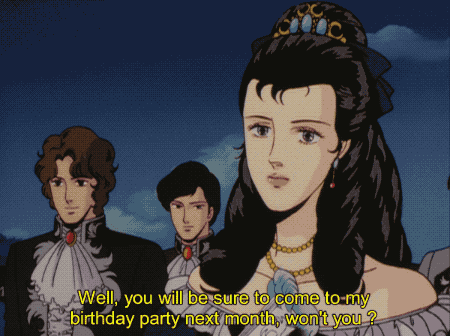
...And Magdalena, who unlike Jessica and Hilda (and Frederica) does not throw herself into traditionally male realms, but embraces her life as a noblewoman and navigates it with her own personality and values. Here we see her fuck with poor Kircheis while her minions look on; she’s also one of the few among the nobility who’s tried to be a real friend to Annerose. I love how Magdalena (and Hortence on the Alliance side—be patient okay) provides an example of a woman seeming to thrive without following a more typically (for their society) masculine path. (From episode 9.)
So, no: While the world of LoGH is certainly male-dominated, this show knows perfectly well how to imbue its female characters with aspirations, agency, points of view, and personalities that aren’t defined by the men around (or in power over) them. So when after a whole season Frederica still seems primarily defined by what she’s hidden from us, we should pay attention to this as a conscious choice by the writers.

I said we haven’t seen Frederica push her own agenda or disobey orders but that isn’t entirely true: The one time she did was this attempt to get Yang to take better care of his physical health during a battle. By appealing to Julian’s authority. Unsuccessfully—the battle starts back up and Yang brushes her away and says he’ll eat later. Whatever the precise opposite of the Bechdel test is, I think this scene passes it.
(From episode 15.)
As I struggled to piece together a portrait of Frederica in my mind from what we’ve seen this season, the list of her prominent traits started to sound rather familiar: working to keep her emotions below the surface; silent in meetings; never openly ambitious; rarely making jokes; focused on performing her duties at all costs (including uh, getting her boss coffee tea with brandy). Spend a few minutes googling around for articles on struggles women face in predominantly male careers and you’ll find pretty much this exact list. While Hilda is just beginning to throw herself into politics by aligning with Reinhard, and Jessica pivoted into activism from teaching piano after her love interest was fridged, Frederica by this point has come all the way through the military academy and spent time after that doing information analysis before ending up working under Yang. She’s been studying and working (very successfully!) in an almost entirely male environment for about seven years by now. Could her all-business, eager-to-please, show-no-weakness style have been learned in response to the general sexism of that environment in some way? That’s certainly not unrealistic, and worth keeping in mind.
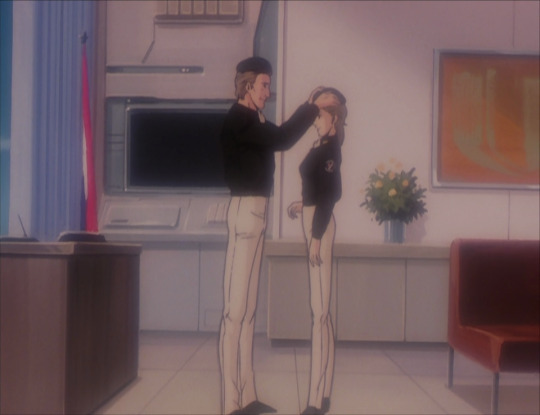
In the brief flashback montage that we see while Frederica lays in bed remembering her father, we get a couple of further glimpses into their dynamic. Like most things about Frederica, why she chose to join the military in the first place is a mystery; was it to make her father proud?

As far as we know, Frederica was close to her father; but remember that we’ve seen him appear to blatantly matchmake her with her new boss, which is, well, messed up. Contrast this with Hilda’s father, who we see openly encourage her to be politically ambitious in her own right.
Frederica and Yang (and heteronormativity)

Frederica...what even is that expression? You know if you have aspirations of getting closer to Yang personally you’re gonna have to get used to him going off on monologues about the nature of war, right? It’s kind of his thing.
(From episode 16.)
There will be plenty of time to talk about the dynamic between Frederica and Yang, but while I’m laying the groundwork for Frederica Discourse heading into season two, it’s worth summarizing a bit. We haven’t seen them interact much at all so far outside of the context of work; and within that context, from the beginning Yang has been very obviously conscious of the fact that, unlike everyone else around him in his daily life, she is a woman.

This was not Yang’s finest moment, completely failing to contain his surprise that his new adjutant was female. Here we see the cycles of heteronormativity and sexism: Yang is a victim of societal norms, as we’ve discussed; but he’s also helping perpetuate them, since his stress about the mere potential of romantic (sexual) expectations being placed on him means that he lets the gender of his adjutant affect his behavior toward her more than he should.
(From episode 6.)
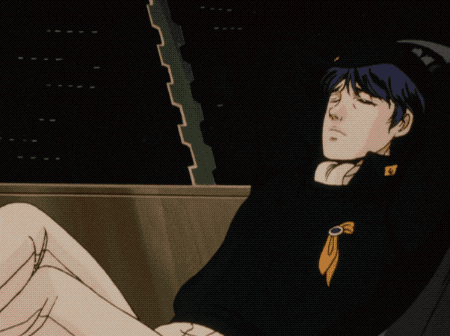
...Not that he’s about to let societal norms about how to behave in front of women get in the way of his naps, of course.
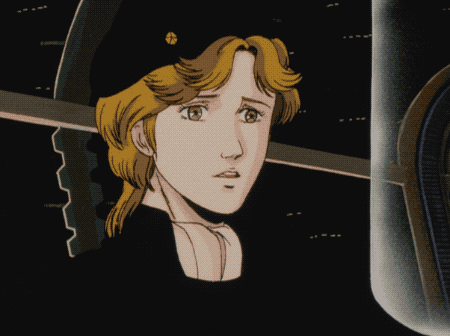
This is the one time all season that Yang directs one of his musings on war at Frederica. Between her dumbfounded gaze (see screenshot above), his embarrassment after he remembers she's listening, and her quick transition back into fetching him tea rather than engaging with what he said, it's clear neither of them is comfortable with this interaction. There’s something (hmmm what could it be??) stopping them from having the same kind of friendship Yang has with Cazellnu, Dusty, Schenkopp, even Julian. (Both from episode 16.)
But Frederica isn’t just a woman who happened to become Yang’s adjutant; she has a very specific history with him, which is the one thing in her life she’s not very shy about.
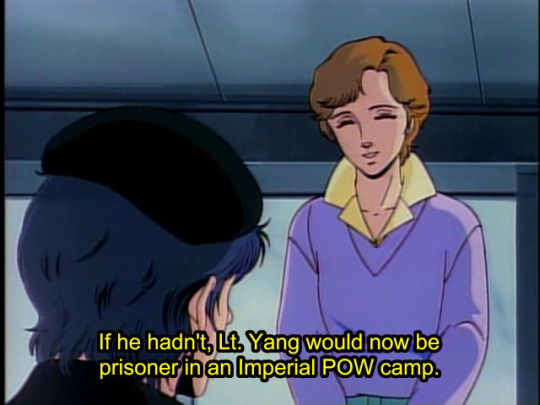
When Julian asks Frederica about her memories of El Facil in episode 17, he points out that Yang might have ended up happier if he hadn’t become a “hero,” but Frederica is quick to object that Yang would have just been captured by the Empire if he hadn’t successfully evacuated the planet. I don't know if that’s true—could Yang not have escaped himself, as his commanding officers did, without also evacuating all three million civilians? What is true is that Frederica herself, and her mother, would have likely been captured or killed.
(From episode 17.)
Her first meeting with Yang on El Facil wasn’t just about thinking his dislike of coffee was cute: He saved her life. He is very literally her hero, and she has a deep personal stake in this major turning point in his life which, as Julian points out, was not entirely positive for him. Since we first met Yang in “My Conquest” we’ve known that his actions on El Facil brought him more attention than he ever wanted—specifically romantic attention from women that he didn’t feel interested in or comfortable responding to; Frederica is the love letters he didn’t answer in “My Conquest” brought to life. And she’s also his direct subordinate. While their working relationship seems functional and positive enough, it’s no wonder that personally it feels strained.

Icebergs Canon: The three pink ones are from Frederica.
Julian
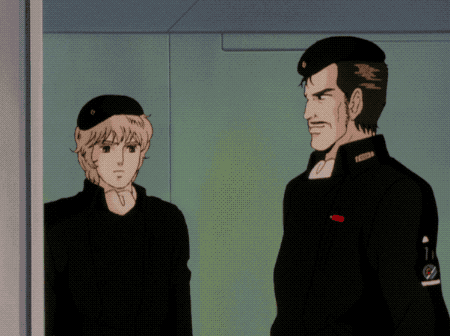
Julian Mintz.
Age: 15.
Likes: Yang; tea; 3D chess; Yang; the color purple; cats; Yang; pointing guns at people; housework; Yang; Kircheis.
Dislikes: Baghdash.
After struggling to understand what’s going on behind Frederica’s carefully controlled exterior, Julian is a breath of fresh air. As always he wears his heart completely on his sleeve, to the extent that I feel a bit invasive watching him.

Yesss, demolish it all! Julian’s into it.
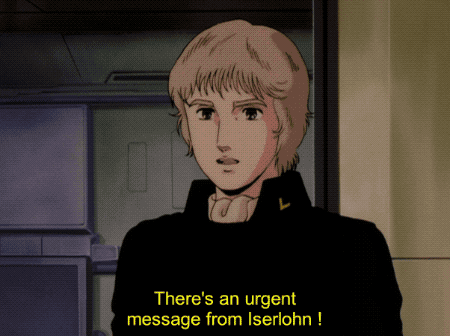
“God damn Yang has a great ass.”
—Julian’s Iserlohn Diary, the unpublished pages
...Okay not actually, but come on, we don’t need to read his diary when that open-mouthed smile already says everything.
I’ve so far hedged a bit about declaring Julian’s obvious idolization of Yang to be an official crush, but hell—no one in the history of the world has ever watched someone clumsily burn his hands and then jump over a chair with that specific appreciative smile when they didn’t have a crush, so I’m ready to call it. Congratulations Julian, you are hereby Officially Canonically Smitten.

Just like his probing about Yang’s interactions with Jessica in episode 10, here we see Julian a couple of times in the background clearly paying attention to the dynamic between Yang and Frederica, and specifically to Yang’s awkwardness in knowing how to comfort her about her father’s death. While it’s subtle, in context this slightly heightened interest in Yang’s relationships with women is another hint that Julian’s own feelings are at least slightly romantically tinged.

Of course, Julian is also friends with Frederica (after all, he has the most in common with her…) and probably also worried about how she’s doing. But we don’t see him interact with her directly at all; we just see him look thoughtfully from her to Yang.
Now, despite my having declared Julian’s feelings a crush, I’m not claiming that he actually frames it to himself that way; after all not only do they live in a deeply heteronormative society, but their situation in particular is obviously...well, complicated. As I’ve discussed, Julian has always treated Yang as a mentor or commanding officer rather than as family; but the power dynamic remains, as well as the age difference, and I don’t imagine that Julian is in fact doodling “Julian <3 Yang 4 ever” in his notebooks and dreaming of a big traditional wedding. But crushes on mentor figures are common; and I believe we see enough in his gazes to tell us that his appreciation of Yang is the sort that makes his heart race in a way that constitutes a crush, whether or not he’s able to put it to himself in those terms right now. How these feelings, and his own awareness of them, evolve as we head into the next season is definitely something we’ll be looking out for.

In the meantime, please enjoy this gif that I randomly just love for the body language animation—the contrast between Yang’s slouch and Julian standing eagerly at attention; Julian skipping so nimbly out of the room while closing the door behind him. Also hmm, I think I’ve seen that lamp at Ikea...guess some things don’t change in 1600 years.
Stray Tidbits
Back in episode 16 Admiral Sitolet told Yang he was going to retire and start beekeeping, and hey, looks like he’s followed through! At least someone in this miserable galaxy is successfully living out their dream.

I will never watch the scene of Yang describing his plan to destroy the necklace without laughing out loud. I have no idea whether his application of the theory of relativity is uhh, scientifically sound—didn’t Yang flunk every class except history, or something?—but what I’m more interested in is where the fuck they came up with dozens of gigantic chunks of ice on such short notice.
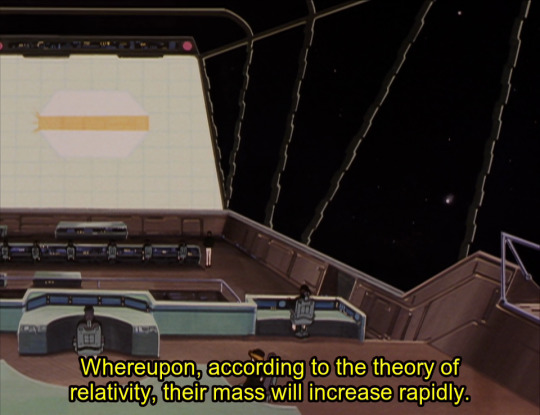

Speaking of which, I love this screenshot and I encourage you to use it in a wide range of contexts.
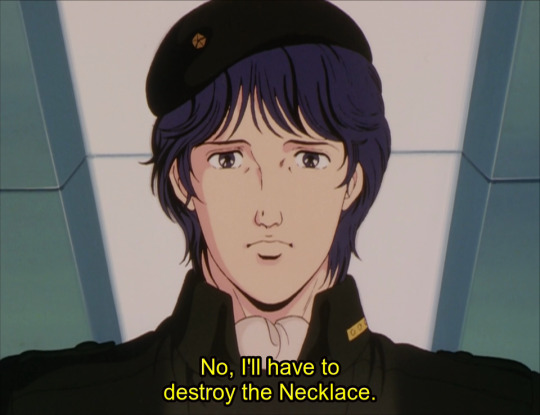
Meanwhile, welcome to the Alliance, Merkatz and Schneider! We’re thrilled to have you, but I suppose this means it’s now my job to try to figure out what exactly is going on here... *thinking emoji*
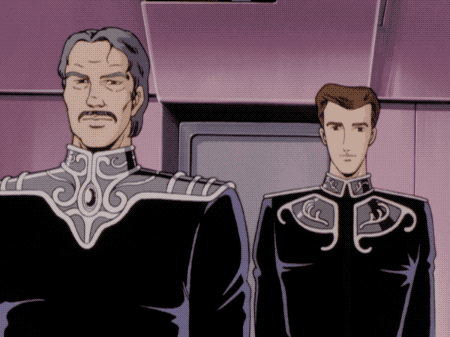
Come on Greenhill, everyone knows never read the comments.

#Legend of Galactic Heroes#Legend of the Galactic Heroes#author: Rebecca#Alliance#Frederica#Yang#Julian#gender#heteronormativity#beekeeping#dammit Cazellnu#Merkatz's eyebrows
13 notes
·
View notes
Text
Episode 23: The Fall of Goldenbaum

September 797/488. After a riot on Westerland leaves his nephew dead, Braunschweig decides to take the rather drastic measure of nuking the small planet’s entire population out of existence. This leads to the sinister Oberstein’s most sinister plan yet: Instead of stopping the Westerland attack, why not send a probe to record it and broadcast evidence of Braunschweig’s atrocities throughout the Empire? Reinhard’s tentative objections can’t stop Oberstein from lying to accomplish his goals, so the Westerland attack is carried out, the footage is broadcast, and Reinhard wins popular support and the civil war. Meanwhile: Ansbach, swearing revenge against Reinhard, forces Braunschweig to do the Honorable Thing and drink poison; Reinhard’s admirals save the Empire’s art collection; and Annerose gazes wistfully over a balcony.
Westerland

We’ve been given numerous warnings about Oberstein ever since he forcibly introduced himself to Kircheis back in episode 4, and guess what: In episode 23, shit finally hits the fan. No, Oberstein isn’t the one who planned and executed the attack on Westerland, but—well, actually, let’s go ahead and break down who exactly was responsible for what, because this will in fact be on the exam:
Person of Interest 1: Braunschweig

Braunschweig personally ordered a nuclear attack on Westerland, killing 2 million innocent people. He is obviously the worst and guiltiest party. Moving on.
Person of Interest 2: Oberstein

When Reinhard's instinct was, of course, to swoop in and save Westerland from Braunschweig’s attack, it was Oberstein who suggested allowing the attack to happen for Reinhard’s political gain. That’s fucked up, Oberstein!

Reinhard was rightfully scandalized at first, but he’s long been susceptible to Oberstein’s simple and effective brand of Machiavellianism, so he put off his decision until the last minute, which Oberstein told him was six hours away.

Oberstein then ordered Ferner to follow through with his plan despite Reinhard’s misgivings, in the process revealing to us that he had lied to Reinhard about how much time he had to make up his mind. Oberstein: He truly does suck.
Person of Interest 3: Reinhard

In a one-episode vacuum, Reinhard is almost blameless for the Westerland massacre: We don't know if he would have decided to side with Oberstein, or with his own conscience (and, presumably, Kircheis’s), had Oberstein decided not to be a duplicitous fuck. Outside the vacuum of this single episode, however, Reinhard is far more culpable. After all, he hired Oberstein, despite Kircheis’s warnings, under the naïve assumption that he could rein him in. More on this shortly.
Reinhard and Oberstein
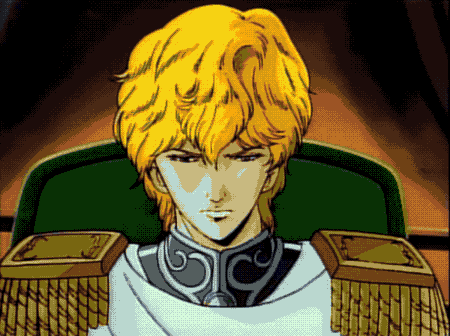
The word Reinhard uses here, 許す (yurusu), can mean either “forgive” or “permit,” so both the fansubs (left) and the official subs (“If you were here, you’d never, ever allow me to do this”) are valid interpretations, despite having different meanings.
Okay so are we all clear on who did what? Good. We’ll come back to that, but for now let’s fast forward a bit to the aftermath of the attack, at which point Reinhard, defying all earthly logic, finds out that Oberstein lied to him and decides not to punish him for it.
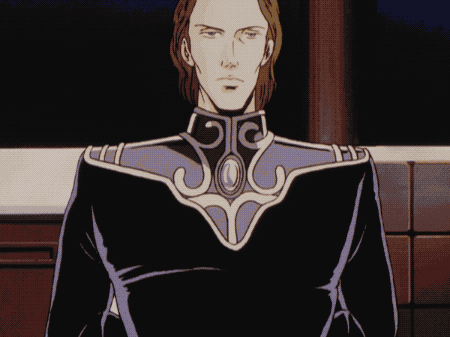
Maybe I’m just being optimistic, but it’s moments like these, in which Reinhard appears completely blindsided by the fact that Oberstein went behind his back, that make me think that if he hadn’t been lied to, Reinhard would have stopped the Westerland attack. Oh well.
The last time one of his subordinates flat out disobeyed him, Reinhard was so furious that Kircheis had to lecture him on the importance of leniency—and Bittenfeld’s transgressions were nowhere near as bad as Oberstein’s. So why does Reinhard not only refrain from taking action against Oberstein, but listen to his bullshit rationalizations after the fact?

Watch as Oberstein does a live performance of the dictionary definition of “refusing to take responsibility for your own damn actions, Oberstein.”
Since Reinhard hired (acquired? bought?) Oberstein, there have been very few times when they’ve disagreed enough for Reinhard to put his foot down. The only real exception has been the subject of Kircheis’s special privileges and “number two” status, on which Reinhard has (so far) been unwilling to budge.

Reinhard is far more uncomfortable with the fact that he is unable to convince Kircheis that Oberstein is an asset to their team than he is with Oberstein himself—to a point.
To be fair to Reinhard, Oberstein has, until now, refrained from recommending a course of action that was unequivocally evil—both to Reinhard’s mind and to Kircheis’s. His plans may have been morally ambiguous, but they were still at least on some level redeemable: Not only could Reinhard rationalize directing his subordinates to follow Oberstein’s recommendations, but Kircheis could rationalize turning a blind eye (sometimes literally) to Reinhard’s increasing reliance on such an openly morally grey character.
With Westerland, this changes. Oberstein’s suggestion that Reinhard allow the attack to take place is the first time we see Reinhard balk at a non-Kircheis-related proposal from his staff officer, and is therefore also our first chance to see if Reinhard really can, as he promised Kircheis back in episode 8, stand up to Oberstein. At first, it seems like he might:

Reinhard is obviously and viscerally repulsed by Oberstein’s cool utilitarianism here, and though Oberstein pushes him hard on it, Reinhard doesn’t back down from his insistence that he have time to decide on whether or not to exploit the attack for his own gain.
In the end, of course, we don’t get to find out for sure what Reinhard would have chosen to do, because Oberstein goes ahead without his knowledge. But Reinhard still has another shot to prove that Oberstein isn’t pulling his strings: Even if it’s too late to save Westerland, he could remove Oberstein from his position as Reinhard’s chief advisor (after Kircheis), thus preventing more Westerland-like fiascos in the future. But he doesn’t.
It makes sense that Reinhard would avoid the public, political spectacle that might result from court-martialing Oberstein; at worst, this could lead to popular opinion painting him as both complicit in the Westerland attack and incompetent. However, some form of discreet, private censure seems like it would be easy enough to do without attracting much attention. Unfortunately for Reinhard, there are other, less tangible obstacles standing in the way of not letting Oberstein walk all over him.
First of all, Oberstein is fucking terrifying. This isn’t as important a consideration as the next obstacle I’m going to talk about, but it’s worth mentioning that the man Reinhard would theoretically be up against just proved that he’s willing to allow an entire population of 2 million innocent people to be brutally murdered to achieve his goals.

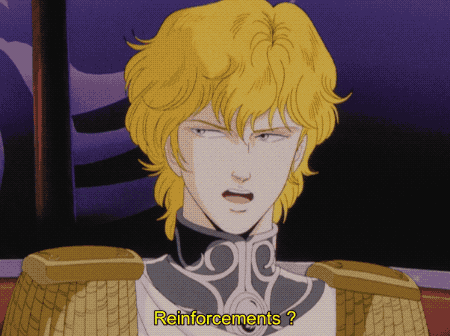
Until now, Reinhard’s commanding presence has been a dominant aspect of his characterization, especially when it comes to anything related to war: Above on the left (from episode 14), Reinhard leads his staff in a victory toast before he’s even won; while on the right (from episode 15), his harsh words for Bittenfeld’s actions cause a low-ranking officer to visibly cower. It’s not surprising that Reinhard, whose primary goal in life is literally to conquer the universe, projects confidence that often crosses the line into arrogance.
But this is in stark contrast to his subdued affect following the revelation that Oberstein went behind his back vis-à-vis Westerland:
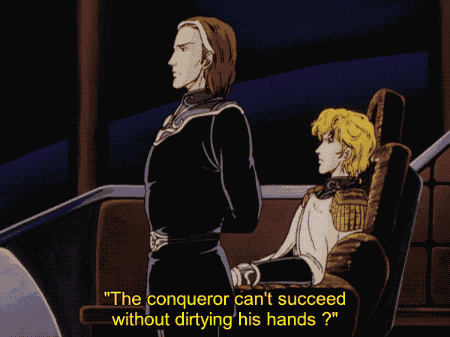
Reinhard seems trapped during this whole scene, unhappy and yet—for the first time that we’ve seen in a military setting—without the power to act. Unlike his usual fearless, imperious self, post-Westerland Reinhard has the disconcerting air of a cornered animal.
Of course, Reinhard’s fear is (or should be) moot, because he isn’t a cornered animal—he’s an Imperial marshal with a cadre of talented and loyal subordinates who would deal with The Oberstein Problem as soon as Reinhard said the word, if he ever did. Which brings me to Reinhard’s second and far more dangerous intangible obstacle: his pride.
From the moment that Kircheis first voiced his concerns about Oberstein, Reinhard has treated him like more than a mere staff officer; faced with the possibility that Oberstein might be too much for him to handle, Reinhard promptly turned him into a symbol of his belief that, in fact, nobody is too much for him:

In this moment from episode 8, Reinhard is essentially betting Kircheis that Oberstein won’t do the exact sort of thing that he ends up doing in episode 23. The bet is, of course, one-sided—Kircheis has no interest in proving Reinhard wrong; he just wants Oberstein to stay the hell away.
In order for Reinhard to censure Oberstein, he would first have to admit that Oberstein deceived him in such a way as to cause the deaths of 2 million people. And the enormity of Oberstein’s crime would reflect the enormity of Reinhard’s failure not only to control Oberstein in this one instance, but also to have the foresight to see what was coming—which Kircheis did, unlike him.
In short, Reinhard is too proud and too stubborn to admit that he’s in over his head, and was wrong about Oberstein. And without a willingness to ask for help shouldering the burden of Oberstein’s treachery, the fact that Reinhard has a team of handpicked and distinguished admirals at his disposal is irrelevant. He’s alone, and faced with the prospect of no support in a fight against Oberstein, he gives in.

An obvious drawback of Reinhard keeping his fears and concerns secret: Anyone who puts two and two together is going to assume the worst. Luckily, he has Kircheis to argue for giving him the benefit of the doubt—at least until he can confirm or deny the rumors for himself.
Stray Tidbits
Reuental and Mittermeyer holding their hands in identical positions as they walk past the disgraced nobility is such a good detail—the animators absolutely never miss a chance to show us how fucking in sync these two are. Damn.

And here is another nice bit of LoGH’s trademark consistent characterization, in which Artist-Admiral Mecklinger rallies the troops to... save the Empire’s art collection? Yes. A very soldierly activity. I love how enthusiastic and serious they all are.

Okay so it looks like Ansbach’s feelings in Braunschweig’s direction are less of a comparison with Kircheis’s and more of a foil for them. Ouch. Rest in pieces, Braunschweig.

In less unsavory news that somehow still relates to men swearing undying loyalty to one another, Merkatz and Schneider are going to the Alliance! And as another contrast with the fucked up retainer/vassal relationship between Braunschweig and Ansbach, Schneider proposes that he and Merkatz defect together only after keeping him from committing (honorable) suicide. What a precious young man! I wish these two nothing but the best. Bon voyage!

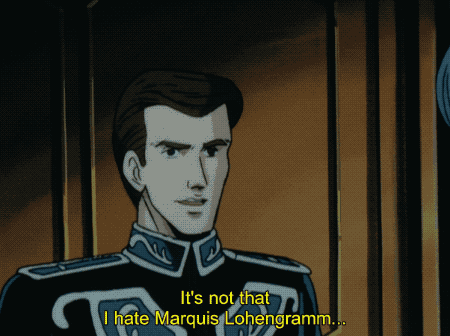
#Legend of Galactic Heroes#Legend of the Galactic Heroes#author: Elizabeth#Empire#Reinhard#Westerland#Oberstein#Kircheis#pride
21 notes
·
View notes
Text
Episode 22: Courage and Loyalty

797/488. The Imperial aristocracy continue to think they have a shot against Reinhard and his crew; they continue to be wrong. Littenheim fires on his own supply ships to make an escape route for himself, sowing seeds of distrust among his subordinate soldiers. Meanwhile, Kircheis is nice, Mittermeyer is snarky, and Merkatz is in a tight spot.
You may have noticed that the official Icebergs summary for episode 22 is like, a fraction of the usual length! Well, this episode is a fraction of the usual interesting things happening. As you probably got from the narrator’s heavy-handed foreshadowing, shit is about to get pretty intense in the Empire, and episode 22 is basically treading water before that happens—the calm before the storm, if you will. So I’m going to take my cue from LoGH and, in a vaguely connected sequel to my episode 18 post and Rebecca’s episode 12 post, talk for a little bit about what’s really on everyone’s mind:
Imperial Hairstyles
Okay, so haircuts in LoGH may not merit a super-deep queer analysis (you’ll have to wait for hair color for that; no I’m not kidding), but as I’ve mentioned before, they do have some characterization significance and never is that more glaring than in episode 22.
Fancy Boys of the Aristocracy
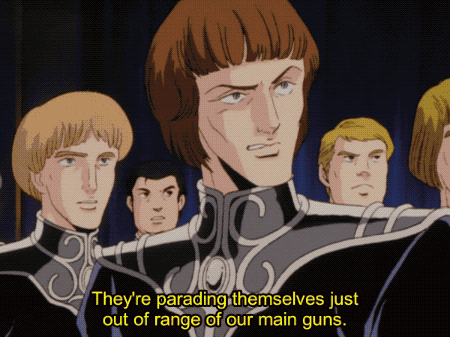
You’re welcome for the nightmares.
Back in episode 18, I touched on the fact that Braunschweig’s apparent George Washington cosplay wig (unpowdered variety) is one of many indicators not just of how old-fashioned he is, but specifically of how regressive he is. Unlike Reinhard and his subordinates, who talk varying levels of openly about what they hope to see change in a hypothetical Reinhard-led society—this can be boiled down more or less to “the path of your life not being determined by how you were born”—the goal of the nobles is to prevent change. Which helps to explain why so many noble underlings have their hair styled like that of a young Venetian man in the 1500s. No seriously, spot the difference:

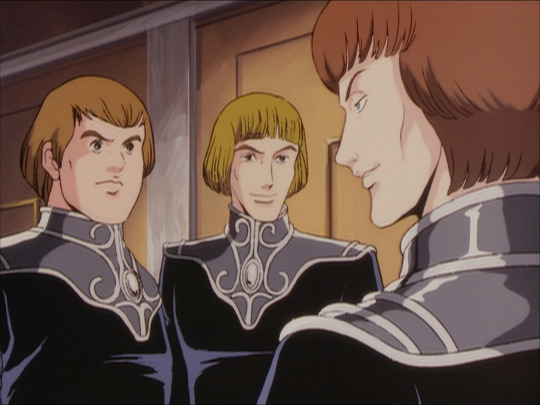
If you said “hats” you were correct, that is the only difference.
Anyway, at the risk of underestimating the LoGH creative team, my guess is that there isn’t any monumental sociopolitical significance to the particular era that inspired the standard Imperial noble haircut. Rather, like the ostentatious 18th-century-esque ponytails sported by men of Braunschweig’s rank, I think we’re just supposed to get a general impression of “these idiots are extremely out of touch.” And... yes, that message is coming through loud and clear.

This is what people were really like during the Italian Renaissance, probably.
Other than Flegel (above), the only Standard-Haircut Fancy Boy you should be paying attention to is Lansburg, who can be spotted below, on the far left:

But I don’t have much to say about him at the moment besides that for some reason he is the noble who repulses me the least, visually speaking.
Finally, I’d be seriously remiss in a post about Imperial hairstyles not to at least bring up Wilhelm von Littenheim, whom I have so far failed to mention—despite the fact that he is co-leading the nobles’ effort against Reinhard—because the most interesting thing about him is his hair.

I’m grateful for Littenheim’s existence for one reason, and that reason is this highly relatable gif.
Sadly for Littenheim, though, Mecklinger seemingly exists to put his mustache to shame, and there’s only so far a big purple hairbow will get you in this world, so that’s all the space on Icebergs he’s going to get.
Wahlen and Lutz: Hair Twins
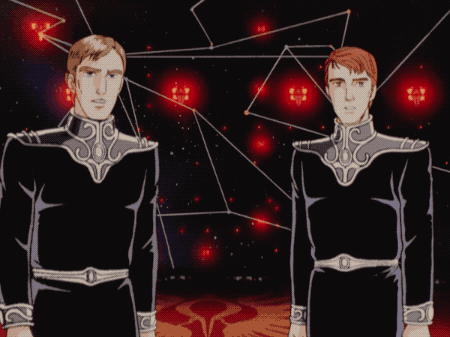
And as long as we’re on the subject of hair, allow me to introduce you to Cornelius Lutz (left) and August Wahlen (right), whose hairstyles are mirror images of each other, and otherwise seem to have basically the same character design. I have trouble picking them out in a crowd individually, but when they’re together, the mirror-hair thing is a great help for me—and I hope it will be for you too!
I also hope you enjoyed this frivolous Empire-side post, because it’ll be the last one like it for quite some time. Buckle up.
Stray Tidbits
According to Rebecca, “like good boys” isn’t strictly speaking an accurate translation here, but it’s still the one we’ll be using as Icebergs canon, because Mittermeyer totally would say that.
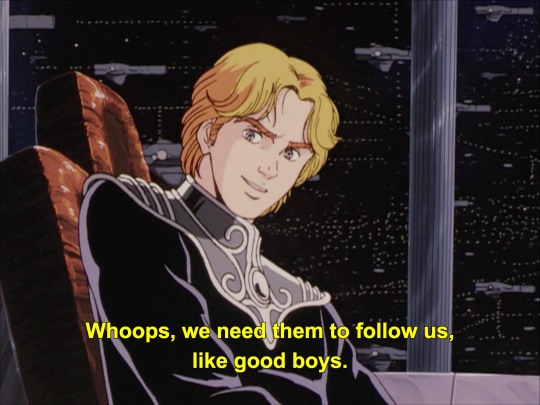

The question of the inherent value of being willing to die for a cause has been a theme in recent episodes, and if you still had any doubts that LoGH takes a hard stance against indiscriminate self-sacrifice, this frankly ridiculous scene should put them to rest:

In episode 21, Jessica asked, “Do you think it’s all right to commit any atrocity as long as you’re prepared to die?” In episode 22, the over-the-top absurdity of the Imperial nobles confirms the subtler Alliance-side answer: No, the fact alone of being willing to die for it does not make your cause just or worthwhile.
On a similar note, here one of Littenheim’s soldiers gruesomely takes him to task for the pointlessness of the war that killed his friend—right before pulling out and detonating a bomb. I can’t decide if this gesture is sad, funny, or romantic as hell, so I’m going to go with all of the above.
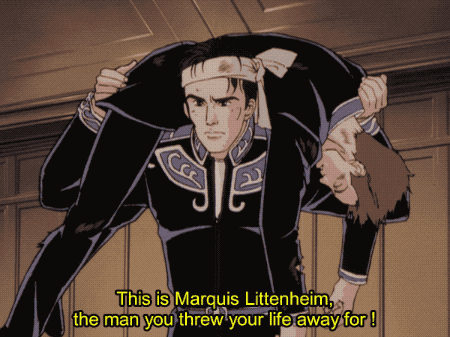
Free idea: a 90s-sitcom-inspired fanfic about adult!Konrad adopting and raising child!Konrad and the hijinks they get up to. You can call it: The Konrads.

The only reason this lazy trope is even remotely forgivable is because judging by how fucking on the nose it is, it’s possible that LoGH actually invented showing a picture of someone’s newborn babies right before they get blown up—and, if not, it surely perfected the “art.”

#Legend of Galactic Heroes#Legend of the Galactic Heroes#author: Elizabeth#Empire#hairstyles#fancy boys#hair lore#it's super deep
10 notes
·
View notes
Text
Episode 21: The Battle of Doria Starzone, and...

Spring 797/488. En route toward Heinessen, Yang’s fleet encounters Baghdash, a supposed deserter who is very obviously there to assassinate Yang—not before taking a nap, though, which gives Schenkopp the chance to lock him in deep sleep mode while Yang and co. make pretty quick work of the 11th fleet, which was sent to intercept them. Instead of the dishonor of surrender, the commander of the 11th fleet chooses to fight until all but a handful of his soldiers have been killed, and then commits suicide. Meanwhile on Heinessen, Admiral Greenhill’s whole “if I didn’t lead these young’uns bad things would happen” schtick proves rather pointless when, despite Greenhill urging restraint, the unit sent to break up a peaceful protest ends up inciting a riot that kills 20,000 people, including the organizer, Representative Jessica Edwards.
Julian and Yang
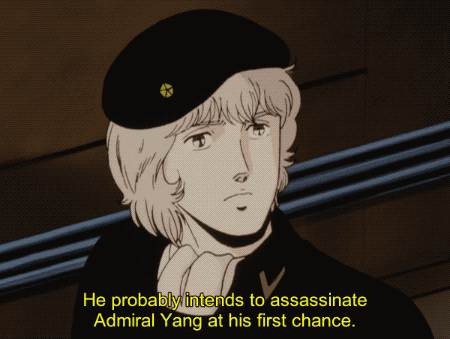
Close your mouth, Julian, a bug will fly in. Or possibly a bird or small spacecraft.
Julian said he would protect Yang back when he was first learning to shoot, and a real opportunity presents itself for the first time when Baghdash shows up on his mission to assassinate Yang. Schenkopp forestalls Baghdash’s plans in pretty undramatic (but hilarious) fashion, adjusting his tank bed to keep him asleep for the whole battle (hey, look at that worldbuilding about tank beds from episode 1 having actual plot payoff!); and when Baghdash wakes up to find the 11th fleet annihilated, he pragmatically offers his loyalty to Yang, who he now believes will be the ultimate victor.

Feel familiar? This is essentially the same scene as when Reinhard gave Ferner to Oberstein, recast with Alliance personnel.
Yang seems to feel he has a good read on Baghdash’s self-preservation instincts and has no qualms trusting him; he even temporarily bequeaths his own gun to Baghdash, since he himself never even carries it.

This is a move Yang has pulled before, acquiring personal loyalty by putting perhaps undue amounts of trust in people—he did this with Schenkopp and the Rosen Ritter when he relied on them to infiltrate Iserlohn.
Baghdash “jokingly” points the gun at Yang before lowering it and saluting, which leads to this masterful piece of cinematography.

My, they grow up so fast...
To appreciate the context of this scene, let’s back up and take a moment to peruse a photo album of the last year and a half of Julian’s life.
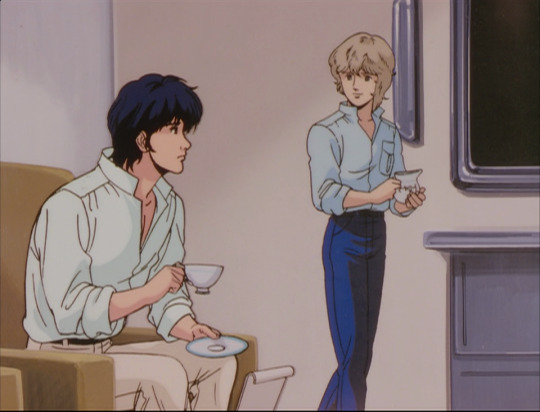
From making Yang tea and keeping house for him on Heinessen…
(Episode 3, early 796)

...to trotting earnestly around after him in Thernusen…
(Episode 10, mid 796)

...to getting to tag along to Iserlohn as an orderly…
(Episode 16, late 796)

...to pledging to protect Yang if necessary…
(Episode 17, early 797)
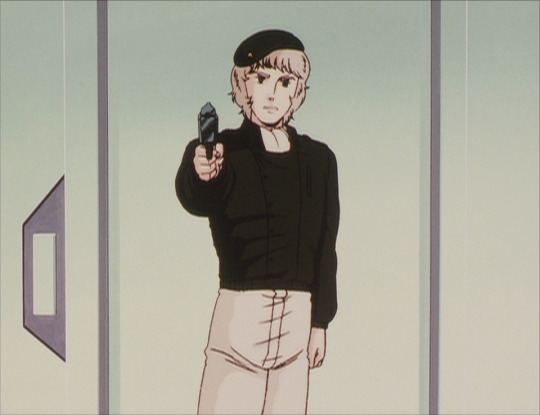
...to now. Mid 797, fifteen years old. Threatening to shoot a man for the crime of possibly contemplating killing someone Yang.
It’s impossible to talk about Julian without talking about his role in Yang’s life, because such a huge part of his own conception of his identity has to do with struggling to figure out exactly what that role is. We’ve seen his hero-worship manifest as copying Yang’s style and body language in the past, and he eagerly soaks up Yang’s lectures about battle tactics; but at the same time ever since his very first introduction it’s been clear that Julian’s own goals and skills are distinct from—even opposite—Yang’s: he enjoys cooking and cleaning while Yang is hopelessly lazy; he dreams of becoming a soldier while Yang dreams of escaping the military; he excels at physical combat while Yang apparently can’t hit the broad side of a barn.
These differences are part of why Julian sees himself as serving a purpose—he can do the various physical labor that doesn’t come naturally to Yang—but they’ve also introduced tension into their relationship starting way back in episode 3.

After responding to Julian’s expressed wish to become a soldier by ranting about how much he dislikes both soldiers and the war, Yang tells a rather downcast Julian that they’ll continue the discussion some other time. The only person who’s happy in this shot is Gensui, smiling smugly in the corner. We see you Gensui. Stop laughing at the humans’ drama.
The point of this little Julian Retrospective isn’t to show a transformation from meek housekeeper into badass soldier; on the contrary, Julian’s ambitions to join the military have been a constant of his character from the beginning, and so has his instinct to rush to Yang’s defense physically.

Did you think I could pass up a chance to show my favorite moment from episode 10 again? I told you this gif never gets old. Hang in there Julian, your moment will come!
But while Yang’s overt disapproval of Julian’s chosen path creates some background tension between them, we’ve never actually seen Julian be anything but deferential and eager to please in his direct interactions with Yang.
Until now.

I’m obsessed with Yang’s change of expression here. He goes from an initial (rather impressed) “holy shit Julian means business” reaction to, when Baghdash appeals to him, a more solemn “oh yeah it’s probably my job here to make sure Julian doesn’t actually shoot the guy” face.

Getting over his initial surprise, Yang adopts extremely relaxed body language as if to intentionally counter Julian’s rigid, aggressive pose and diffuse the tension. But Julian is not having it. The key line here is his blunt contradiction of Yang: “Riyuu wa arimasu!”—“There *is* a reason!”—which, while still in polite speech, is delivered with authority and without any markers of humility or deference.
Julian is there to protect Yang from a threat as he perceives it, in his own way, even if that means going against Yang’s own view of the situation and preferred way to handle it. This moment emphasizes that while Julian would—perhaps literally—kill for Yang, he is not trying to fashion himself into a mini-Yang, or even to stuff himself in a box labeled “Yang’s ideal protégé.” His identity is deeply tied to Yang but not erased by him.
Of course, Julian may be the one pointing a gun, but the actual authority in the room still resides with Yang—as becomes clear when Yang finally, laughing, orders Julian to stand down and dismisses Baghdash.

The timing of Yang’s laugh, after several seconds of silently letting Julian stand there looking badass, makes it feel more like a calculated strategy to diffuse the situation than something spontaneous.
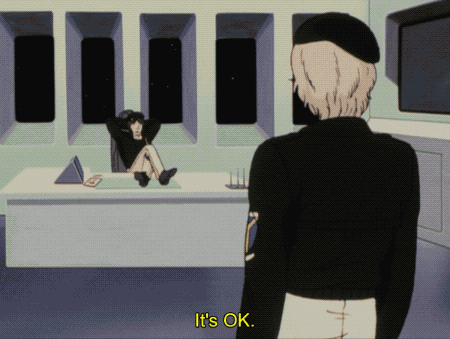
The verb form here is actually the causative, “Hito-goroshi wa sasetakunai yo.”—“I don’t want to make you murder anyone.”
Far from acting upset with Julian’s theatrics, Yang seems some combination of proud and just kind of tickled. But despite Yang’s smile and his explanation of why he’s not worried about Baghdash, Julian’s expression remains angry; he may have argued further, but they’re interrupted by news from Heinessen...
Jessica
The rest of this episode is much less fun than watching Julian level guns at people. When 200,000 citizens gather in a stadium for a peaceful rally protesting the National Salvation Military Council’s takeover of their government, the council sees it as a challenge and sends a unit in to break it up and “restore order.” This leads to absolutely chilling scenes where the leader of that unit (whose name I neither know nor care about, fuck this guy) attempts to show that true power comes through violence by making an example of ten random people.

The question of whether there’s something inherently righteous about being willing to die for a cause is one that pervades the whole episode (and more broadly is one of the recurring themes of the show). I’ve talked before about how Yang is differentiated from many of the other Alliance commanders by his hatred of rhetoric about death being noble and honorable—in his tea speech in episode 6, for example, he motivates his soldiers to fight not for the glory of dying for a good cause but so that they can live to drink more good tea. This same contrast is again underlined by the speeches that Admiral Legrange and Yang give to their fleets before the battle in this episode.

Just like the asshole violently intimidating the crowd at the rally, this speech conflates courage with self-sacrifice, to the extent of willingly giving your life.

Also reinforced here is Yang’s belief in personal freedom and self-determination as the most important ideals, over allegiance to any particular nation or government. He’s not fighting against the military coup because the former Alliance government was so great, but because (as he told Schenkopp in episode 19) he sees the oppressive rule by force of the NSMC as worse.
It’s Jessica, the organizer of the rally, who delivers the most eloquent and impassioned critique of this equation of violence and death with righteousness; in response to the attacks against civilians she quickly steps forward to intervene:
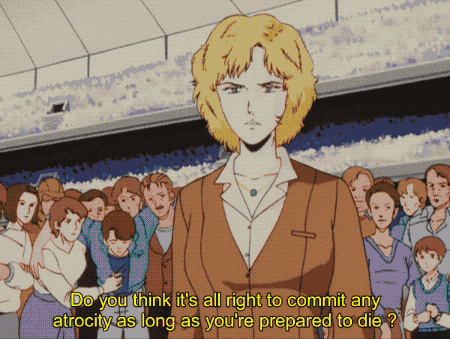
This is a beautiful speech, but it has the effect of angering the asshole commander so much that he lashes out violently against her, which ultimately escalates into an all-out riot. It’s brutal and horrible to watch, and in the end over 20,000 people have been killed. Including Jessica.

Obviously Jessica is right on the front lines of her own battle. I love this line, as she steps forward out of the crowd to confront the military force: her “koko ni imasu” echoes the accusations of “doko ni imasu?” (“where are you?”) she leveled at Trunicht in her speech in episode 3. Unlike Trunicht and the other politicians, she is right there.
One thing to note about Jessica’s death is that unlike her fiancé Lapp, she is not fridged—her death is very much about her, her own principles and resistance against the oppression being carried out in her society. And while she has a semi-romantic history with Yang, this riot is not a plot device to somehow change his plans or how he approaches fighting the military council. In fact after we see him first react to the news, he never brings it up again. Jessica’s story is about her fight, not someone else’s.
History
Which brings us back to Yang’s office, where Frederica has just interrupted Julian and Yang’s discussion of (argument about?) Baghdash to tell Yang about the riot and Jessica’s death.

Until this moment, the show’s narrator has confined himself to either telling us facts about dates, locations, number of casualties, etc., or making vague, general claims about the nature of war. What he tells us here is different: “They say Yang Wenli said not a single word.” This is neither a fact of public record nor general academic philosophizing. It’s specific personal information which we can see, since we’re watching the scene unfold behind the narration, that only one person other than Yang himself could know. Hmm.
Stray Tidbits
Schenkopp spilling coffee on his uniform in a (pretty transparent?) attempt to distract Baghdash from inquiring further about Frederica is a cute callback to his first introduction, in which he flings a pot of coffee all over a bunch of random assholes who were yelling at a waitress for defiling their uniforms.

I cannot overstate how hilarious I find Dusty’s signature strategy of fucking with enemy fleets by alternately retreating and advancing. It’s adorable, smart, and strangely erotic all at the same time. Dusty, you are the best, never change.



I love the worldbuilding of all the random battle jargon that flies by in the background of this fight. I'm gonna qualify any directions I give from now on with "relative to the standard galactic plane."

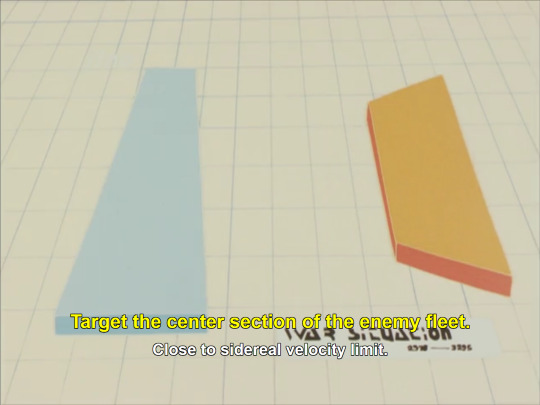

You know you wanted this reaction gif, and we are here to give the people what they want. As long as what they want is cute Julian gifs, at least.
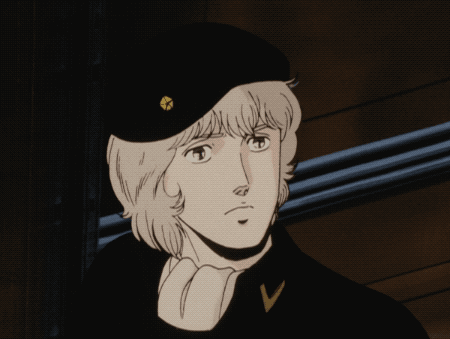
#Legend of Galactic Heroes#Legend of the Galactic Heroes#author: Rebecca#Alliance#battle#Jessica#Julian#Yang#Gensui#badass!Julian#history#death#narrator
16 notes
·
View notes
Text
Episode 20: Bloodshed in Space
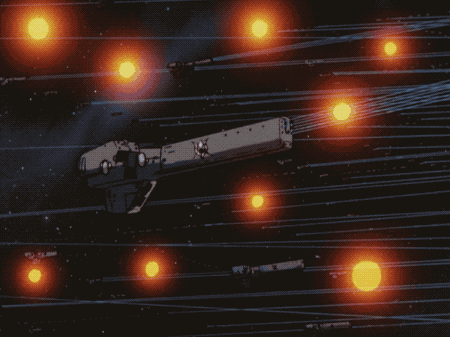
797/488. Reinhard sends Mittermeyer to kick the asses of some extremely whiny nobles, which he does with aplomb. Later, Reinhard sends Mittermeyer and Reuental together to... well, to attempt to kick the ass of Ovlesser, a significantly more threatening noble. Tensions mount among Braunschweig’s team, particularly between Merkatz and everyone else (save Schneider, of course). Reuental and Mittermeyer succeed at capturing Ovlesser, after much frustration and at great cost. Despite everyone else’s desire for revenge, the sinister Oberstein convinces Reinhard (and Reuental and Mittermeyer) to let Ovlesser go; as Oberstein predicts, Ovlesser’s comrades-in-nobility interpret his return as meaning that he betrayed them in some way, and he is unceremoniously executed as a traitor. Chalk up another win for Oberstein’s fucked up plans! Meanwhile, Mittermeyer makes moon-eyes at Reuental, and Ferner enjoys carrying out Oberstein’s plans a little too much imo.
Reuental and Mittermeyer

Reinhard and Kircheis are great and everything, but Reuental and Mittermeyer are the greatest love story of all time. I’m not biased.
(From “My Conquest.”)
I promised early on that eventually, Reuental and Mittermeyer’s relationship would stand alongside Reinhard and Kircheis’s as one of LoGH’s two epic love stories. Sadly, Reuental and Mittermeyer have had very little screentime up to this point, so I haven’t had much reason to talk about them for longer than to remind you that yes, they did go on a date this episode, thank you very much. Until now! Finally, in episode 20, Reuental and Mittermeyer take center stage, which makes now the perfect time to dig into their presence on the show so far.
Synchronization
When it comes to battle, Reuental and Mittermeyer are a well-oiled machine. We’ve seen them consult with each other before and after fleet battles; we’ve also seen them work together fluidly in hand-to-hand combat, without the need to consult at all:

In episode 11, Reuental and Mittermeyer invite themselves to help Kircheis rescue Annerose and, upon encountering a bunch of Benemunde’s cronies, take the lead in taking them down. Notice how Mittermeyer and Reuental claim their respective quarries by assigning them to each other, rather than to themselves, underscoring their affinity.
Above, Reuental and Mittermeyer communicate in a kind of shorthand: Rather than speaking directly about their plan, they talk around it, with the implicit assumptions not only that it’s already been decided save the details, but also that they both know what it is. And unlike the dynamic between Reinhard and Kircheis, who also have their own non-verbal methods of communication, neither Reuental nor Mittermeyer is subservient to the other: Both have an equal say and exercise their right to express that without hesitation.

Sorry Kircheis, this may be your fight, but it’s way more important for the audience to understand that Reuental and Mittermeyer are equals than it is for you to get to sit in the front seat. Maybe next time!
(From episode 11.)
We see this dynamic play out again in episode 20, when Reinhard sends Reuental and Mittermeyer to take down the bloodthirsty High Admiral Ovlesser. When the original plan to overwhelm him with battle-axe-armed infantry fails miserably (and violently, so, so violently), Reuental and Mittermeyer decide to go in themselves as bait��which all seems perfectly normal until you realize that they never actually discussed this plan out loud.

Just like the show’s audience, the aide standing literally right next to Reuental and Mittermeyer had no idea what their plan was until they both started talking about it simultaneously. In both a subtler and a more literal interpretation of Reinhard’s “Kircheis is the same as myself,” Reuental and Mittermeyer nonchalantly operate as if they share the same actual brain.
When they do eventually succeed at trapping Ovlesser, the battle-harmony between Reuental and Mittermeyer is even further emphasized, this time with some clever camerawork:

Mittermeyer kicks away Ovlesser’s axe, at which point the camera is behind his legs; then he turns around and... wait, it’s Reuental?! How did they do that?
Mittermeyer and Reuental have been acting as one all this time, but here the camera goes a step further and treats them like one physical body. Even when Reuental and Mittermeyer aren’t occupying space together on the screen, LoGH’s creators want to make sure we interpret them as two halves of a whole. This is a lot more than just a throwaway cinematic trick.
Body Language
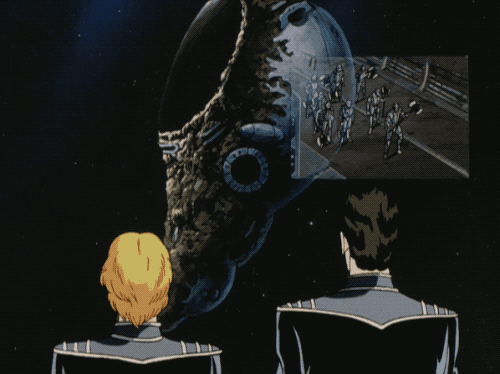
In the absence of expository flashbacks, the characterization of Reuental and Mittermeyer’s relationship is conveyed to us mainly via their (present-day) physicality. And the way they move when they’re onscreen together is unique to them, a visual representation of a type of intimacy we don’t see with the relationships between any other characters.
The gif above, in which Reuental and Mittermeyer sigh in unison, is a straightforward but striking example of how precisely their movements are choreographed to match one another. Mittermeyer leans his head slightly forward; Reuental leans his slightly back; the amount of negative space between them stays exactly the same the whole time, just shaped a little differently. Without mimicking each other’s positions, Reuental and Mittermeyer manage to give the impression of perfect balance. It’s a kind of approximate visual symmetry that’s both very expressive and very satisfying to watch—and we’ve been watching it, in fact, since “My Conquest.”

Like with their sighs above, here Reuental and Mittermeyer move in tandem—but instead of keeping the negative space between them the same, they move into it equally, so it becomes smaller but stays symmetrical. Also: Note the complementary head-tilts.
(From “My Conquest.”)

In many of these scenes, the camera itself remains static, allowing Reuental and Mittermeyer to be the only movement in the frame so the viewer can focus on how they fill a space together. In this moment from episode 5, the completely symmetrical background contrasts with how Reuental and Mittermeyer both reach subtly into the other’s “half” of the screen before settling against the balcony.
Not even the fact that Mittermeyer is several inches shorter than Reuental can get in the way of their visual balance—above, for example, Mittermeyer walks slightly ahead of Reuental, so his time in the center of the screen is longer. Below, Mittermeyer brims with energy and dynamism while Reuental is still as a statue until he expresses his restrained but emphatic agreement:

Mittermeyer’s physically asserted rage allows him to take up more space than his smaller stature would allow on its own, while Reuental, like Kircheis (usually), reins himself in. Taken together, they again balance each other out.
This isn’t the first time we’ve seen a couple’s dynamic encapsulated in how they move to fill the screen. In fact, the contrast with Reinhard and Kircheis’s framing helps reveal how carefully the animators worked to portray Reuental and Mittermeyer as equals:

The great thing about this moment from episode 4 is how strikingly out of balance Reinhard and Kircheis are while still using the same visual language of approximate symmetry that is used for Reuental and Mittermeyer. Kircheis literally struggles to catch up and be close to Reinhard, crawling back into the screen when Reinhard drags himself away—there’s symmetry here, but not equality.
When you combine all these elements—the give-and-take, the use of negative space, the slightly uneven but somehow perfectly balanced movement—you end up with scenes like the one below, in which Reuental and Mittermeyer discuss their aforementioned (and silently agreed upon) plan to ensnare Ovlesser. It’s a scene that is so casually well-choreographed that it is truly a wonder to behold:
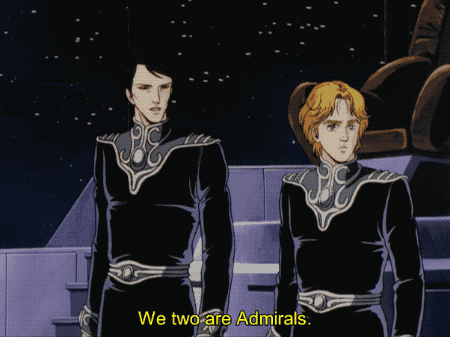
Looking at this gif fills me with a quasi-religious ecstasy. It’s perfect.
Above, Mittermeyer, who waits a beat before responding to Reuental’s movements, shifts his stance into the negative space that Reuental has just vacated, which keeps their bodies aligned. Mittermeyer puts his hands on his hips (a favorite position for him), and Reuental follows by putting his behind his back, so the space their bodies occupy is symmetrical but their postures are not. Mittermeyer waits for Reuental to put his openly gesturing hand away before putting both of his up; and through it all Mittermeyer is affectionately watching Reuental’s face while he describes their plan to someone offscreen.
At this point in LoGH, we still know next to nothing about who these two ridiculously handsome and distinguished admirals are. But if we pay attention to how their bodies interact on screen, we can begin to piece together who they are to each other. With Reuental and Mittermeyer, that’s a really good place to start.

Then again, sometimes you don’t have to pay attention beyond the embarrassingly fond expressions these two wear whenever they look at each other. Seriously this moment makes me blush.
(From “My Conquest.”)
Ugh, More Character Redraws
I regret to inform you, dear readers, that the fiends behind LoGH’s cursed “remastered” character redraws are back at it again, and this time, it’s personal:

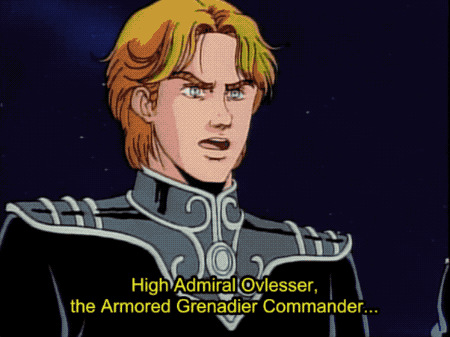
Of all the characters who suffer from redraws—and nobody is safe, NOBODY—Reuental truly has it the worst, because the changes made to his expressions venture into character assassination territory. Above, you can see a perfect example of how Reuental’s demeanor was completely altered (on left) from how he was originally animated in the LaserDisc version (right). On the LD, Reuental learns who is guarding the passage he is to infiltrate with Mittermeyer, and he is visibly concerned. In the remasters, his apprehensive frown is flipped into a smile that says: “I’m not the kind of person who would worry about all the troops under my command who are probably about to get killed!”
This is far from the last time we’ll see Reuental’s character hardened like this, and I promise I will point out EVERY SINGLE INSTANCE, because Reuental was originally drawn to be a lot warmer, gentler, and more human than the redraws would have you believe. It should go without saying that this is a pretty significant change, and one that has the potential to affect one’s interpretation of Reuental (and of Mittermeyer) a great deal—it should also go without saying that when there are big differences like the one above, I’ll be analyzing (and embedding gifs of) the original LD versions.
Stray Tidbits
I'm honestly so impressed with the visual shorthand for "awful" that the animation team uses to describe the Imperial nobles. It basically comes down to nothing more than their hair and facial expressions, but the overall impression is that they sure are a bunch of fancy little boys.

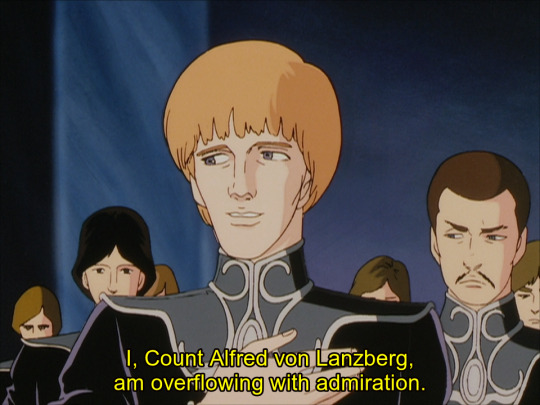
My first impulse is that Ferner needs to calm the fuck down for two seconds, but on the other hand, I guess I’m glad he has an acceptable outlet for his weird urges?

Besides war, drinking, and going on dates with Reuental (which usually involve drinking), Mittermeyer’s favorite hobby is roasting Bayerlein. Seriously every time Bayerlein tries to get in Mittermeyer’s good graces in some way, Mittermeyer shuts him down spectacularly. It’s incredible. I don’t know what Mittermeyer’s problem is but I’m not complaining, I mean look at that side-eye/eyeroll hybrid!

Mittermeyer is so good at war that he gave this guy an ulcer that almost killed him. Sure, I buy it.
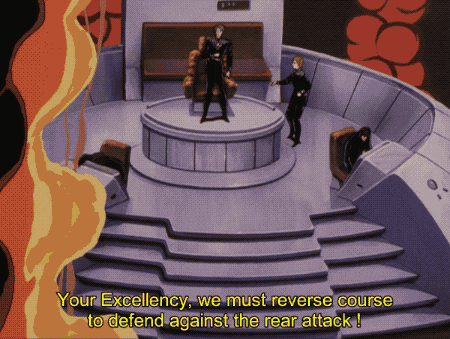
I’ve gotten a lot of mileage out of this gif, so now I offer it to you, humble reader. Go forth and use it well.
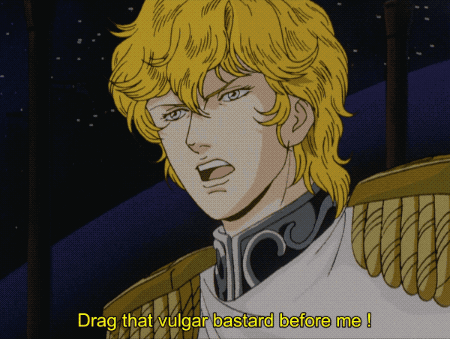
#Legend of Galactic Heroes#Legend of the Galactic Heroes#author: Elizabeth#Reuental#Mittermeyer#Empire#body language#redraws#Reuental deserves better#Oskar Meyer#that's the proper R/M pairing name#long-suffering Bayerlein
26 notes
·
View notes